This is our look at President Trump’s administration and the rest of Washington:
- Trump’s Supreme Court pick is Neil Gorsuch
- Homeland Security secretary says countries on banned list “may not be taken off anytime soon”
- Acting attorney general fired by Trump
- Trump orders agencies to cut back on regulations
- White House clarifies how new immigration policy affects green-card holders
- Share via
Protests continue around the country
The hashtag #ResistTrumpTuesdays trended Tuesday, as protests against President Trump’s immigration policies and Cabinet nominees continued around the country. Protests took place in Brooklyn; Kansas City, Mo.; Miami; Minneapolis; New Brunswick, N.J.; Tucson; and Worcester, Mass., as well as outside of lawmakers’ offices in Washington, D.C.
In Brooklyn, thousands of protesters marched to the apartment building of U.S. Sen. Chuck Schumer (D-N.Y.) to demand that he reject President Trump’s Cabinet picks.
In Minneapolis, protesters gathered to object to Trump’s ban on travelers from Muslim-majority countries.
And in Tucson, a peaceful crowd outside John McCain’s office urged the senator, who had called Trump’s refugee ban a “self-inflicted wound in the fight against terrorism,” to take action against the executive order.
- Share via
Neil Gorsuch could fall somewhere between his hero, Justice Scalia, and former boss, centrist Justice Kennedy
Judge Neil M. Gorsuch was resting midway down a Colorado ski slope last year when his cellphone rang with the news that Supreme Court Justice Antonin Scalia had died.
“I immediately lost what breath I had left,” Gorsuch recalled in an April speech, “and I am not embarrassed to admit that I couldn’t see the rest of the way down the mountain for the tears.”
Now, as President Trump’s pick to replace Scalia on the high court, Gorsuch is seen by many on the right as a fitting replacement for the iconic jurist that Gorsuch considered a “lion of the law.”
Like Scalia, Gorsuch, 49, who serves on the 10th Circuit Court of Appeals in Denver, is a well-respected conservative who believes judges should decide cases based on the law as it was understood when passed, not on how they think it should be. He’s a clear, impassioned writer, albeit without Scalia’s flare for biting sarcasm.
But Gorsuch also evokes the qualities of Justice Anthony M. Kennedy, for whom Gorsuch worked as a law clerk. (If confirmed, Gorsuch would join three justices who previously clerked on the high court, but he would be the first ever to serve alongside the justice he or she worked for.)
Like Kennedy, 80, Gorsuch is a Westerner with a polite, congenial manner who at times has won praise from liberals. He may be more conservative than Kennedy when it comes to expanding individual rights, but he seems to lack Scalia’s fervor for overturning liberal precedents from decades past.
Which way Gorsuch skews could be pivotal for the future of the court. Conservatives clearly hope he’ll be more like Scalia than Kennedy, a centrist swing vote who has often joined liberals on issues such as gay marriage and abortion. Some conservatives have even expressed hope that Gorsuch’s personal history with Kennedy might enable him to draw the Reagan-appointee back toward the right.
- Share via
Trump chooses Neil Gorsuch, a conservative seen as likely to be confirmed, for Supreme Court
President Trump nominated federal Judge Neil M. Gorsuch on Tuesday to the Supreme Court to fill the seat of the late Antonin Scalia, choosing from his short list an appeals court judge from Denver seen as most likely to win Senate confirmation.
Because Scalia was a stalwart conservative, Trump’s choice is not likely to change the balance of the court. But it does set the stage for a bruising partisan fight over a man who could help determine law on gun rights, immigration, police use of force and transgender rights.
- Share via
Watch: President Trump announces Neil Gorsuch as Supreme Court nominee
- Share via
Trump administration is radicalizing Democratic voters, creating a challenge for the party, Rep. Adam Schiff says
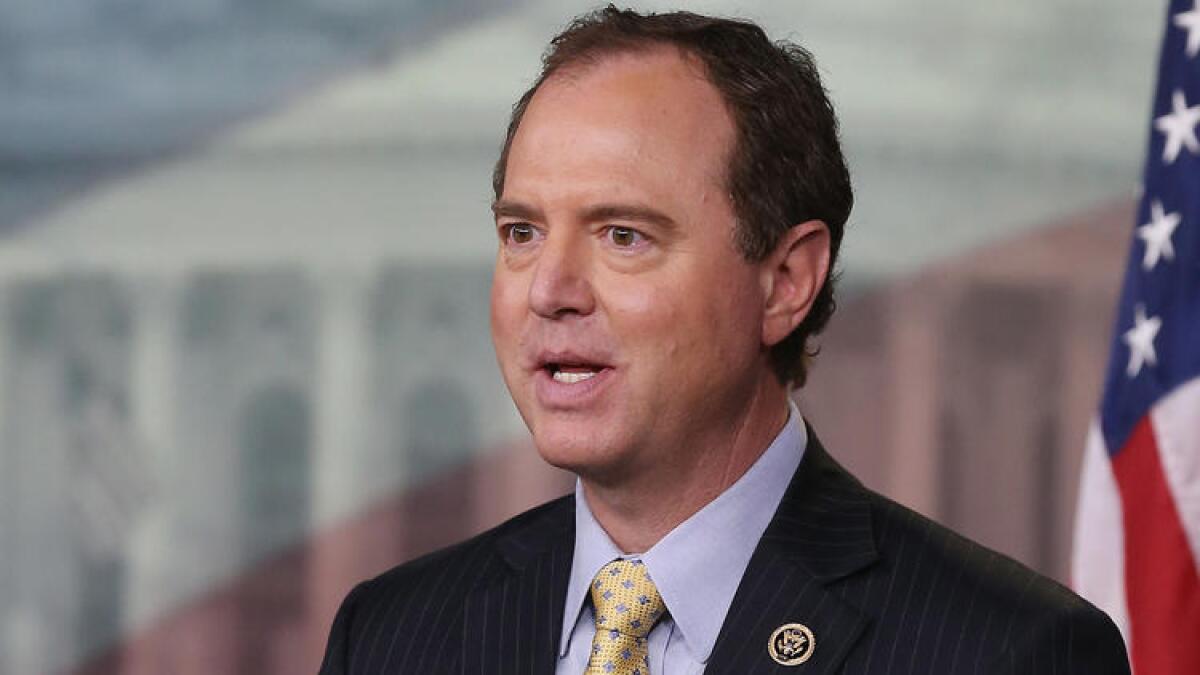
As protests spread over policy announcements from the Trump administration, Democrats must work to encourage participation in politics, but face a danger of the party becoming too radicalized, Rep. Adam Schiff (D-Burbank) said Tuesday.
“The radical nature of this government is radicalizing Democrats, and that’s going to pose a real challenge to the Democratic Party, which is to draw on the energy and the activism and the passion that is out there, but not let it turn us into what we despised about the tea party,” Schiff said.
During a meeting with reporters and editors in the Los Angeles Times’ Washington bureau, Schiff also discussed his role as the highest-ranking Democrat on the House Select Intelligence Committee under a Trump administration and how Democrats will manage in the minority.
Ever since the election, party leaders have been debating: “Did we lose because we were too far to the left and we had too small a tent, or did we lose because we are too mainstream and didn’t energize the base?” Schiff asked.
“We are obviously having that debate, but there’s a whole new element, which is the reaction to the Trump administration that makes this different in kind, certainly different in intensity, than I think we’ve ever seen after an election,” he said.
“The more radical the administration is, the more radicalized our base becomes, which just feeds the Breitbart crowd, and who knows where that ends.”
Democratic leaders have to channel public reaction to Trump’s actions into progress, rather than deadlock, Schiff said.
Reaction to Democrats seen as working with the Trump administration has been strong. Monday night, for example, protesters marched on Sen. Dianne Feinstein’s home and office voicing fears she would back Alabama Sen. Jeff Sessions for attorney general. The senator from California announced Tuesday that she would oppose Sessions.
Several groups calling themselves “indivisible” have popped up in cities across the country as focal points for efforts to organize.
“We have two of the most capable strategists as the head of our House and Senate Democrats,” Schiff added, referring to House Democratic leader Nancy Pelosi of San Francisco and Senate Democratic leader Sen. Charles E. Schumer of New York.
“If anybody can grapple with this, they can, but it’s going to be a challenging and moving target day to day.”
“I just hope that we can channel that energy in a way where we can provide a check on this administration because I’ve never been more worried about the country’s future than I am right now,” he said.
Schiff said part of his role as the ranking Democrat on the House Select Intelligence Committee will be pushing back when the Trump administration puts out inaccurate information about the intelligence community and its findings.
Trump has repeatedly dismissed or sought to minimize the intelligence community’s findings that Russia sought to intervene in the 2016 election to benefit him. Schiff said he’s concerned about what else the administration might be willing to dismiss.
“I think that will be kind of a new frontier,” he said. “How do we contradict a president making representations about what the intelligence community has to say when the information is classified?”
- Share via
Trump administration signals that some temporary bans on entry into the U.S. could become permanent

Trump’s orders put a greater emphasis on deporting those convicted of crimes and those in the country illegally who were charged with crimes not yet adjudicated
The Trump administration doubled down Tuesday on its commitment to transforming the nation’s border law enforcement, signaling that some of the temporary bans on travelers from seven predominantly Muslim countries are likely to be made permanent and elevating a deportations official to run the top immigration enforcement agency.
Administration officials, led by newly sworn-in Homeland Security Secretary John Kelly, moved to allay the havoc that marked the roll-out of the ban and another on refugees. They briefed reporters and planned to head to Capitol Hill later today in an apparent effort to smooth relations after reports that lawmakers and other stakeholders were left out of the crafting of the executive order on toughened vetting at border entry points.
In a news conference, Kelly and other top Homeland Security officials conceded some problems, including poor communication. But they insisted that all court orders were followed over the weekend, rebutted reports that some legal residents were denied access to attorneys at airports and said they everyone detained by border agents was treated with “dignity and respect.”
“The vast majority of the 1.7 billion Muslims that live on this planet, the vast majority of them have, all other things being equal, have access to the United States,” Kelly told reporters. “And a relatively small number right now are being held up for a period of time until we can take a look at what their procedures are,” he said, seeming to acknowledge that mostly Muslims have been affected by the ban.
The moves signaled that the White House remained committed to remaking border law enforcement even in the face of widespread confusion and condemnation of President Trump’s order.
Kelly said for the first time that the some of the restrictions that caused confusion and sparked protests over the weekend could be extended well into the future.
“Some of those countries that are currently on the list may not be taken off the list anytime soon,” he said.
Trump also named a longtime deportation officer, Thomas D. Homan, as acting director of U.S. Immigration and Customs Enforcement
Homan, who will oversee the execution of Trump’s immigration enforcement order, was most recently in charge of the agency’s 5,000 deportation officers, a force Trump said he would triple to 15,000.
Trump’s orders put a greater emphasis on deporting not only those convicted of crimes, but also people in the country illegally who were charged with crimes not yet adjudicated, those who receive an improper welfare benefit and even those who have not been charged but are believed to have committed “acts that constitute a chargeable criminal offense.”
- Share via
White House tries to ban the word ‘ban,’ hours after president uses it himself
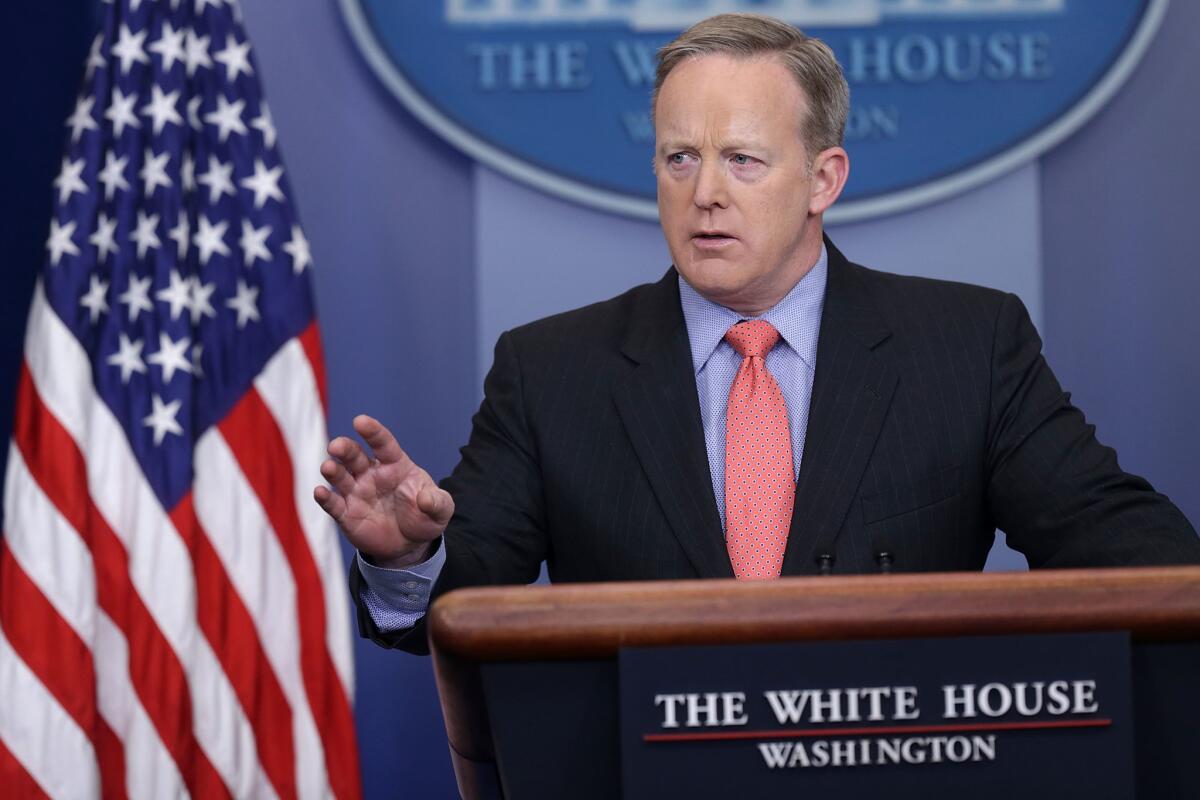
President Trump used the word “ban” in a tweet as recently as Monday to describe his new executive order suspending travel from seven Muslim-majority countries and halting the refugee program for several months.
But facing backlash from many directions, the White House adamantly insisted Tuesday that the word is verboten.
“This is not a ban,” White House Press Secretary Sean Spicer told reporters in a fiery news briefing.
“When we use words like ‘travel ban,’” he said later, “that misrepresents what it is. It’s seven countries previously identified by the Obama administration, where, frankly, we don’t get the information that we need for people coming into this country.”
In fact, people from the seven banned countries — Iraq, Iran, Syria, Yemen, Sudan, Somalia, Libya — cannot enter the United States under the order. Spicer appeared to be making a renewed effort to distinguish the order from the all-out ban on Muslims entering the country that Trump proposed during the campaign.
Many around the world see the newest policy as an outgrowth of that proposal.
Trump himself conceded a religious connection when he said in an interview on Friday that he wanted to make it easier for Syrian Christians to enter the country. And former New York Mayor Rudy Giuliani told Fox News that the order sprang from a group he formed at Trump’s request to create a legal framework that would accomplish the campaign goal of a “Muslim ban.”
But amid confusion and worldwide criticism in recent days, the Trump administration has tried to temper some of the more incendiary rhetoric around the proposal.
Even the words “extreme vetting,” a favorite Trump slogan, were called into question by Spicer on Tuesday.
“Calling for tougher vetting [of] individual travelers from seven nations is not extreme,” he said. “It is reasonable and necessary to protect our country.”
But changing the ban branding around the program at this point will be difficult. Here’s Trump’s tweet from Monday:
And Spicer himself used the term ban as recently as Sunday:
- Share via
Senate confirms Elaine Chao as secretary of Transportation
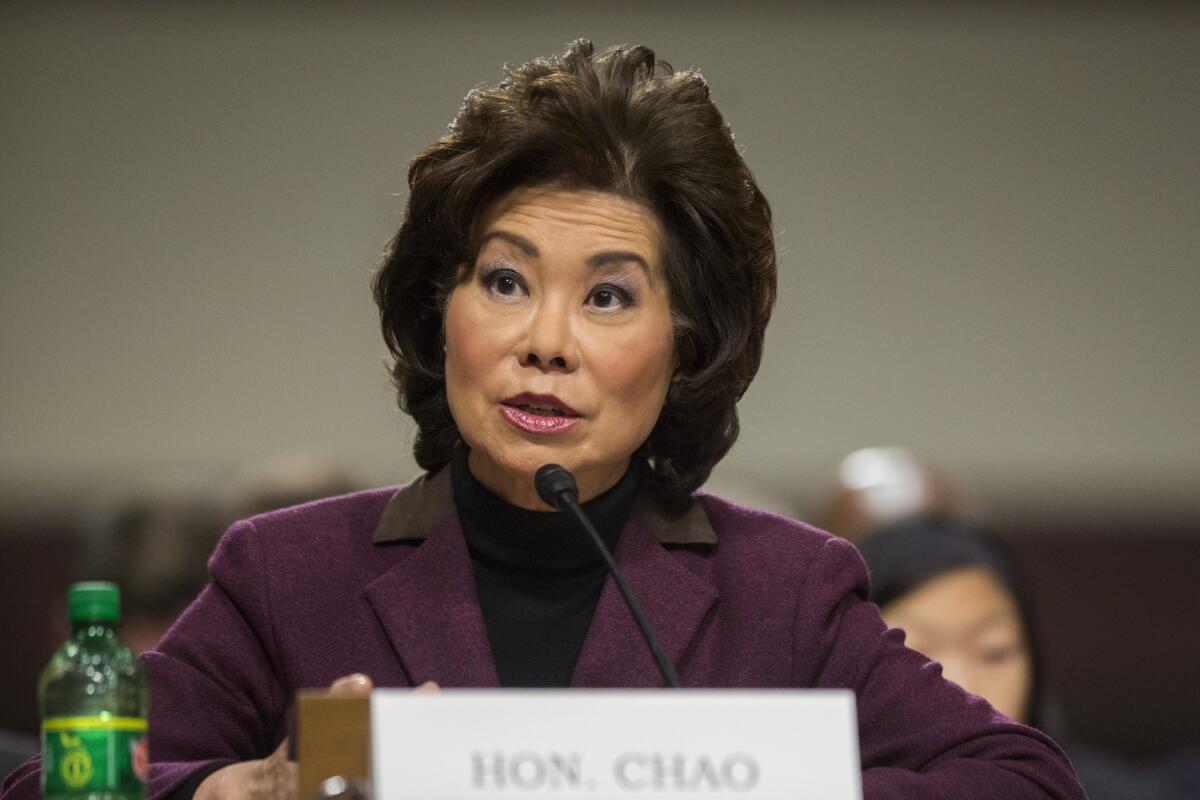
The Senate has confirmed Elaine Chao to serve as Transportation secretary in the Trump administration. The vote was 93 to 6 on Tuesday.
Chao is an experienced Washington hand. She was Labor secretary under President George W. Bush and is the wife of Senate Majority Leader Mitch McConnell.
Chao would be a lead actor in pursuing Trump’s promise to invest $1 trillion to improve highways, rail service and other infrastructure projects.
- Share via
Speaker Paul Ryan defends Trump’s immigrant and refugee ban, as Congress grumbles about being left out
House Speaker Paul D. Ryan on Tuesday stood by President Trump’s temporary ban on refugees and citizens from seven Muslim-majority nations and indicated that he was confident the administration could fix the “confusing” rollout without action from Congress.
“What is happening is something we support,” said Ryan, whose office was the target of a sit-in by protesters opposed to Trump’s order. “We need to pause and we need to make sure that the vetting standards are up to snuff so we can guarantee the safety and security of our country.”
Congress was blindsided by Trump’s executive action -- Ryan learned about it as the public did when the White House announced it Friday afternoon. Many GOP lawmakers have raised concerns.
During a private meeting in the Capitol basement Tuesday, Republican lawmakers were counseled on how to handle protesters and office sit-ins happening across the country.
“It’s regrettable that there was some confusion on the rollout of this,” Ryan said. “No one wanted to see people with green cards or special immigrant visas, like translators, get caught up in all of this.”
Ryan also said he was concerned the ban could be used as propaganda by terrorist groups.
“The rhetoric surrounding this could be used as a recruiting tool, and I think that’s dangerous,” he said.
Still, Republicans leaders as well as rank-and-file GOP lawmakers largely agreed with the president’s move to halt refugee admissions for 120 days, and to temporarily ban citizens from seven predominantly Muslim countries, unless they are Christians or other religious minorities.
“The president was well within his right to issue an executive order,” said Rep. Pete Sessions (R-Texas), chairman of the House Rules Committee.
“Do I feel let out? I feel like everybody was left out,” he said. “I wish they communicated it. I wish they had gotten more information to people. I wish they had measured three times and sawed once.”
Lawmakers have shown little appetite for Congress to get involved, and suggested the chaos that erupted at airports over the weekend was just part of a learning curve at the White House.
“I support the thrust of the executive order,” said Rep. Pete King (R-N.Y.), who nevertheless said the administration should have been better prepared and will need to “get your act together.”
Last year, Ryan had strongly condemned Trump’s campaign-trail call for a Muslim ban.
In recent days, Ryan, like other congressional leaders, was forced to dial up the administration with his questions and concerns about the order, conferring Monday with Homeland Security Secretary John Kelly.
“I am very pleased and confident that he is, on a going-forward basis, going to make sure that things are done correctly,” Ryan said.
Pressed on whether Congress would have a role, Ryan did not indicate any immediate legislative action.
- Share via
Democrats boycott Senate committee votes on Price, Mnuchin
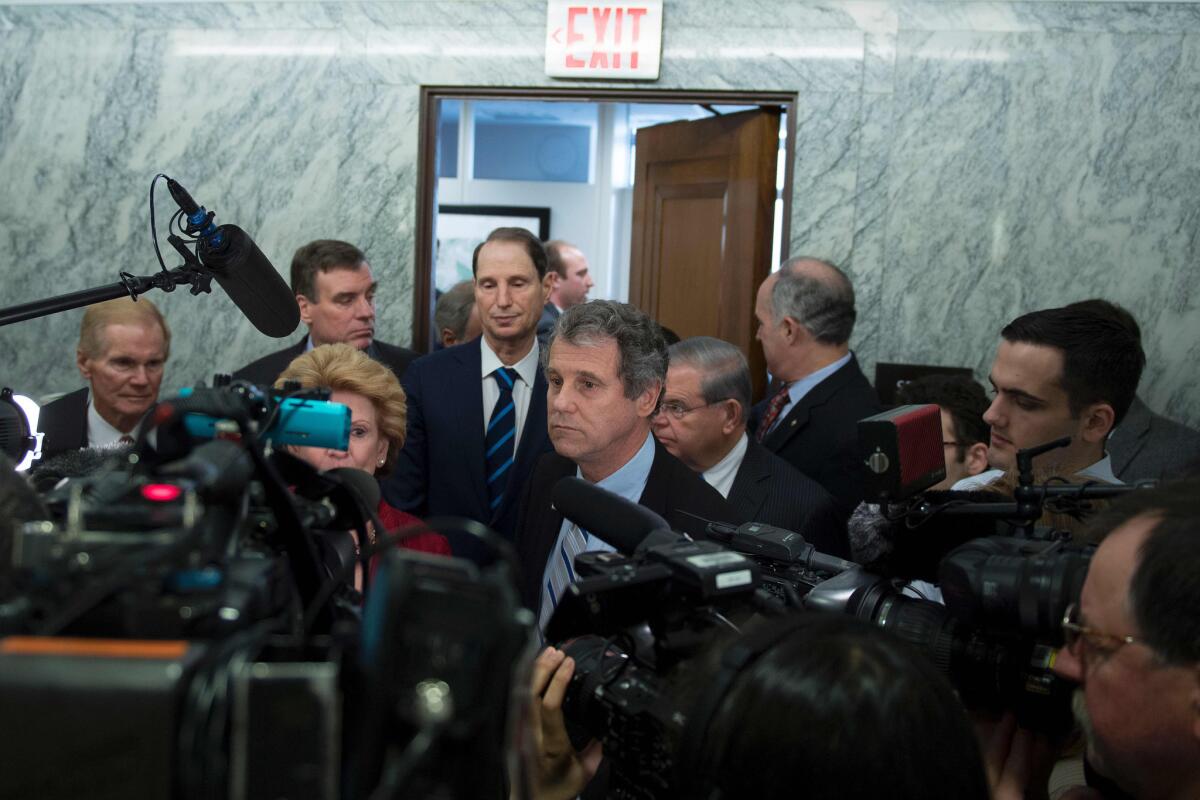
Senate Democrats on Tuesday boycotted a committee vote on two of President Trump’s top Cabinet nominees -- Tom Price to lead Health and Human Services and Steve Mnuchin to be Treasury secretary.
Finance Committee Chairman Orrin Hatch (R-Utah) blasted the Democratic move as he sat in a hearing room with only Republicans on the dais.
“They ought to be embarrassed. It’s the most pathetic treatment I’ve seen in my 40 years in the United States Senate,” Hatch said.
“I think they should stop posturing and acting like idiots,” he said.
At least one Democrat needs to be present for the committee to vote on the nominations, Hatch said. He recessed the hearing until further notice, saying he hoped a vote could take place later Tuesday.
But asked mid-afternoon if he thought the committee would be able to meet Tuesday, Hatch said it “doesn’t look like it.”
Sen. Ron Wyden (D-Ore.), the committee’s top Democrat, said Price and Mnuchin “have misled the public and held back important information about their backgrounds.”
“Until questions are answered, Democrats believe the committee should not move forward with either nomination,” Wyden said.
“This is about getting answers to questions, plain and simple,” he said. “Ethics laws are not optional, and nominees do not have a right to treat disclosure like a shell game.”
Liberal groups cheered the boycott while Senate Republican leaders decried it as Democratic obstructionism.
“They are manufacturing issues on a daily basis to drag this process out,” Senate Majority Leader Mitch McConnell (R-Kent.) said of the confirmations of Trump’s nominees.
“I don’t see how they can explain to the American people how it is appropriate to prevent the administration from getting up and getting started,” he said.
Democrats have said Mnuchin, a wealthy Wall Street executive, misled the committee in his response to a written question about foreclosures at Pasadena’s OneWest Bank while he ran it from 2009-15.
Democrats pointed to a report Sunday by the Columbus Dispatch that Mnuchin denied that OneWest engaged in so-called robo-signing of mortgage documents.
The paper said its analysis of nearly four dozen foreclosure cases in Ohio’s Franklin County in 2010 showed that the bank “frequently used robo-signers.”
The Columbus Dispatch cited a foreclosure involving a mortgage signed by Erica Johnson-Seck, a OneWest vice president who said in a deposition in a 2009 Florida case that she signed an average of 750 documents a week.
Barney Keller, a spokesman for Mnuchin, said Monday that several courts had dismissed cases involving allegations of robo-signing by Johnson-Seck.
“The media is picking on a hardworking bank employee whose reputation has been maligned but whose work has been upheld by numerous courts all around the country in the face of scurrilous and false allegations,” Keller said.
Democrats also have problems with Price, a six-term congressman and former orthopedic surgeon who has distinguished himself in conservative circles for his staunch opposition to the Affordable Care Act and his plans to slash federal healthcare spending.
His nomination has become among Trump’s most controversial, in part because of his hostility to government safety net programs, including Medicaid and Medicare.
Democrats have also been increasingly critical of Price’s extensive trading in healthcare stocks while he has been in Congress, and in some cases while he has pushed legislation that would benefit his portfolio.
Price has denied any wrongdoing.
Also drawing criticism is Price’s purchase of discounted shares in an Australian biotech firm, Innate Immunotherapeutics, which he was offered through a private deal not available to general shareholders.
Price also denied that this was improper, and Senate Republicans have rallied to his side, saying he did not violate any ethics rules.
Sen. Sherrod Brown (D-Ohio) said he and the other Democrats on the committee want Mnuchin and Price to explain their “lies” either in person before the committee or in new written answers.
“I want them to disclose this information that they seem not to want to disclose,” Brown said.
12:10 p.m.: This post was updated with additional comments from Hatch as well as from Senate Majority Leader Mitch McConnell and Sen. Sherrod Brown.
8:00 a.m.: This post has been updated with additional information and background.
8:07 a.m.: This post has been updated with additional information.
- Share via
White House aides who wrote Trump’s travel ban see it as just the start
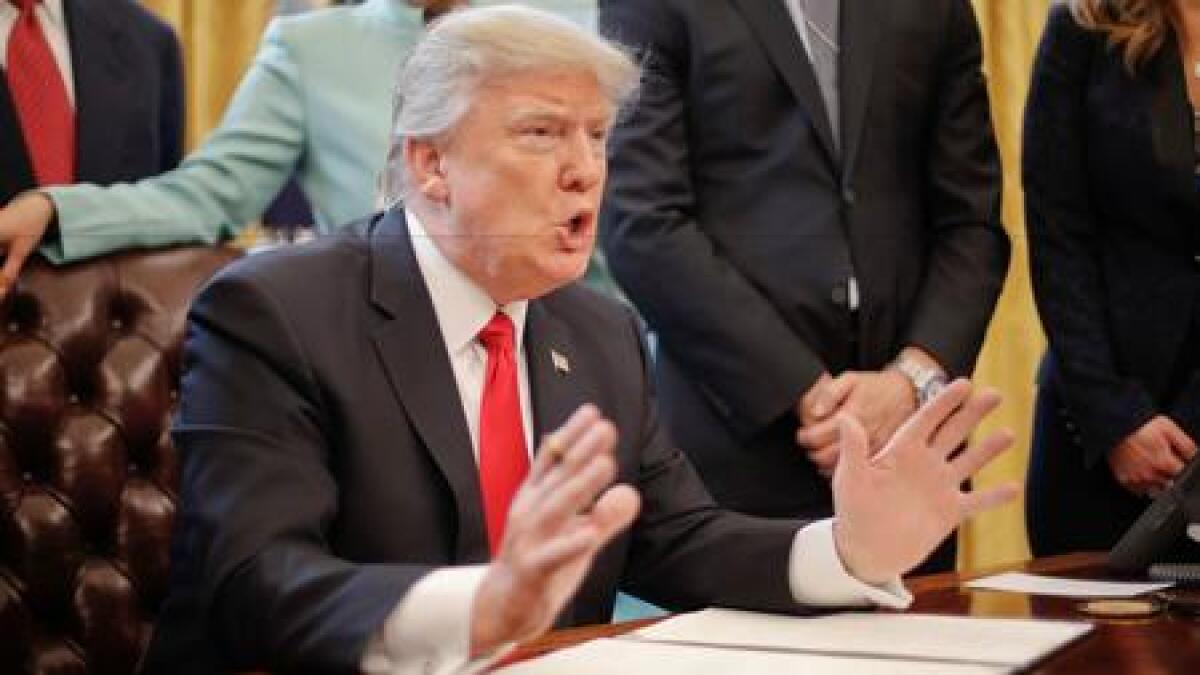
Even as confusion, internal dissent and widespread condemnation greeted President Trump’s travel ban and crackdown on refugees this weekend, senior White House aides say they are only getting started.
Trump and his aides justified Friday’s executive order, which blocked travel from seven majority-Muslim countries for 90 days and halted refugees from around the world for 120, on security grounds — an issue that they say they take seriously. But their ultimate goal is far broader.
Trump’s top advisors on immigration, including chief strategist Steve Bannon and senior advisor Stephen Miller, see themselves as launching a radical experiment to fundamentally transform how the U.S. decides who is allowed into the country and to block a generation of people who, in their view, won’t assimilate into American society.
That project may live or die in the next three months, as the Trump administration reviews whether and how to expand the visa ban and alter vetting procedures. White House aides are considering new, onerous security checks that could effectively limit travel into the U.S. by people from majority-Muslim countries to a trickle.
- Share via
Why corporations can’t risk keeping silent about Trump’s immigration ban
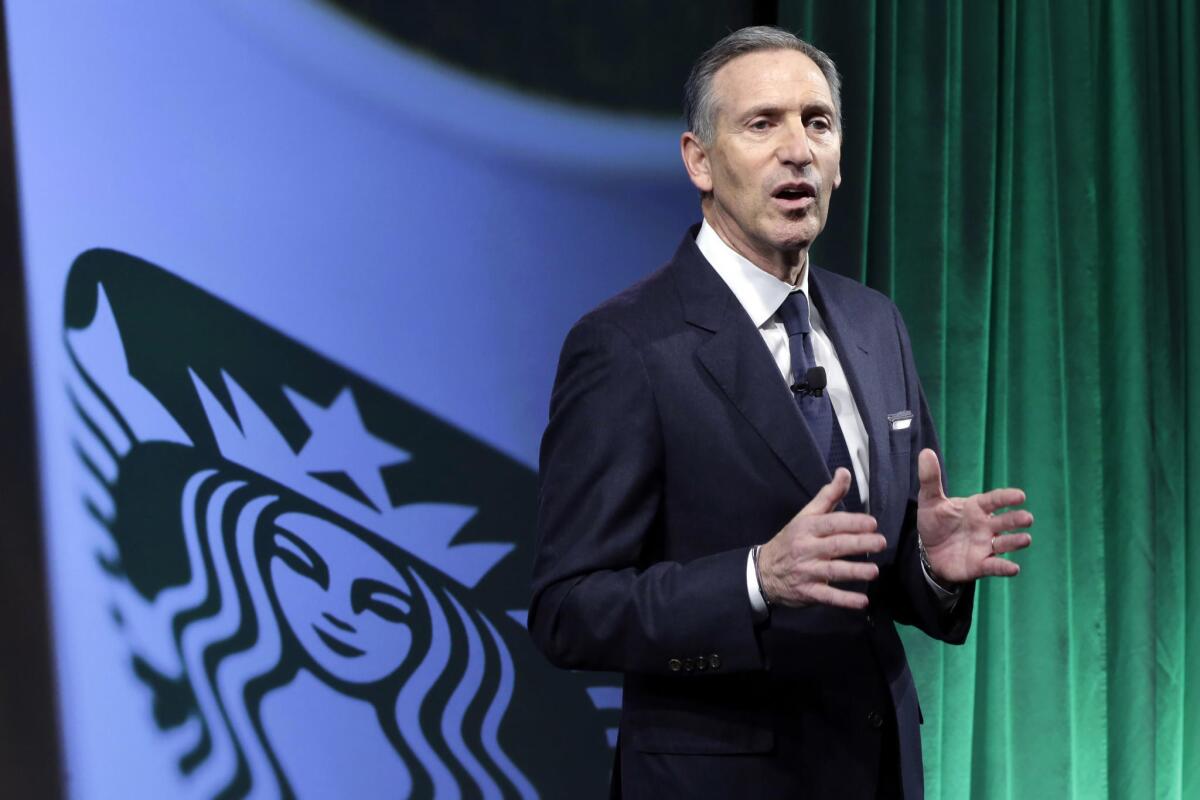
Corporate America generally prefers to stay quiet about partisan politics. Pick one side of a hot-button issue, the thinking goes, and you’ll risk losing customers on the other side.
But like so many norms before it, President Trump has turned this one on its head.
A growing number of companies are deciding it’s a bigger risk to their investors and bottom line to stay quiet than it is to protest Trump’s ban on refugees and travel from seven Muslim-majority nations, betting vocal opposition to the executive order scores them a moral and fiscal victory.
While it was possible for companies to take a wait-and-see approach leading up to Trump’s inauguration, many firms can no longer ignore the White House’s policy given the effect the order is already having on employees either stranded or fearful of traveling.
Only a week ago it seemed foolish to speak out against a president who has admonished individual companies on social media such as Carrier, Boeing and General Motors. Now the pendulum has swung the other way. Companies, mostly in technology but increasingly in other sectors, have decided that it’s not enough just to speak out against the immigration order. They believe that they must also take headline-grabbing action.
- Share via
Op-Ed: Trump is taking the Bannon Way, and it will end in disaster
Bannon has said he’s a ‘Leninist’ but he’s really more of a Trotskyist because he fancies himself the leader of an international populist-nationalist right wing movement, exporting anti-’globalist’ revolution. In that role, his status as an enabler of Trump’s instinct to shoot — or tweet — from the hip seems especially ominous. The Bannon way might work on the campaign trail, but it doesn’t translate into good governance. It’s possible — and one must hope — that Trump can learn this fact on the job. But what if he doesn’t? He could put the country in serious peril.
— Jonah Goldberg
- Share via
Trump will leave LGBTQ protections in place
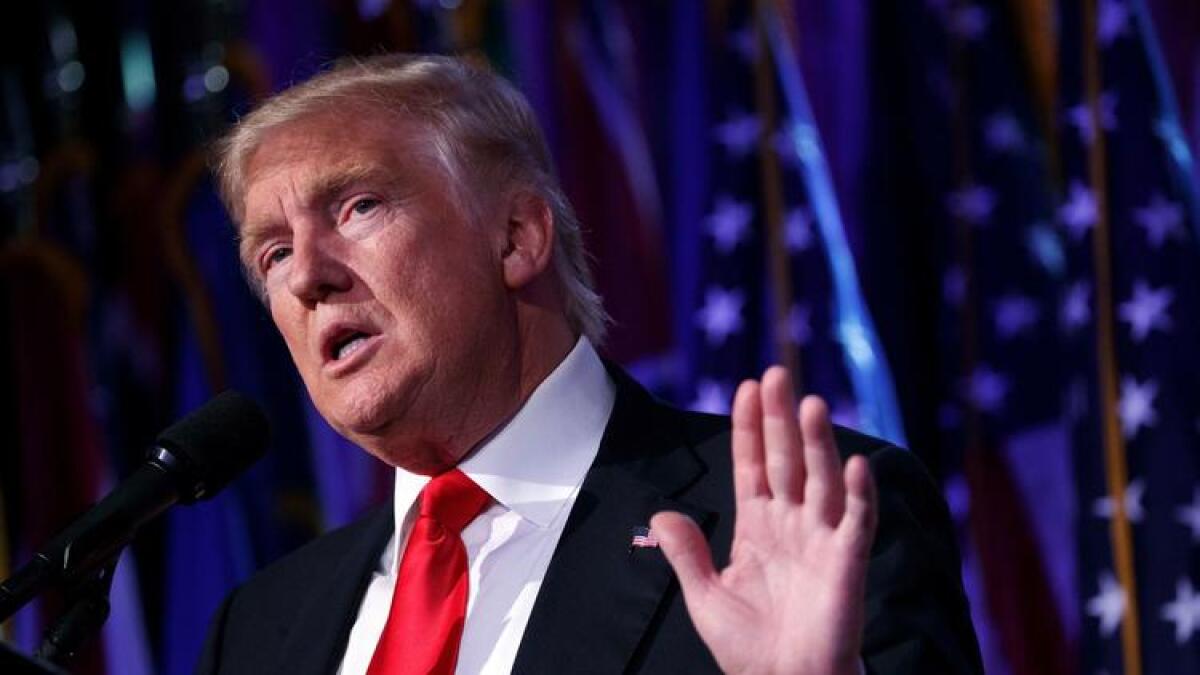
The White House says President Trump will leave intact a 2014 executive order that protects federal workers from anti-LGBTQ discrimination.
In a statement released early Tuesday, the White House said Trump “is determined to protect the rights of all Americans, including the LGBTQ community” and that he “continues to be respectful and supportive of LGBTQ rights, just as he was throughout the election.”
The Trump administration has vowed to roll back much of President Obama’s work from the last eight years and had been scrutinizing the 2014 order. The directive protects people from LGBTQ discrimination while working for federal contractors.
The recent statement says the protections will remain intact “at the direction” of Trump.
Here is the text of Obama’s executive order, signed on July 21, 2014:
By the authority vested in me as President by the Constitution and the laws of the United States of America, including 40 U.S.C. 121, and in order to provide for a uniform policy for the Federal Government to prohibit discrimination and take further steps to promote economy and efficiency in Federal Government procurement by prohibiting discrimination based on sexual orientation and gender identity, it is hereby ordered as follows:
Section 1. Amending Executive Order 11478. The first sentence of section 1 of Executive Order 11478 of August 8, 1969, as amended, is revised by substituting “sexual orientation, gender identity” for “sexual orientation”.
Sec. 2. Amending Executive Order 11246. Executive Order 11246 of September 24, 1965, as amended, is hereby further amended as follows:
(a) The first sentence of numbered paragraph (1) of section 202 is revised by substituting “sex, sexual orientation, gender identity, or national origin” for “sex, or national origin”.
(b) The second sentence of numbered paragraph (1) of section 202 is revised by substituting “sex, sexual orientation, gender identity, or national origin” for “sex or national origin”.
(c) Numbered paragraph (2) of section 202 is revised by substituting “sex, sexual orientation, gender identity, or national origin” for “sex or national origin”.
(d) Paragraph (d) of section 203 is revised by substituting “sex, sexual orientation, gender identity, or national origin” for “sex or national origin”.
Sec. 3. Regulations. Within 90 days of the date of this order, the Secretary of Labor shall prepare regulations to implement the requirements of section 2 of this order.
Sec. 4. General Provisions. (a) Nothing in this order shall be construed to impair or otherwise affect:
(i) the authority granted by law to an agency or the head thereof; or
(ii) the functions of the Director of the Office of Management and Budget relating to budgetary, administrative, or legislative proposals.
(b) This order is not intended to, and does not, create any right or benefit, substantive or procedural, enforceable at law or in equity by any party against the United States, its departments, agencies, or entities, its officers, employees, or agents, or any other person.Sec. 5. Effective Date. This order shall become effective immediately, and section 2 of this order shall apply to contracts entered into on or after the effective date of the rules promulgated by the Department of Labor under section 3 of this order.
Update
6:45 a.m.: This article was updated with the text of the 2014 executive order.
- Share via
Trump aims for Democrats after firing acting attorney general
- Share via
Why people are calling the acting attorney general’s firing the ‘Monday Night Massacre’
On Monday evening, the White House released a statement saying acting Atty. Gen. Sally Yates had been fired for instructing Justice Department lawyers not to defend President Trump’s travel ban.
Yates has “betrayed the Department of Justice by refusing to enforce a legal order designed to protect the citizens of the United States,” the White House said.
“Monday Night Massacre” was trending on Twitter within the hour.
In 1973, President Nixon ordered the firing of special prosecutor Archibald Cox because he wouldn’t obey Nixon’s order to stop looking into Watergate. Two of the Justice Department’s top leaders resigned in protest rather than following Nixon’s directive to fire Cox. It became known as the “Saturday Night Massacre,” an instance of the president using his power to punish political enemies within the Justice Department.
Though the Justice Department is part of the executive branch, it is traditionally largely independent from the office of the president in order to ensure the integrity of law enforcement and its investigations.

Read more: An illustrated guide to the key figures in Nixon’s ‘Saturday Night Massacre’
- Share via
Trump fires Justice Department’s top official after she refuses to defend his refugee ban
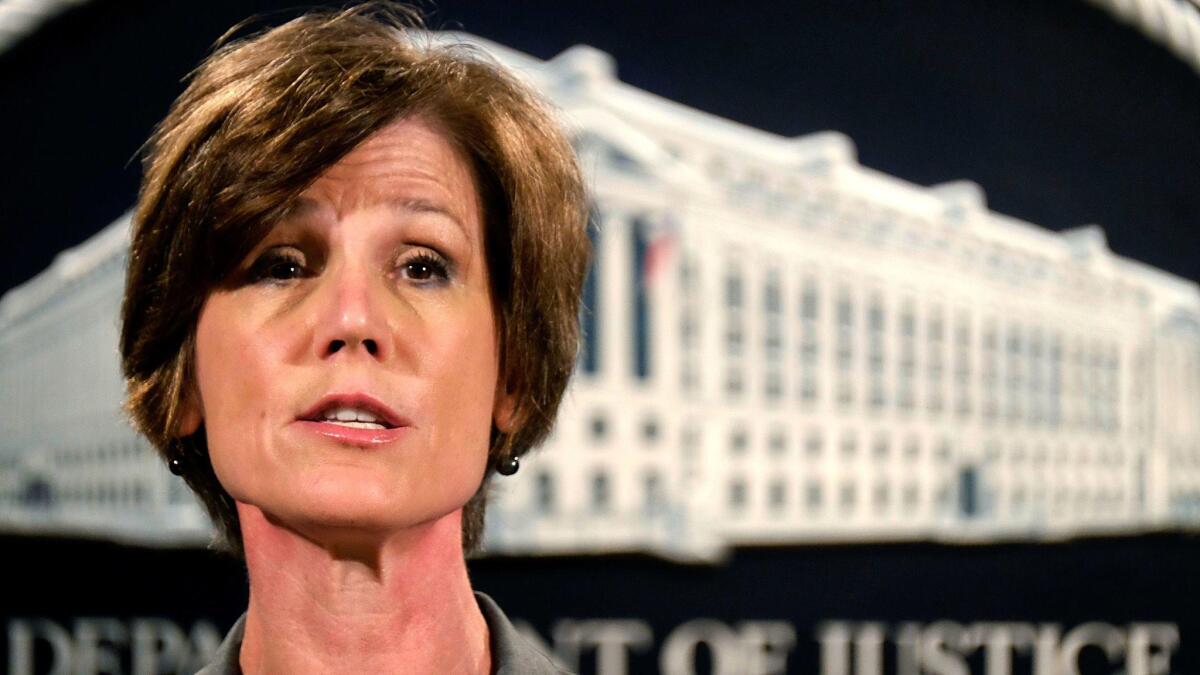
President Trump fired acting Atty. Gen. Sally Yates on Monday, just hours after she announced that the department would not defend his controversial executive order banning refugees and travelers from certain countries.
Yates has “betrayed the Department of Justice by refusing to enforce a legal order designed to protect the citizens of the United States,” the White House said in a statement. “It is time to get serious about protecting our country.”
The move came after Yates sent a letter to Justice Department lawyers saying that she questioned the lawfulness of Trump’s executive order.
“My responsibility is to ensure that the position of the Department of Justice is not only legally defensible, but is informed by our best view of what the law is after consideration of all the facts,” Yates wrote.
“At present, I am not convinced that the defense of the executive order is consistent with these responsibilities, nor am I convinced that the executive order is lawful,” she wrote. “Consequently, for as long as I am the acting attorney general, the Department of Justice will not present arguments in defense of the executive order unless and until I become convinced that it is appropriate to do so.”
Yates was a holdover from the Obama administration. But because Trump’s nominee for attorney general, Sen. Jeff Sessions, has not been confirmed and no other senior Justice Department officials have been appointed, firing her was expected to cause significant problems within the department.
Among other issues, Yates is the only person in the department currently authorized to sign warrants for wiretapping in foreign espionage cases involving the Foreign Intelligence Surveillance Court.
Trump replaced Yates with Dana J. Boente, a three-decade veteran of the Justice Department who was appointed in 2015 by former President Obama as U.S. attorney for the eastern district of Virginia.
6:37 p.m.: The story was updated with Trump’s decision to fire Yates.
- Share via
U.S. service member killed in Yemen identified as Navy SEAL from Illinois
A Navy SEAL from the Virginia-based elite unit known as SEAL Team 6 was killed Sunday during an unusual nighttime raid that put U.S. troops on the ground against Al Qaeda leaders in the middle of war-torn Yemen.
The fallen sailor was identified Monday as Chief Special Warfare Operator William “Ryan” Owens, 36, of Peoria, Ill..
Three other Americans were wounded in the raid and an MV-22 Osprey had to be destroyed after the aircraft suffered a “hard landing” and couldn’t fly. Another U.S. service member was injured in that crash.
The raid marked the first known counter-terrorism operation and first confirmed combat fatality under President Trump.
Steele writes for the San Diego Union-Tribune.
- Share via
Protests against Trump’s ban on certain immigrants continue across the country
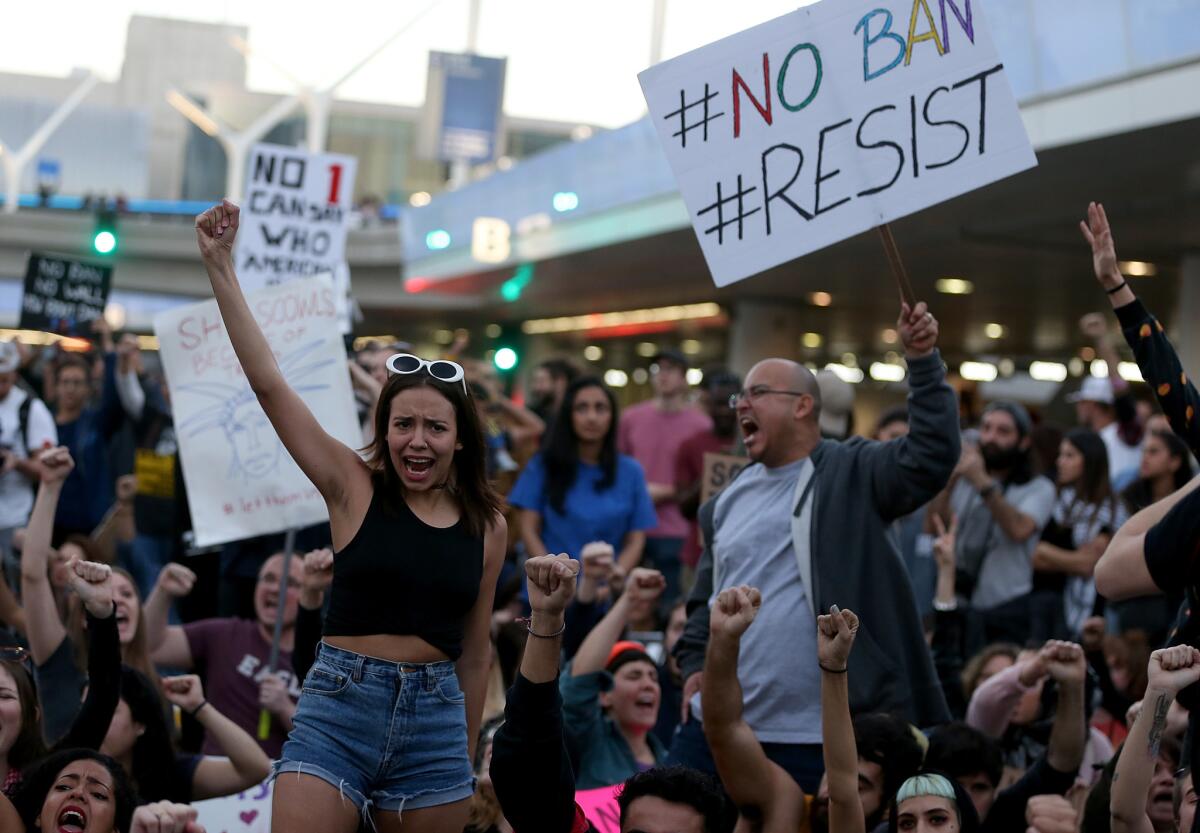
After a weekend of turmoil at many of the nation’s airports following President Trump’s executive order to suspend the U.S. refugee program and temporarily prohibit entry to citizens of seven predominantly Muslim nations, federal officials said all people being detained on arrival to the U.S. had been released. But that hasn’t put a stop to demands to lift the travel ban.
Protests continued to be held and organized throughout the country — incluidng in New York, New Orleans, Colorado and Connecticut. According to Ground Game, an online platform for organizing, at least a dozen demonstrations were planned for this week in what the group described as a “fight against Islamophobia and Fascism.”
Calls to rally, demonstrate and protest swept social media platforms, including Twitter and Facebook.
In Louisville, Ky., a rally was planned for Monday evening at the Muhammad Ali Center, in what organizers said would be a gathering “for American values” and “to voice support for our nation and our city, which was founded and is strengthened by immigrants.” In Hattiesburg, Miss., there was call to join “a peaceful vigil in solidarity with refugees, immigrants, and Muslims” on the University of Southern Mississippi campus on Monday evening.
Declaring that “Jersey City stands with our Muslim and immigrant community,” organizers in that New Jersey city called on people to come to a pedestrian mall on Monday to stand “in solidarity and peace as we show our strength in diversity as one of the most diverse cities in the nation.”
Other demonstrations were planned for later in the week in cities nationwide, including Tuesday in Tuscon, where organizers encouraged people to “stand in solidarity with Senator (John) McCain’s strong public statement opposing the executive order banning refugees and Legal Permanent Residents from Muslim countries!”
Similar actions were planned on Tuesday at the South Carolina State House in Columbia and at the Worchester City Hall and Common in Massachusetts, while organizers in San Francisco, under the banner #NoBanNoWallSF, urged residents to join “the resistance against Donald Trump’s racist and exclusionary Executive Orders” on Saturday.
“We will not allow our country to be divided by hate and religious persecution,” read a statement from #NoBanNoWallSF posted on Facebook.
- Share via
Obama carefully weighs in on refugee ban, says he is ‘heartened’ by public response
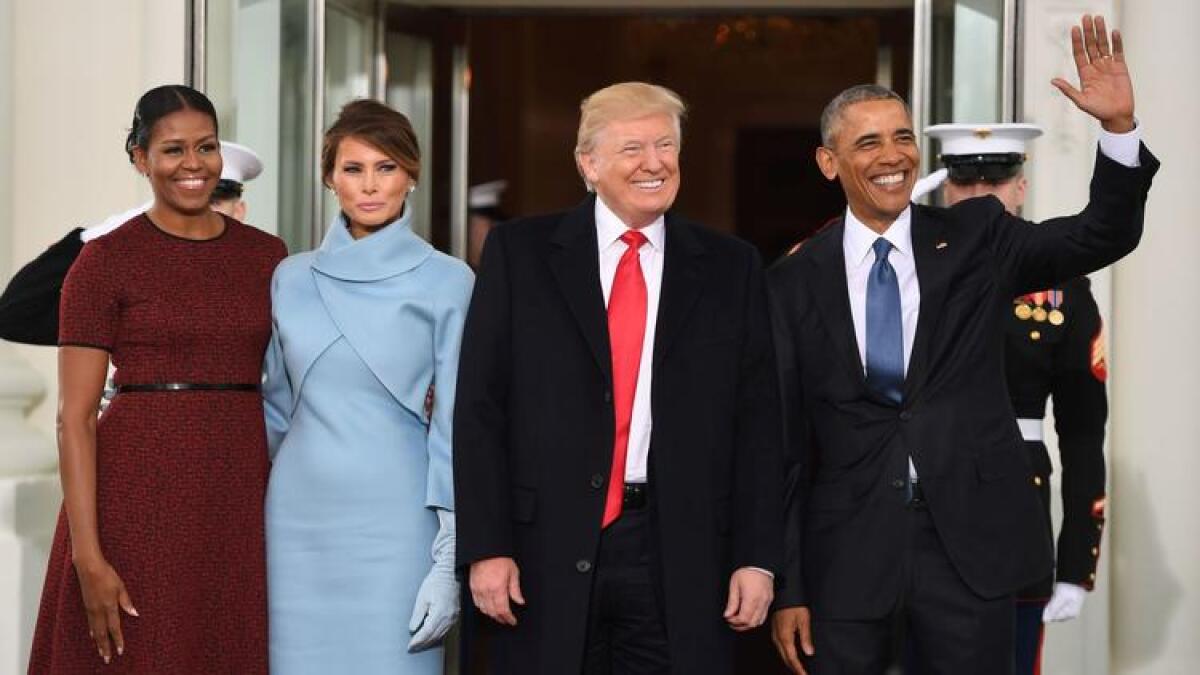
Former President Obama has offered his first public comment on the conduct of his successor, saying through a spokesman that he “is heartened” by public demonstrations against the Trump administration’s controversial move to temporarily ban refugees and block all admissions from seven countries.
“President Obama is heartened by the level of engagement taking place in communities around the country,” Kevin Lewis, a spokesperson for the former president, said in a statement emailed to reporters Monday.
“In his final official speech as President, he spoke about the important role of citizen and how all Americans have a responsibility to be the guardians of our democracy--not just during an election but every day. Citizens exercising their constitutional right to assemble, organize and have their voices heard by their elected officials is exactly what we expect to see when American values are at stake.”
Lewis also said in the statement that Obama “fundamentally disagrees with the notion of discriminating against individuals because of their faith or religion.”
Trump aides deny that his executive order, released Friday, involves religious discrimination. The order temporarily blocked travel to the U.S. by residents of seven predominantly Muslim nations, but left many of the Islamic world’s largest population centers unaffected, they note. The order also included an exception for believers of “minority religions” in those countries, a provision that Trump explicitly said would help Christians.
Obama’s statement is notable less for its content than for the fact that it was issued at all. It reflected the delicate balance he feels he must strike between showing a degree of deference to the new president and speaking out on issues he sees as critically important.
The statement tiptoed around the content of the order, focusing more on the former president’s interest in citizen engagement.
Obama said before leaving office that he expected to choose carefully when to comment on the actions of his successor and would focus less on “normal functioning of politics” and more on “certain issues or certain moments where I think our core values may be at stake,” as he put it in his final news conference.
Monday’s statement did point, though, to comments Obama made at a news conference in November 2015, when he called the idea of a religious test for immigration policy “shameful” and “not American.”
“We don’t have religious tests to our compassion,” he said at the time.
- Share via
GOP-led Congress worries about its role in the Trump era
It’s what congressional Republicans had long dreamed about: a majority in both chambers to advance conservative policies and a president from the same party to sign them into law.
But the Trump White House isn’t turning out exactly the way they envisioned.
The GOP establishment is experiencing whiplash after a week of President Trump bulldozing through the norms of policy and protocol — dashing off executive orders without warning, escalating a diplomatic crisis with the country’s closest southern neighbor, triggering global confusion with a new refugee policy and generally hijacking party leaders’ agenda and replacing it with his own.
Rather than the hoped-for collaborative new relationship between the White House and Congress, GOP officials complain that Trump is brushing aside their advice, failing to fully engage on drafting tough legislative packages like tax reform and Obamacare, and bypassing Congress by relying on executive actions, something they frequently complained about under President Obama.
At the same time, Trump’s unilateral moves continue to blindside Republicans and direct the national focus toward topics many in the party would rather avoid, whether that’s how to pay for building the border wall with Mexico, warming ties with Russia, investigating false claims about voter fraud or, most recently, implementing sweeping new policies on refugees and visas.
In the name of party unity, many Republicans so far have refrained from publicly attacking the new president. But for some, the new refugee policy crossed the line, signaling the first major rift in their already fraught partnership.
- Share via
Washington state sues Trump over immigration order
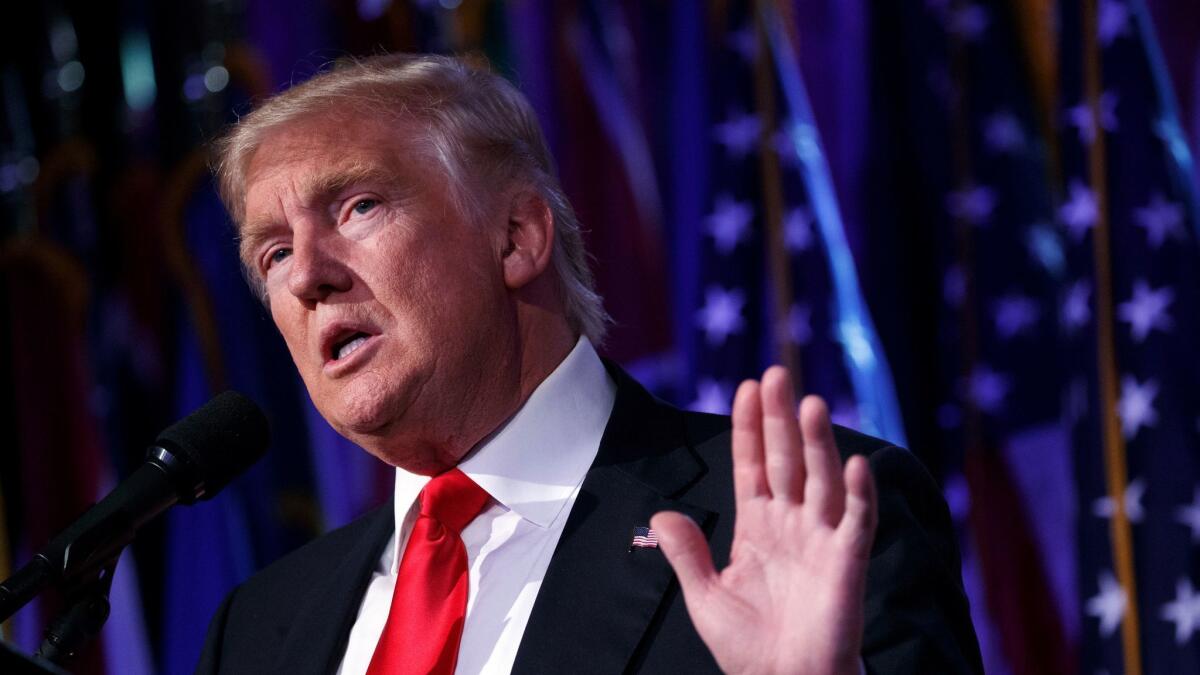
Opening a new legal front, lawyers for the state of Washington filed suit Monday seeking to block President Trump’s executive order temporarily banning foreign refugees from entering the United States.
“No one is above the law, not even the president,” Atty. Gen. Bob Ferguson said in announcing the federal lawsuit. “And in the courtroom, it is not the loudest voice that prevails. It’s the Constitution.”
Over the weekend, a federal judge in Brooklyn issued an order curtailing portions of Trump’s executive order, issued Friday, which temporary halts migration from seven predominantly Muslim countries for at least 90 days and also closed the nation to refugees for at least the next four months. Other challenges are pending.
The lawsuit filed in federal court in Seattle was the first taken by a state attorney general, and its provenance was no surprise. Washington state and others along the West Coast voted overwhelmingly for Democrat Hillary Clinton in November and have emerged as a hotbed of anti-Trump sentiment.
“We will not yield,” said Democratic Washington Gov. Jay Inslee, who joined Ferguson at a Seattle news conference. “We will not be leveraged. We will not be threatened. We will not be intimidated. We will not be bullied by this.”
Trump’s order, which has sparked demonstrations across the country, brought an outpouring of objection from Insley’s Democratic colleagues around the country.
“President Trump’s recent executive orders that divide and discriminate do not reflect the values enshrined in the U.S. Constitution or the principles we stand for as Oregonians,” said Gov. Kate Brown.
“A single executive order… does not define who we are as a country,” said Connecticut Gov. Daniel P. Malloy. “We are a nation of immigrants and must continue to fight for the tired, the poor, and the huddled masses yearning to breath free.”
In Massachusetts, another state that voted overwhelmingly for Clinton, Republican Gov. Charlie Baker joined the chorus of Democratic criticism, saying the travel ban would undermine the international relations forged by the state’s business, academic and healthcare communities.
“The confusion for families is real. The unexpected disruption for law-abiding people is real,” Baker said. “…Thankfully, the federal courts will have an opportunity to straighten this out and it is my hope they do so, and do so quickly.”
- Share via
How a top conservative radio host took on Trump, lost his audience and faith, but gained a new perspective
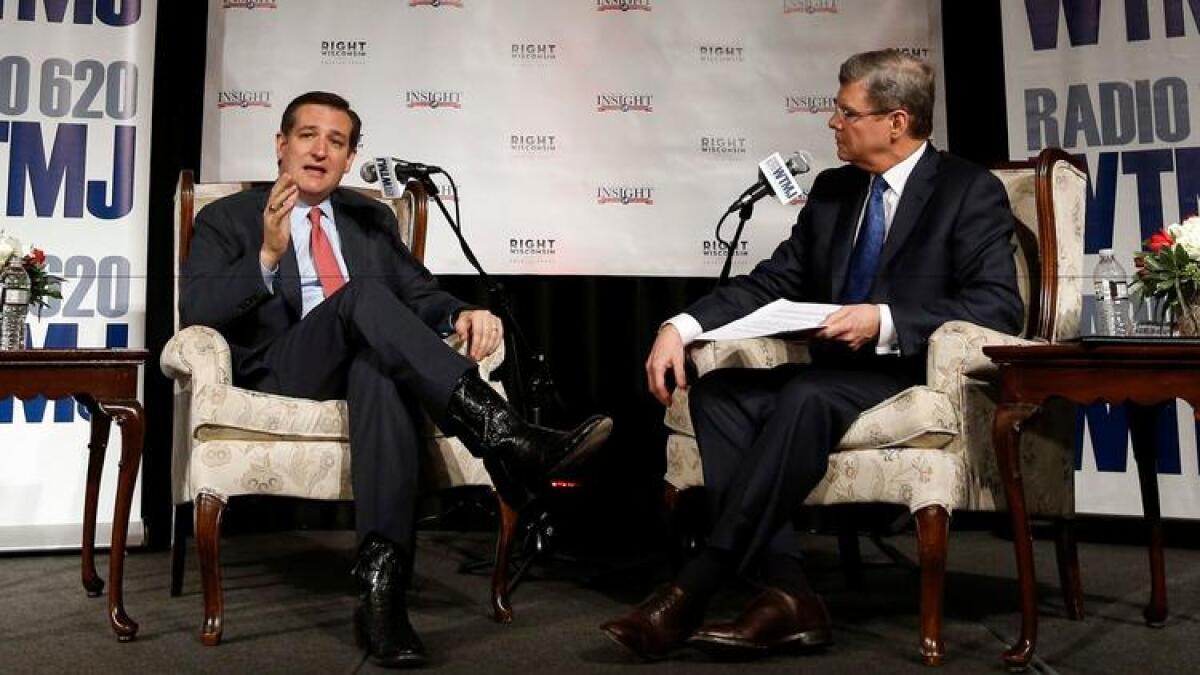
For nearly 25 years, Charlie Sykes was one of the most powerful and influential voices in Wisconsin.
He cheer-led policies that turned this historically progressive state into a model of conservative governance. He made and destroyed political careers, using his perch on Milwaukee talk radio to help vault figures such as House Speaker Paul Ryan and Gov. Scott Walker to national prominence.
But for the moment Sykes was speechless. He sank into the brown leather banquette of a suburban steakhouse. He stammered. He sighed.
“When you’ve devoted your whole life to certain beliefs and you think now they have been undermined and that you might have been deluded about things,” he began. “So. So. Um...”
In 2016 Sykes emerged as one of Donald Trump’s most prominent critics, a stance that outraged listeners, strained longstanding friendships and left him questioning much of what he once held true.
- Share via
Pentagon compiling a list of Iraqis who aided the U.S. military and wants them shielded from Trump’s travel ban
The Pentagon is compiling a list of Iraqi citizens who have worked with the U.S. military and is recommending that they be exempt from President Trump’s temporary ban on entry to the U.S. by people from Iraq and six other predominantly Muslim countries, according to the U.S. military.
The move could potentially shield tens of thousands of Iraqi interpreters, advisors, and others who have assisted the American military from the president’s controversial executive action that blocked visitors from Iraq, Iran, Syria, Sudan, Somalia, Libya and Yemen.
Capt. Jeff Davis, a Pentagon spokesman, told reporters Monday that the list will include names of individuals who have “demonstrated their commitment” to helping the United States.
“Even people that are doing seemingly benign things in support of us — whether as a linguist, a driver, anything else — they often do that at great personal risk,” he said. “So people who take these risks are really making a tangible signal of support to the United States, and that’s something that will, and should be, recognized.”
The list would not require any changes to the president’s order, but rather serve as guidance to the Department of Homeland Security and the White House in implementing the new policy.
White House spokesman Sean Spicer later pushed back against blanket exemptions.
“We recognize that people have served this country, we should make sure that in those cases they’re helped out,” he said. “But that doesn’t mean that we just give them a pass.”
Trump, who signed the order at the Pentagon on Friday, did not consult Defense Secretary James N. Mattis or Gen. Joseph F. Dunford Jr., the chairman of the Joint Chiefs of Staff, on the temporary suspensions of entry to visitors from the seven nations, according to U.S. officials.
The executive action put the U.S. military in a difficult position because it works closely with the Iraqi government on a range of issues, including the fight against Islamic State, which necessitates travel between the two countries.
For instance, Iraqi military pilots train to fly F-16 fighter jets at Luke Air Force Base in Arizona. It’s not clear those pilots, who are active in the fight against Islamic State, could arrive in the U.S. for the training.
1:10 p.m.: This post was updated with White House response.
- Share via
Trump signs order on rulemaking: For every regulation added, agencies have to cut 2 others
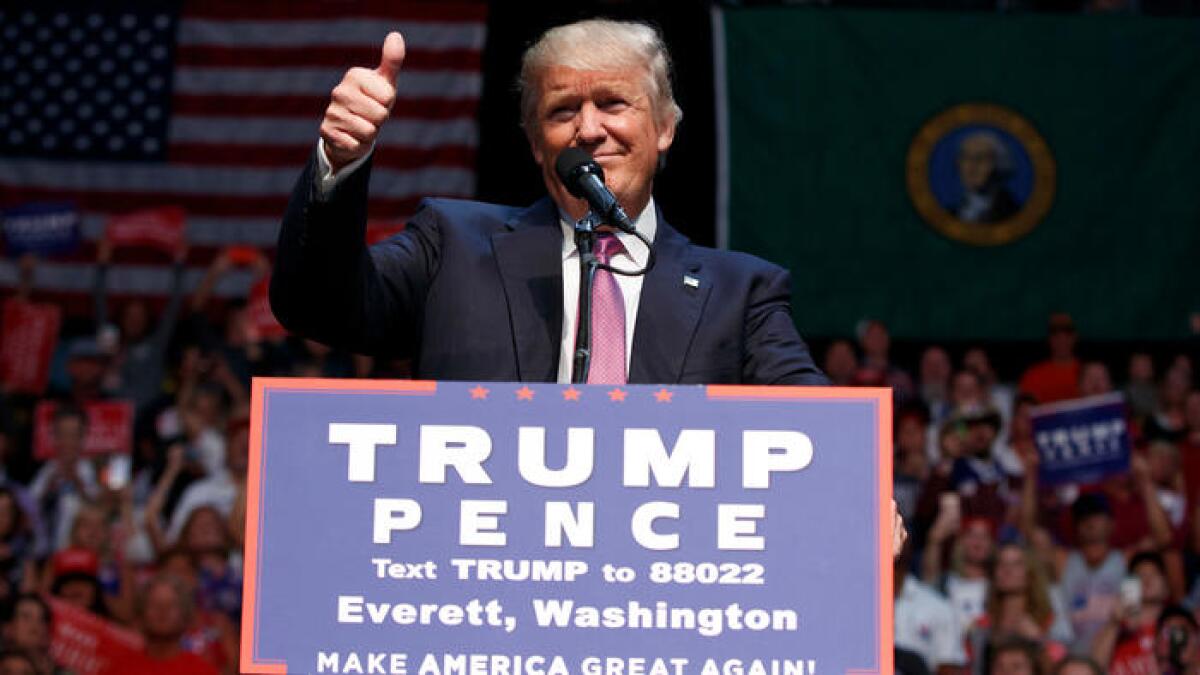
President Trump signed an executive order Monday designed to fulfill his campaign pledge reduce red tape for businesses.
The two-page order requires that when a federal agency proposes new regulations, “it shall identify at least two existing regulations to be repealed.”
“We want to make the life easier for small businesses” and big business, Trump said Monday from the Roosevelt Room of the White House, where he met with nine representatives of the small-business sector.
Trump said he hoped to see “up to 75%” of federal regulations eliminated during his presidency.
“Regulation has been horrible for big business, but it’s been worse for small business,” Trump said.
He also reiterated his promise to gut the Dodd-Frank Act, the financial regulatory overhaul that was passed after the financial crisis.
“Dodd-Frank is a disaster,” he said. “We’re going to be doing a big number on Dodd-Frank.”
Consumer advocates who backed the law say that eliminating it would help Wall Street and other players in the financial sector at the expense of consumers.
- Share via
U.S. diplomats to protest Trump’s travel ban order
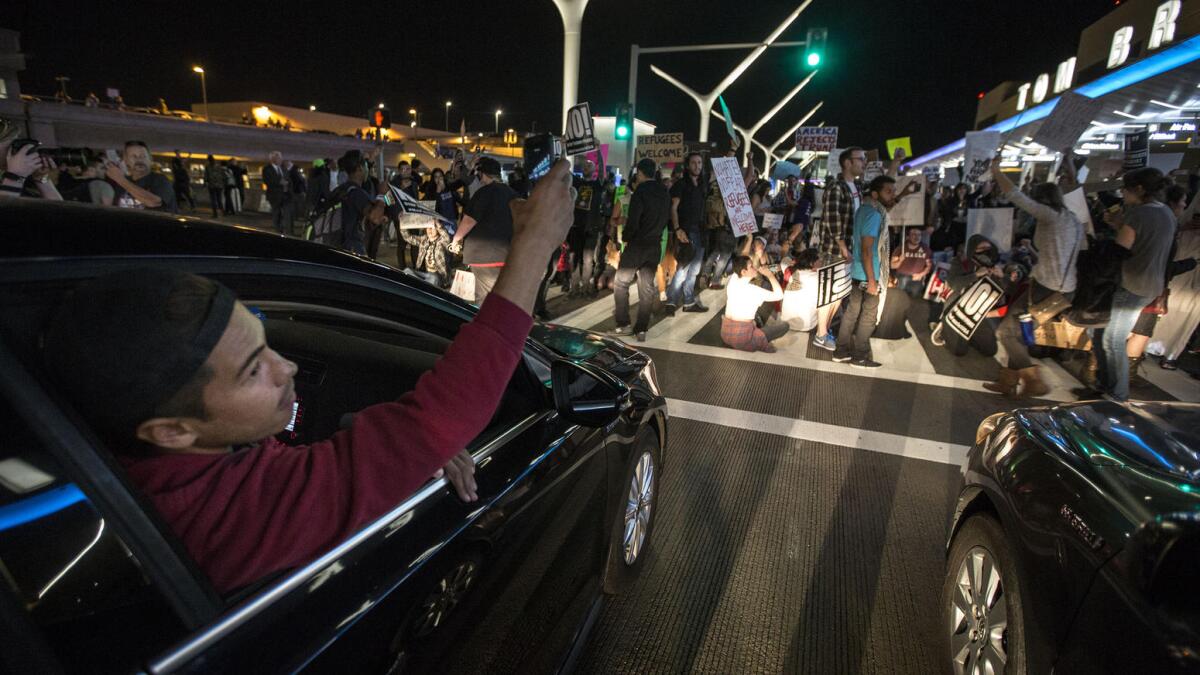
A number of U.S. diplomats are condemning President Trump’s ban on some Muslim immigrants and visitors, saying the abrupt order does not make the U.S. safer and will only stoke anti-American fervor overseas.
The complaint, being made through the State Department’s so-called dissent channel, echoes criticism coming from human rights attorneys, legal experts and lawmakers from both political parties, as well as world leaders.
It is significant because it represents the viewpoint of the men and women who must carry out Trump’s unconventional and often provocative foreign policy.
“A policy which closes our doors to over 200-million legitimate travelers in the hopes of preventing a small number of travelers who intend to harm Americans ... will not achieve its aim of making our country safer,” said a draft version of the memo that was circulating Monday and was reviewed by the Los Angeles Times. It was first reported by ABC News.
“Moreover, such a policy runs counter to core American values of non-discrimination, fair play and extending a warm welcome to foreign visitors and immigrants.”
The White House was quickly dismissive of the dissent and seemed to suggest the diplomats should quit if they disagree with a policy.
Trump spokesman Sean Spicer said the diplomats’ raising of opposition “does call into question whether or not they should continue” to work in the State Department.
It was not clear how many officials would sign the memo.
Dissent channel memos are in theory not made public. The mechanism is designed to allow diplomats to offer an alternative policy without fear of retaliation.
Acting State Department spokesman Mark Toner confirmed the existence of the memo but declined to comment on its contents.
“The dissent channel is a longstanding official vehicle for State Department employees to convey alternative views and perspectives on policy issues,” he said. “... It allows State employees to express divergent policy views candidly and privately to senior leadership.”
The agency is still waiting for a boss. Trump’s pick for secretary of State, former Exxon Mobil CEO Rex Tillerson, is expected to be confirmed by the Senate this week.
The last time a dissent-channel memo was reported publicly was last year, when about 50 diplomats protested Obama administration policy in Syria, which they described as “inaction.”
12:20 p.m.: This story was updated with White House comment.
8:40 a.m.: This story was updated with comment from a State Department spokesman.
- Share via
Trump to announce his Supreme Court choice Tuesday -- in prime time
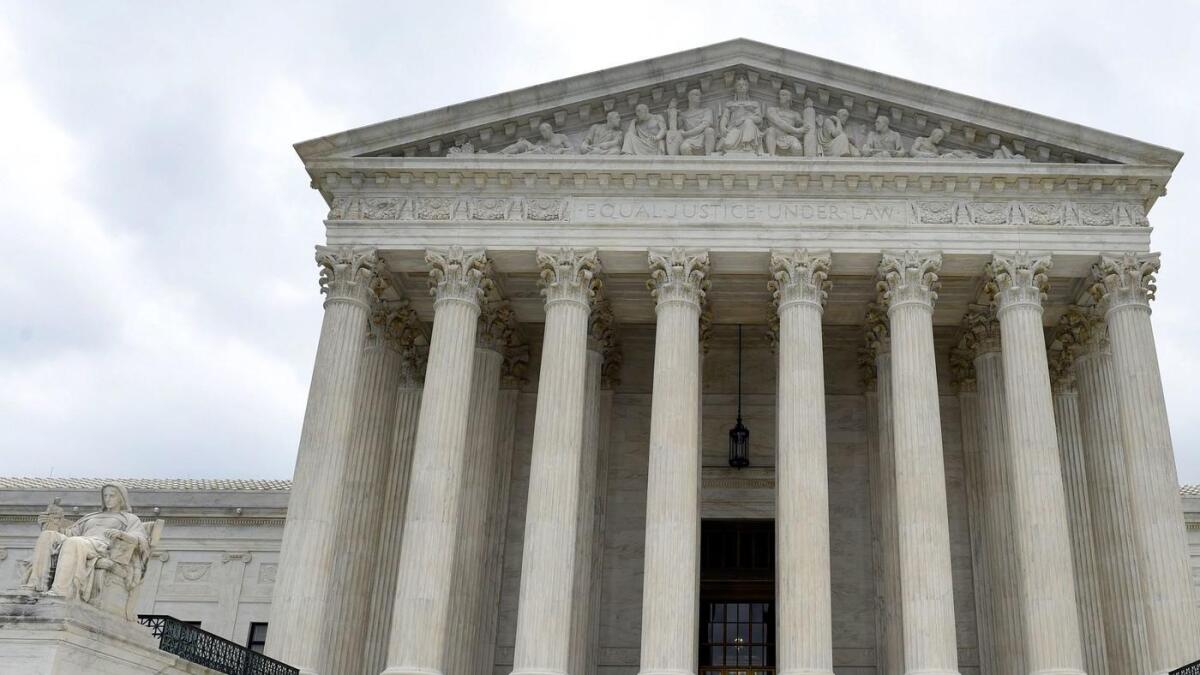
President Trump will announce his first Supreme Court nomination in prime time on Tuesday, he tweeted this morning.
The announcement was moved up two days amid the continued fallout from the executive action Trump signed temporarily banning refugee admissions from some countries. Trump had tweeted last week that he would announce his high-court decision Thursday.
In an interview with the Christian Broadcasting Network on Friday, Trump said his administration was doing some final vetting of his choice to replace the late Antonin Scalia, and that the pick would be from among the list of 20 names he issued during the election campaign.
“I think the person I pick will be big, big,” he said. “I think people are going to love it. I think evangelicals, Christians will love my pick. And will be represented very fairly.”
Times Supreme Court reporter David Savage profiled each of the leading contenders: Judge Thomas Hardiman of the U.S. 3rd Circuit Court of Appeals, Judge Neil M. Gorsuch of the 10th Circuit Court of Appeals, and Judge William H. Pryor Jr. from the 11th Circuit Court of Appeals.
The move could prompt a major clash with Senate Democrats, who have warned the president against a choice outside what they consider the “mainstream.” Some are threatening to block any choice in retaliation for Senate Republicans’ refusal to even hold hearings on President Obama’s choice to replace Scalia, Merrick Garland.
Democrats’ 2013 change to Senate rules that allowed most nominations to advance with a simple majority vote exempted Supreme Court nominations, meaning that Democrats could potentially filibuster the choice.
Senate Majority Leader Mitch McConnell (R-Ky.) appeared to rule out any further rule change in an interview last week, though Trump urged him to consider doing so.
- Share via
As Hollywood gathered at the SAG Awards, some entertainers joined LAX protest
- Share via
Protesters fill lower level of LAX’s Tom Bradley International Terminal
- Share via
LAX traffic at standstill
- Share via
After police advance, most LAX protesters move to sidewalks
- Share via
Police officers and protesters face off at LAX
At a rally at Los Angeles International Airport, police officers are confronting protesters, some of whom are blocking traffic.
- Share via
This New York doctor went to visit family in Sudan, and now he’s stuck

Dr. Kamal Fadlalla, a hospital resident who has been working in New York for the last 20 months, was stuck in Sudan on Sunday, having gone there to see his family earlier this month.
He had left Jan. 13, was due to return Feb. 4 but tried to return on Friday after hearing about President Trump’s executive order on immigration, which suspended entry for people from seven countries, including Sudan.
He made it past passport control, all the way to the gate at the airport in Khartoum, the Sudanese capital.
“One hour before departure they called my name,” he said, and summoned him to the ticket counter, along with other New York-bound Sudanese passengers. “When I got to the counter, they said there was a notice from Customs and Border Protection that ... they had to offload us from the flight. I was shocked.”
Fadlalla, 33, hoped for a reprieve as other passengers gathered, all stuck.
“One family, they came back from Dubai, she was a mother of three or four kids. She was waiting overnight at the Dubai airport. There were also two passengers turned back from New York,” he said. “It was a very tough night on me,”
He stayed for several hours, then returned to his mother’s home in Madani, two hours south.
Fadlalla is a second-year resident in internal medicine at Interfaith Medical Center in Brooklyn. He is hoping to specialize in hematology and oncology.
The Committee for Interns and Residents found an attorney to represent him, he said, but he had not received any news about how a New York federal judge’s ruling late Saturday, which halted the deportations of people who had arrived in the U.S. with valid visas, could affect him.
“I don’t know what I’m going to do. My vacation is going to end and I have to join the hospital next week. It’s going to be tough on me,” Fadlalla said. “I don’t know for how long I’m going to stay here. I don’t know what I’m going to do. My visa is valid for three months. I’m really stuck. I have my house there, my utilities, my work, my patients, my colleagues. It was my life for the past 20 months. And I’m stuck here.”
Fadlalla is from northern Sudan, and describes himself as a “moderate Muslim.” He said the executive order won’t make the U.S. safer by barring valid visa holders like him because, “I’ve been through the whole process of visa interviews.”
He had planned to take board exams next year, and if he misses them, his schooling will be delayed. He had wanted to stay and work in New York, too.
“All my life is there. Now I’m stuck here. I don’t know what to do,” he said. “It’s going to really affect my life, my patients, my colleagues and their work schedule.”
He said the executive order has shocked others in Sudan, too.
“They’re talking about human rights. Everybody knows the United States is about freedom,” he said. “Everybody knows America is a free country, a country of chances for everybody. Still, people have hope in those protesting at airports all over the United States” and attorneys who have volunteered to help immigrants and refugees, he said.
He said the order is especially worrying for aspiring Sudanese medical residents who have been preparing to “match” with a hospital in March to study in the United States.
“A lot of my colleagues who are preparing for exams are really, really worried about this,” Fadlalla said. “I’m really worried about the future of these young people. They study a lot and spend a lot of money, a lot of effort to enter the United States. I’m concerned about my future and my colleagues’ future.”
- Share via
California’s congressional Republicans hold their fire on Trump’s refugee order
Only a few of the state’s 14 Republican representatives have publicly commented on an executive order signed by President Trump on Friday that barred refugees and green card holders from seven countries from entering the country.
Rep. Devin Nunes (R-Tulare) released a statement Sunday night saying that some tweaks are needed, but that his background as chairman of the House Select Intelligence Committee leads him to support the executive order.
“In light of attempts by jihadist groups to infiltrate fighters into refugee flows to the West, along with Europe’s tragic experience coping with this problem, the Trump administration’s executive order on refugees is a common-sense security measure to prevent terror attacks on the homeland,” Nunes said. “While accommodations should be made for green card holders and those who’ve assisted the U.S. armed forces, this is a useful temporary measure on seven nations of concern until we can verify who is entering the United States.”
Rep. Ed Royce (R-Fullerton) told the Washington Post that the executive order is “the right call to keep America safe,” but he hopes the cases of people traveling on visas who were prevented from reentering the country are resolved quickly.
Rep. Jeff Denham (R-Turlock) said Sunday on Twitter that the rollout has created confusion, and that executive orders aren’t the way to fix the country’s long-term problems.
Several of California’s 38 Democratic congressional representatives and the state’s two senators were out in force over the weekend demanding the release of refugees and green card holders as well as an end to the executive order.
Sen. Dianne Feinstein (D-Calif.) announced she would file two pieces of legislation in response. One would immediately rescind the president’s order. The second would limit executive authority under the Immigration and Nationality Act to prevent a president from unilaterally banning groups of immigrants.
“It’s clear that the president gave little consideration to the chaos and heartbreak that would result from this order,” she said in a statement.
Sen. Kamala Harris (D-Calif.) joined protesters outside the White House on Sunday afternoon.
In Los Angeles, Reps. Maxine Waters (D-Los Angeles) and Ted Lieu (D-Torrance) joined protesters at Los Angeles International Airport. On Saturday, Reps. Judy Chu (D-Monterey Park), Nanette Barragán (D-San Pedro) and Lou Correa (D-Santa Ana) joined the initial protests at the airport, and worked to get some of those being held released.
Rep. Eric Swalwell (D-Dublin) accompanied protesters at San Francisco International Airport on Sunday.
- Share via
Legal moves come too late for Iranian man who arrived at LAX after Trump’s order
Ali Vayeghan arrived at 7:15 p.m. Friday from Tehran. He was going to stay with relatives, then go to Indiana, to join his wife, who arrived in the U.S. four months ahead of him, and his son.
But he never emerged from customs. His niece said he was put on a plane to Dubai, United Arab Emirates, at 3:15 p.m. Saturday.
The ACLU was trying to prevent his deportation but arrived with paperwork 45 minutes too late.
The family spoke to him by phone after he landed in Dubai, where he was waiting to be put on a flight to Tehran.
“He’s literally crying in the airport in Dubai,” Ali Vayeghan’s niece, Marjan Vayghan, said.
On Sunday afternoon, a federal judge in Los Angeles ordered authorities to transport Vayeghan back to the U.S. and admit him under the terms of his visa, which is set to expire Feb. 14.
U.S. District Judge Dolly M. Gee said in her order that Vayeghan had demonstrated “a strong likelihood of success in establishing that removal violates the Establishment Clause, the Immigration and Nationality Act, and his rights to Equal Protection guaranteed by the United States Constitution.”
But by the time the order came down, Vayeghan was on a plane bound for Tehran.
- Share via
The political climate is a hot topic at the Screen Actors Guild awards

Stars on the red carpet and at the winner’s podium tonight in Los Angeles are not keeping their mouths shut on current affairs.
The 23rd Screen Actors Guild awards are being held at the Shrine Auditorium.
Here’s what they have had to say so far:
I want you all to know that I am the daughter of an immigrant. My father fled religious persecution in Nazi-occupied France, and I’m an American patriot, and I love this country, and because I love this country, I am horrified by its blemishes and this immigrant ban is a blemish and it is un-American.
— Julia Louis-Dreyfus, accepting her award for her role in “Veep”
We need to vote. Had we all voted, we wouldn’t be here. You don’t like it, you don’t have nothing to say if you didn’t vote. Get a clipboard, get organized and get in it. Don’t sit back on the sidelines. Get in it. This is a fight for the country right now. It’s worth fighting for.
— Courtney B. Vance, nominated for his performance in “The People v. O.J. Simpson: American Crime Story”
For the first time ever in my lifetime, I’ve been concerned about where it’s going to go. It doesn’t seem to be that it’s going to go in a very positive direction.
— Claire Foy, nominated for her role as Queen Elizabeth in the Netflix series “The Crown”
- Share via
Green card holders will not be blocked by Trump’s order, Homeland Security says

The Trump administration backed away from one of the most controversial parts of its new executive order on immigration Sunday evening, saying that permanent U.S. residents in most cases will not be affected by the new rules.
Since the president issued the order Friday, confusion has been rampant over the effects on permanent residents, noncitizens who hold so-called green cards that allow them to live and work legally in the U.S.
Many were stopped and detained at airports for many hours on Friday and Saturday and, in some cases, reported that they had been threatened with being returned to their home countries. An undetermined number of other green card holders were stopped from boarding U.S.-bound planes.
Late Sunday, however, the secretary of Homeland Security, retired Gen. John Kelly, issued a statement changing the policy.
“I hereby deem the entry of lawful permanent residents to be in the national interest,” Kelly wrote.
Green card holders from one of the seven countries covered by the 90-day ban will still need to request a waiver to gain reentry to the U.S. if they have traveled abroad. But unless officials have “significant derogatory information” about a green card holder that indicates “a serious threat to public safety and welfare, lawful permanent resident status will be a dispositive factor” in deciding the case, Kelly’s statement said.
A White House official, briefing reporters about the change in policy, said that about 170 people have applied for a waiver to the ban so far, and all 170 have received a waiver and have been allowed to enter the U.S.
The seven countries affected by the ban are Iran, Iraq, Syria, Libya, Somalia, Sudan and Yemen.
- Share via
Uber fights immigration order -- and #DeleteUber hashtag -- with $3-million legal fund for drivers
Hours after Lyft’s co-founders announced a $1-million donation to the American Civil Liberties Union to “defend the
Constitution,” Uber Chief Executive Travis Kalanick pulled out his pocket book as well.
Kalanick promised in a Facebook post that the company would create a $3-million legal defense fund to help drivers affected by the Trump administration’s move to restrict immigrants and refugees from seven Muslim-majority countries. The fund will help drivers with immigration and translation services. Kalanick also said the San Francisco ride-hailing company will provide 24/7 legal support to drivers stuck outside the country and compensate them for lost earnings. Drivers eligible for assistance were directed to contact the company via an online form.
Although the announcement was greeted with some support on Facebook and Twitter, many saw it as too little too late. The company had come under fire a day earlier for advertising on Twitter that it was operating at New York’s Kennedy International Airport during a taxi strike protesting the executive order.
That gaffe, coupled with Kalanick’s involvement in a panel advising President Trump on economic issues, helped spawn the Twitter hashtag #DeleteUber, which encouraged customers to delete the app from their phones in protest.
“You are 20 hours too late,” one person wrote in response to Kalanick’s Facebook post.
“Still deleted my account today,” wrote another.
Though Kalanick issued a statement on Saturday opposing the executive order, it didn’t stop thousands of Twitter users from adopting the trending the #DeleteUber hashtag to decry Uber’s actions. They accused the company of attempting to profit from the strike and prioritizing business interests over a moral imperative. Celebrities also jumped on the bandwagon, with actor and activist George Takei on Sunday tweeting to his 2.9 million followers: “Lyft donates $1mil to ACLU while Uber doubles down on its support for Trump. #DeleteUber.”
- Share via
75-year-old grandmother from Iran tells the story of her detention at LAX

Marzieh Moosavizadeh and her grandson follow a routine when she visits almost every year from Iran.
The 75-year-old, who travels in a wheelchair and speaks little English, struggles to find direct flights to Phoenix, where he and his family live. So they meet in Los Angeles and he escorts her on the last leg of her trip.
This time was different.
Moosavizadeh landed at Los Angeles International Airport a day after President Trump signed an executive order banning citizens from seven predominantly Muslim countries, including Iran, from entering the United States.
- Share via
Protesters on the move at LAX
- Share via
GOP senators call executive order a ‘self-inflicted wound.’ Trump calls them ‘wrong’ and ‘weak’
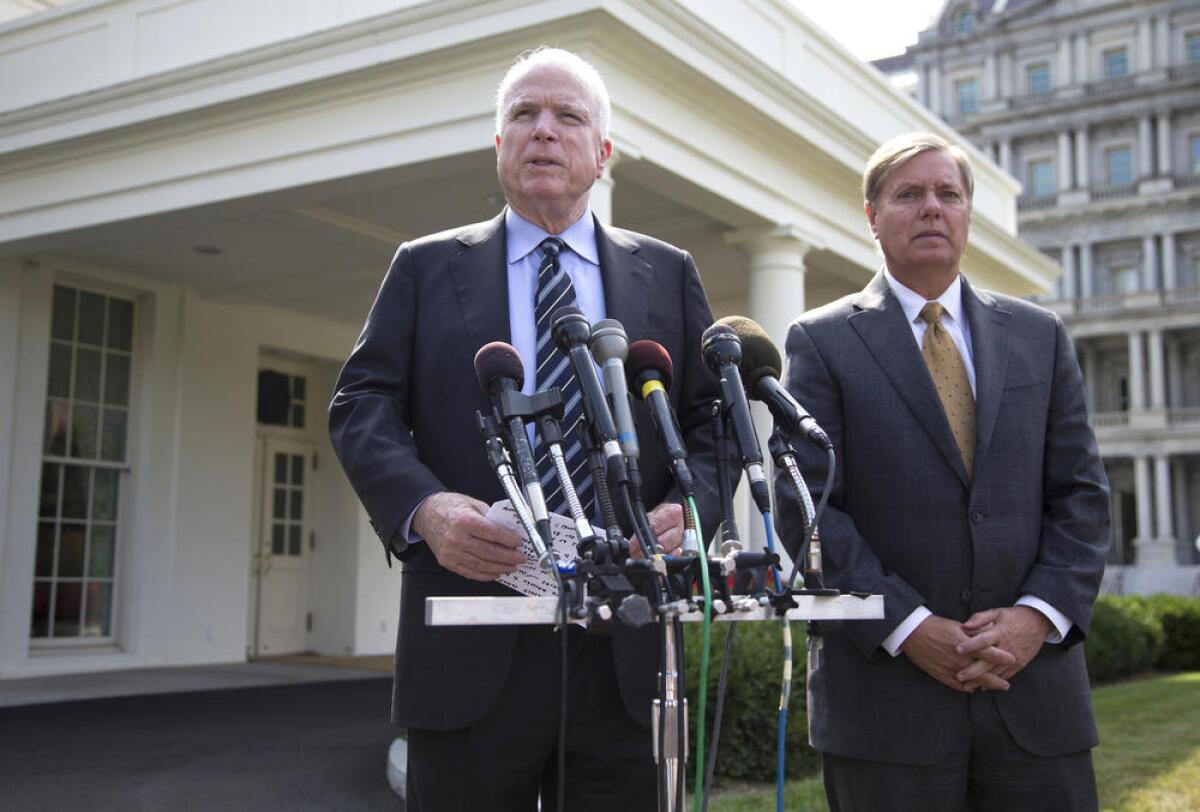
U.S. Sens. Lindsey Graham of South Carolina and John McCain of Arizona released a statement Sunday saying that confusion at U.S. airports shows that President Trump’s executive order on immigration “was not properly vetted.”
“Such a hasty process risks harmful results,” the Republicans’ statement read. “We should not stop green-card holders from returning to the country they call home. We should not stop those who have served as interpreters for our military and diplomats from seeking refuge in the country they risked their lives to help. And we should not turn our backs on those refugees who have been shown through extensive vetting to pose no demonstrable threat to our nation.”
It went on: “Ultimately, we fear this executive order will become a self-inflicted wound in the fight against terrorism.”
The president responded on Twitter:
- Share via
At least 600 people wait to greet Syrians arriving in Phoenix
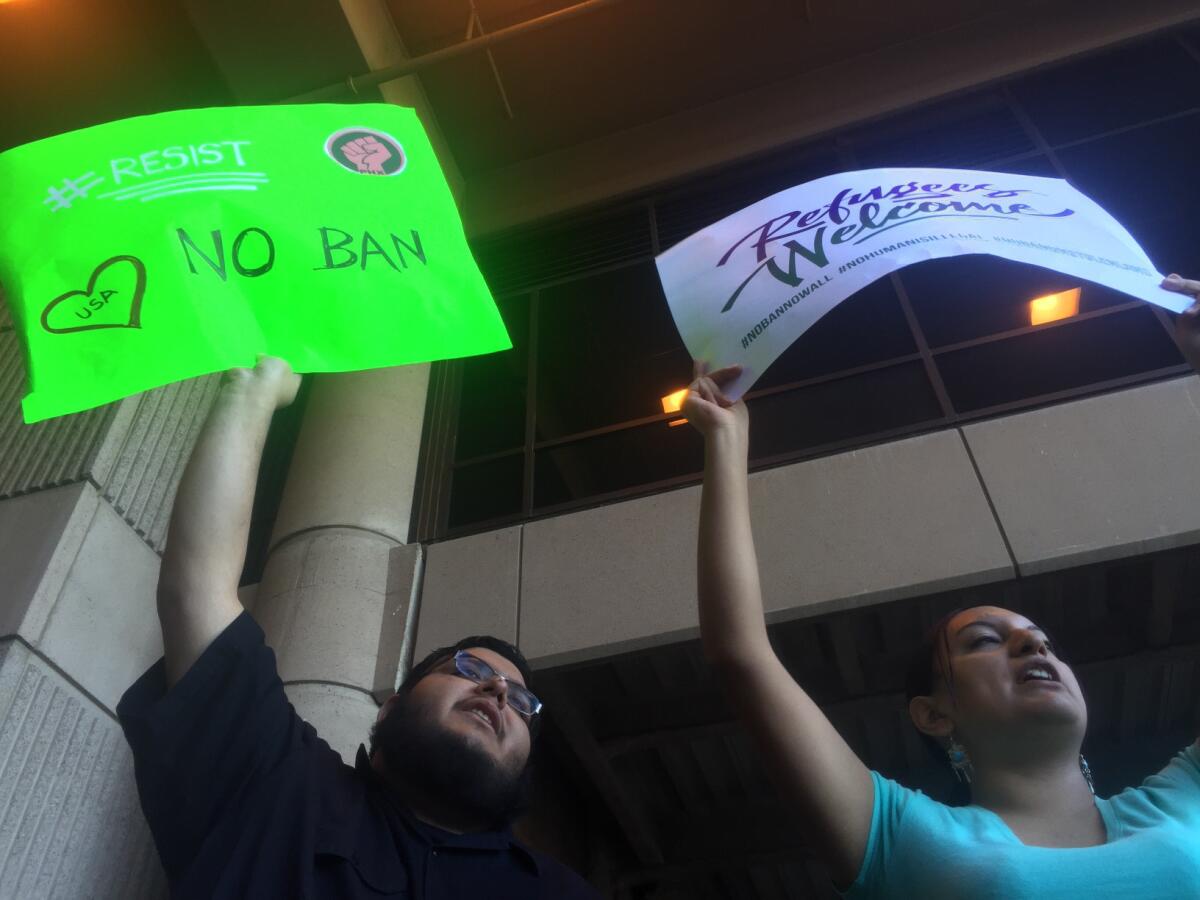
A Phoenix-bound British Airways flight was scheduled to arrive from London at Sunday evening carrying several Syrians.
A protest of about 600 people was waiting at a Phoenix international airport terminal for the flight to arrive.
“The outcome when these people arrive is uncertain at best,” said Tanveer Shah, an Arizona attorney in private practice who volunteers with the ACLU.
Shah said Syrians on board the flight would, “in the best case,” walk off the plane without a problem. But given the outcomes in other cities on Saturday and Sunday, Shah said it was incumbent on civil liberties attorneys to be there when the plane arrives.
“We have staff attorneys here ... who are prepared to file emergency pleadings,” Shah said.
- Share via
When Muslims got blocked at American airports, U.S. veterans rushed to help
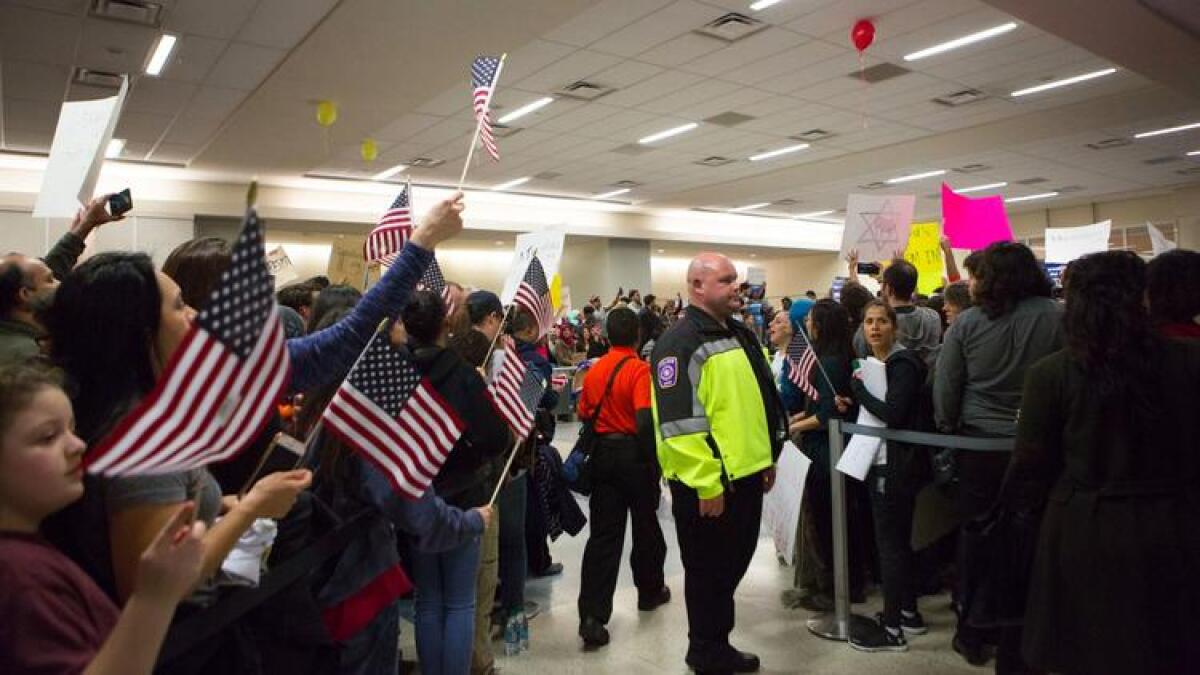
Jeffrey Buchalter was reflooring his foyer in Chesapeake Beach, Md., and listening to MSNBC over the weekend when he heard the news: An Iraqi who had worked with American forces as an interpreter had been stopped from entering the U.S. under a new executive order on immigration from President Trump.
The story stopped him cold. Buchalter, an Army veteran who works as a law-enforcement instructor at the Department of Homeland Security, had served multiple tours of duty as a military policeman in Iraq, service that cost him dearly.
He was decorated for injuries sustained from gunfire and improvised explosive devices. Exams revealed he’d suffered herniated discs, traumatic brain injury and post-traumatic stress disorder, and he spent 2 ½ years at Walter Reed Army Medical Center trying to get right.
But he was still alive, and now the married father of two children. And he believes that’s thanks in part to the work of Iraqi interpreters who acted as guides during his work in their country. So he told his younger daughter and son they were going to take a trip: a two-hour drive to Dulles International Airport outside Washington, D.C., where, for the first time in his life, Buchalter would join a protest.
- Share via
Demonstrators against Trump’s immigration limits — and a few who like them — surge through LAX
Thousands of people filled the international terminal at Los Angeles International Airport on Sunday afternoon to call for the release of an unknown number of people being detained by immigration authorities.
Filling the arrivals section of the terminal and spilling into the street outside, the throng chanted, “Let them in,” and “Love, not hate, makes America great.”
Jacob Kemper, a 35-year-old Army veteran who fought two tours in Iraq, said he was infuriated to think soldiers he fought alongside might be denied entry to the country.
“I really don’t care about religion, but I really hate oppression,” he said, holding a sign that read, “I Fought Next To Muslims.”
Shay Soltani, a network engineer, fled the Iranian revolution 40 years ago and still has family members in Iran. She doesn’t know if she will be able to see them again.
As she and hundreds of others marched through the airport, she said she was horrified by Trump’s order.
“I am so hurt by this,” she said. “He is against freedom of speech and the constitution and everything I believe in as an American.”
Meanwhile, about a dozen counter-protesters popped up on the other side of the street, holding signs that said “X-treme vetting” and “Keep Refugees Out.” They said they were tired of immigrants entering the U.S. illegally, which they said jeopardizes the safety of American citizens.
Chanell Temple, 63, of Los Angeles said she was sick of watching immigrants here illegally “steal” benefits and services from American citizens, specifically veterans and homeless people who need aid.
“I worked out here for 40 years and they are coming here and taking everything away,” said Temple, a former bookkeeper who said she lost her job and healthcare after she was fired for an inability to speak Spanish.
Raul Rodriguez Jr., coordinator of a group called America First Latinos, said he was concerned about what he considers a surge in crimes committed against Americans by those who are in the country illegally.
“They are lawbreakers. They have violated federal law and they need to be deported,” he said.
- Share via
‘You build it up, we’ll tear it down’: Immigration protest growing at Los Angeles airport
- Share via
Silicon Valley execs speak out against immigration ban
Technology executives are speaking out against President Trump’s executive order on immigration, highlighting how the ban hurts their businesses. Leaders of companies that include Google, Microsoft, Apple, Facebook, Uber, Lyft, Airbnb, Dropbox and Twitter denounced it over the weekend.
“Apple would not exist without immigration, let alone thrive and innovate the way we do,” said Apple chief executive Tim Cook in a memo to employees. “In my conversations with officials here in Washington this week, I’ve made it clear that Apple believes deeply in the importance of immigration — both to our company and to our nation’s future.”
General Electric Co. chief executive Jeff Immelt said Sunday that businesses with global operations must balance working with the new administration while also supporting their workers and partners.
“We have many employees from the named countries and we do business all over the region,” Immelt said in a statement. “These employees and customers are critical to our success and they are our friends and partners. We stand with them and will work with the U.S. administration to strive to find the balance between the need for security and the movement of law abiding people.”
- Share via
LAX protest grows as families wait
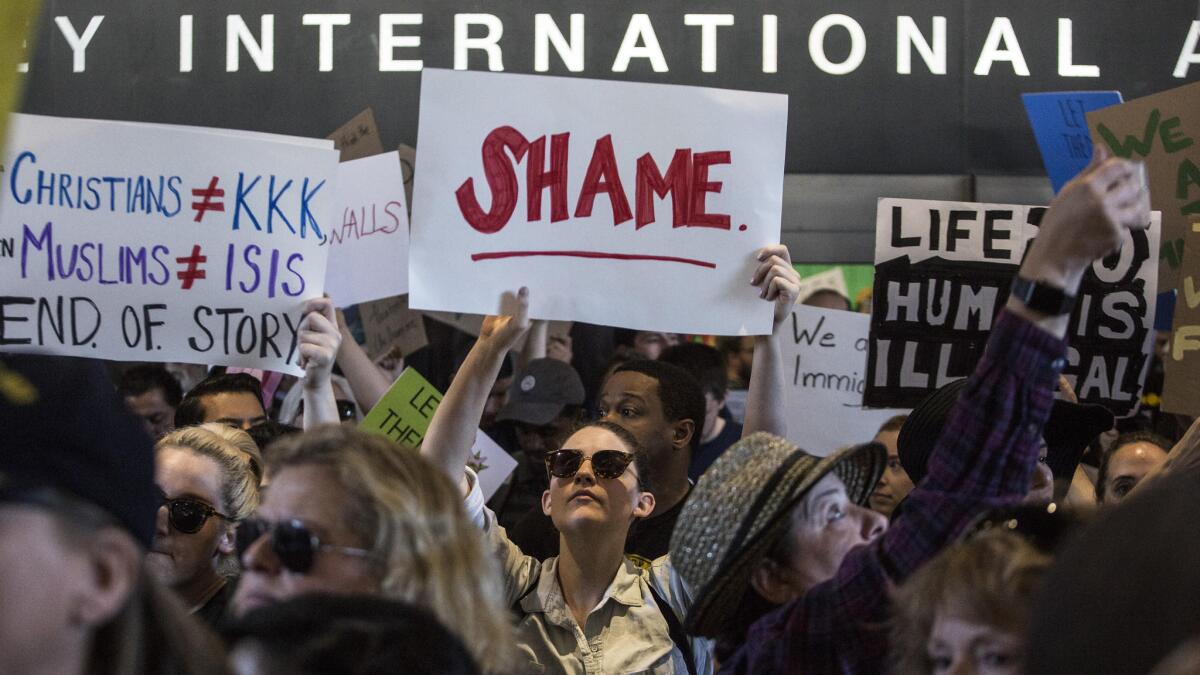
- Share via
Protest growing at LAX
- Share via
L.A. city attorney barred from seeing detainees at LAX
Los Angeles City Atty. Mike Feuer said he was repeatedly denied access to federal detainees or an attorney who could discuss the situation with him at Los Angeles International Airport on Saturday night and Sunday morning.
Federal officials have declined to discuss the LAX detentions or respond to Feuer’s criticisms.
While he was at the airport, Feuer said he was approached by a woman who claimed her father, suffering from Parkinson’s disease, was among the detainees.
It is those kind of real stories that are at stake because of this outrageous action by the feds. It is time not only for officials in my position, but all Americans, should find this a breathtaking violation of rights.
— Mike Feuer
- Share via
Democratic attorneys general from 15 states condemn Trump immigration order
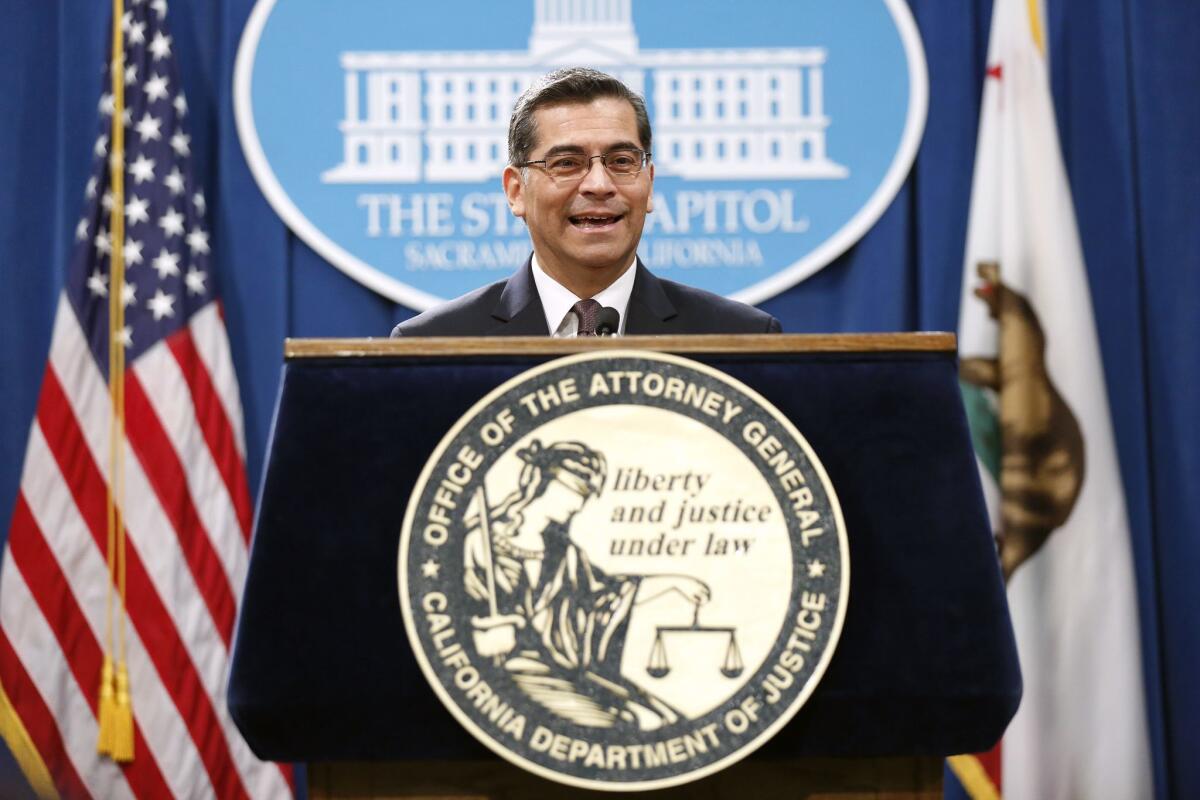
More than a dozen Democratic attorneys general from states across the country have condemned the Trump administration’s executive order suspending acceptance of refugees and have vowed to oppose it “to ensure that as few people as possible suffer from the chaotic situation that it has created.”
In a communique Sunday, the group said: “As the chief legal officers for over 130 million Americans and foreign residents of our states, we condemn President Trump’s unconstitutional, un-American and unlawful Executive Order and will work together to ensure the federal government obeys the Constitution, respects our history as a nation of immigrants, and does not unlawfully target anyone because of their national origin or faith.”
The executive order places an indefinite ban on refugees from Syria and prohibits citizens from Iran, Iraq, Libya, Somalia, Sudan, Syria and Yemen from entering as refugees for four months. It also places a suspension on admissions of other citizens of those countries.
The legal officials represent 15 states. They include California Atty. Gen. Xavier Becerra and his contemporaries in Washington, Connecticut, Hawaii, Illinois, Iowa, Maine, Maryland, Massachusetts, New Mexico, New York, Oregon, Pennsylvania, Vermont, Virginia, as well as the District of Columbia.
“Religious liberty has been, and always will be, a bedrock principle of our country, and no president can change that truth,” the attorneys general said in the statement. They praised the decision of multiple federal courts to order a stay on some aspects of the order.
“We are confident that the Executive Order will ultimately be struck down by the courts,” the statement said.
- Share via
13 people who had been detained at LAX have been released, source says
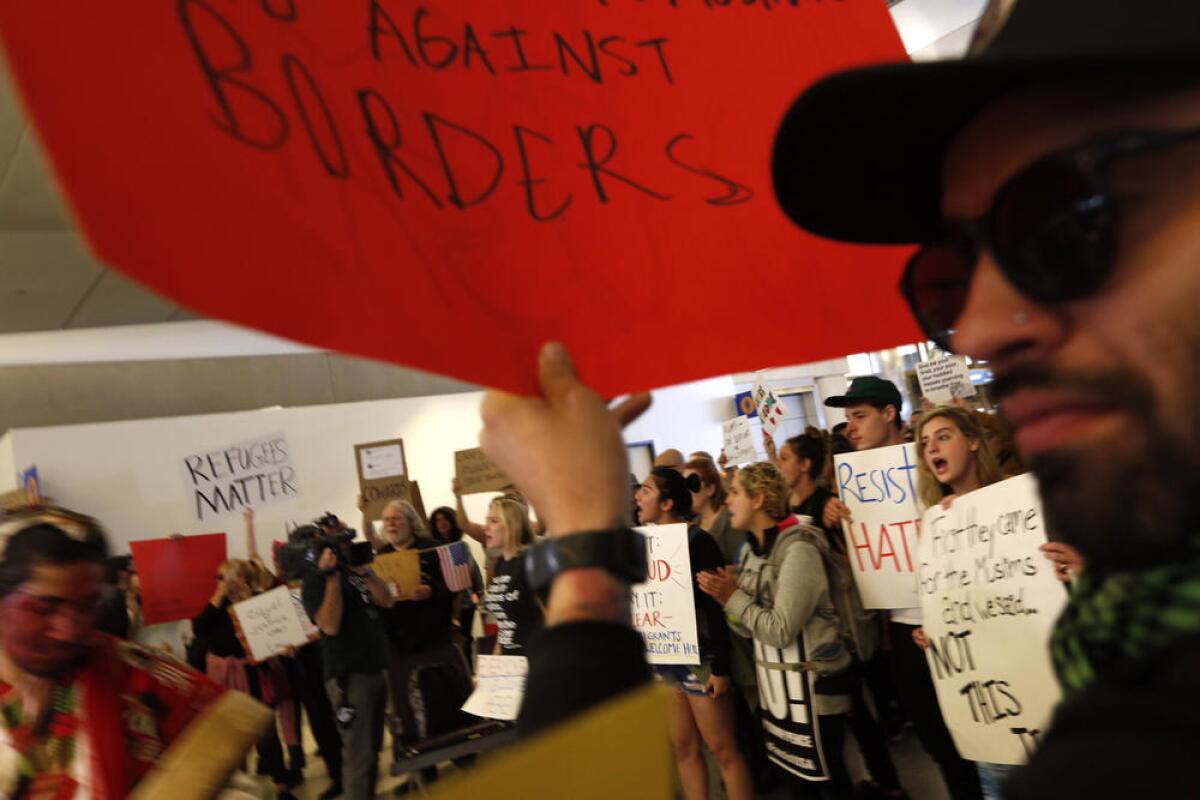
Thirteen people who were detained Saturday night at Los Angeles International Airport’s Terminal 2 were eventually released, a law enforcement source told The Times. Each of them held green cards, which grant permanent residency in the U.S.
The source, who requested anonymity because they were not authorized to discuss the situation at the airport, could not provide detention figures for the Tom Bradley International Terminal, which has been the center of protest activity.
That’s where protesters were gathering Sunday.
Nurse Jamie Shoemaker, 51, of Los Angeles held an American flag in one hand and carried a sign that read, “Muslims are welcome here, racists and fascists are not.”
She called Trump’s order “un-American.”
“This is not the country I want,” she said. “This is not the country I grew up in.”
- Share via
Democrats in Congress drafting legislation to repeal Trump’s refugee ban, pressuring GOP for support
Senate Minority Leader Charles E. Schumer and Democrats will introduce legislation as soon as Monday to stop President Trump’s actions temporarily banning refugees and arrivals from certain Muslim countries.
House Democrats are taking similar legislative action, and lawmakers from both chambers will rally Monday evening at the Supreme Court to protest Trump’s orders.
“This executive order was mean-spirited and un-American,” said Schumer, the New York Democrat, choking up as he stood with immigrants and refugees at a press conference Sunday. “It must be reversed immediately.”
Minority Leader Nancy Pelosi said House Democrats are exploring legal options, including an amicus brief in support of the ACLU lawsuit against the actions.
The chances of passing a bill through the Republican-controlled Congress are slim, as most GOP leaders and lawmakers have not objected to Trump’s ban.
Senate Majority Leader Mitch McConnell (R-Ky.) said Sunday that while he was personally opposed to a “religious test” on admissions, it was best left to the courts to resolve the issue.
“It’s hopefully going to be decided in the courts as to whether or not this has gone too far,” McConnell said on ABC’s “This Week.”
House Speaker Paul D. Ryan (R-Wis.) expressed his support Friday for Trump’s action.
A handful of Republicans, though, are uneasy with Trump’s orders, and have spoken against them.
Schumer noted that just few more Republicans would be needed to reach the 60-vote threshold for advancing Senate legislation.
“Maybe we can pass something in Congress,” Schumer said. “It’s up to Republicans.”
- Share via
Emotional reunion at JFK airport after release of elderly Sudanese man from immigration detention
For those immigrants temporarily detained under a new Trump administration executive order at New York’s John F. Kennedy International Airport, attorneys have put a priority on getting some of the older detainees released to their families.
One small victory for the lawyers was the case of Yassin Abdelrhman, a 76-year-old green card holder from Sudan who had been detained after a trip home to visit family. He was released about noon on Sunday after being detained for 30 hours.
Soon, he was reunited with his sons.
“He is a strong individual, but he has some health challenges,’’ said U.S. Rep. Hakeem Jeffries (D-N.Y.), who had been working on their case.
- Share via
Iranian director Asghar Farhadi will not attend Oscars
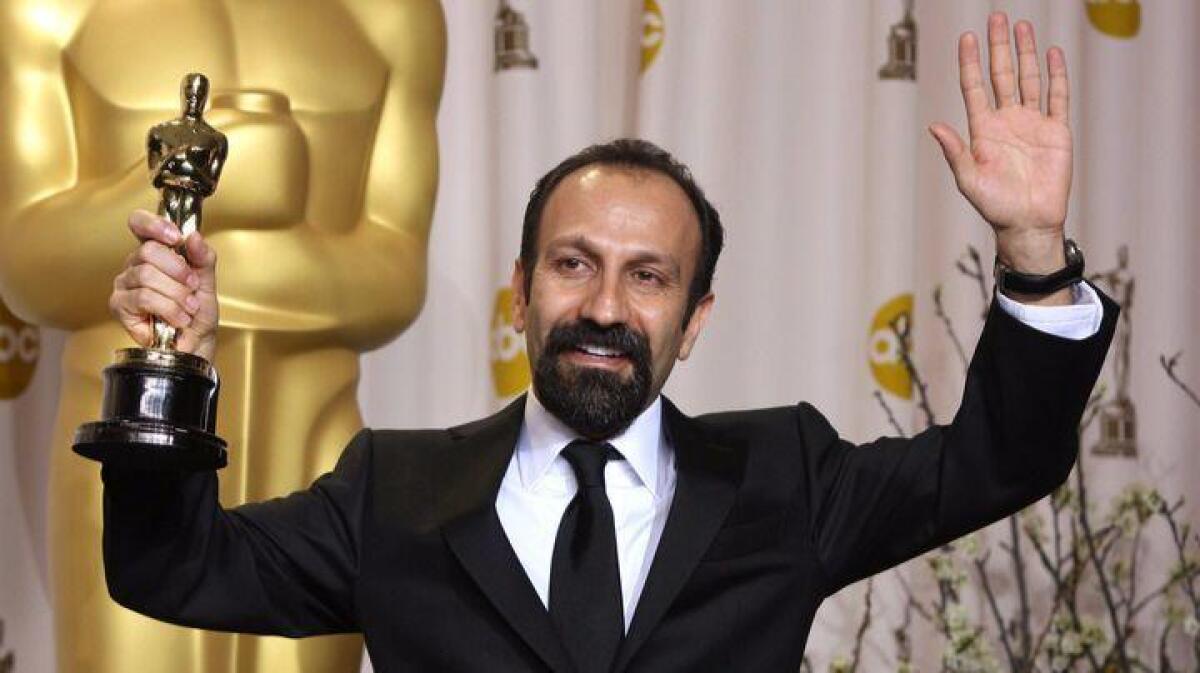
In a statement to the New York Times today, Oscar-winning Iranian filmmaker Asghar Farhadi said he no longer planned to attend this year’s ceremony. Farhadi’s film “The Salesman” is nominated in the foreign language film category.
Farhadi had initially hoped to attend despite the prohibition on visitors from Iran. But he said he had decided “the possibility of this presence is being accompanied by ifs and buts which are in no way acceptable to me even if exceptions were to be made for my trip.”
- Share via
How an Iranian Fulbright scholar got into the U.S.: ‘We found a lawyer who found a lawyer who found a lawyer’

Perhaps nothing encapsulates the chaos emanating from President Trump’s executive order better than what happened with Ukrainian Airlines Flight 232.
The regularly scheduled flight to Kiev had to turn around on the tarmac at John F. Kennedy Airport early Sunday after a federal judge issued a stay of a deportation order of dozens of foreigners, including a 32-year-old Iranian linguist who is a doctoral candidate and former Fulbright scholar.
With just minutes to spare, Vahideh Rasekhi -- helped by volunteer lawyers and her smart phone – managed to prevent the flight from taking off. She had arrived Saturday afternoon, but was blocked from entering the United States by the executive order barring arrivals of citizens of Iran, Iraq, Syria, Sudan, Somalia and Libya.
Around midnight, she was put on the Ukrainian Air flight to return to Tehran, via Kiev.
“We found a lawyer who found a lawyer who found a lawyer,” said Mehdi Namazi, 29, a friend who has been waiting for her at the airport. The lawyers were showing officials a copy of the order issued a few hours earlier by U.S. District Court Judge Ann Donnelly in Brooklyn.
“It was all very confusing. They were arguing as the plane was taxiing,” Namazi said.
According to one lawyer, Melissa Trent, Rasekhi herself was walking up and down the aisles arguing for the plane not to take off.
“She knew that if the plane left she would never get back to the United States again,” Trent said.
Rasekhi spent most of Sunday in detention with other Iranians, but was released into the United States at around 3 p.m..
A dozen Iranian friends had been waiting inside the airport’s Terminal 4 amid a clutter of discarded coffee cups and half-eaten donuts in front of a diner that had been turned into a makeshift law office. Another Iranian student was waiting for her parents, who were taken into detention after arriving on another flight
“I haven’t seen them in 3-1/2 years. They don’t speak English. But I’m hopeful,” said the student, who gave her name as Sahar.
The students were both furious at the way their country had been targeted by Trump’s order and touched by the outpouring of support from the volunteer lawyers.
“We see two different Americas here. There is this order banning us, and than there are all these people here who came to the airport. If it weren’t for these volunteers, she would have been deported,” said Namazi.
“I’m very depressed. We feel betrayed by this country that we invested so much energy and hope into. We are all graduate students, professors, PhDs, engineers. To say this is for national security, it doesn’t add up,” said Tahmineh Tabrizian, 33, another friend of Rasekhi’s. She said her own parents had planned to come to the United States and had spent $14,000 on tickets and visas and would now have to cancel their trip.
Rasekhi, who has lived in the United States for a decade, was a Fulbright scholar at UC Santa Barbara and received a master’s degree at Fresno State University, according to a resume supplied by one of her friends. She had been studying for a PhD at Stony Brook University on Long Island. She had gone to Tehran over the Christmas break to visit her parents and was on her way back to resume her studies when she was detained.
- Share via
Protests begin again at LAX on Sunday morning
- Share via
Protesters in Tel Aviv compare Trump immigration order to Israeli refugee policies
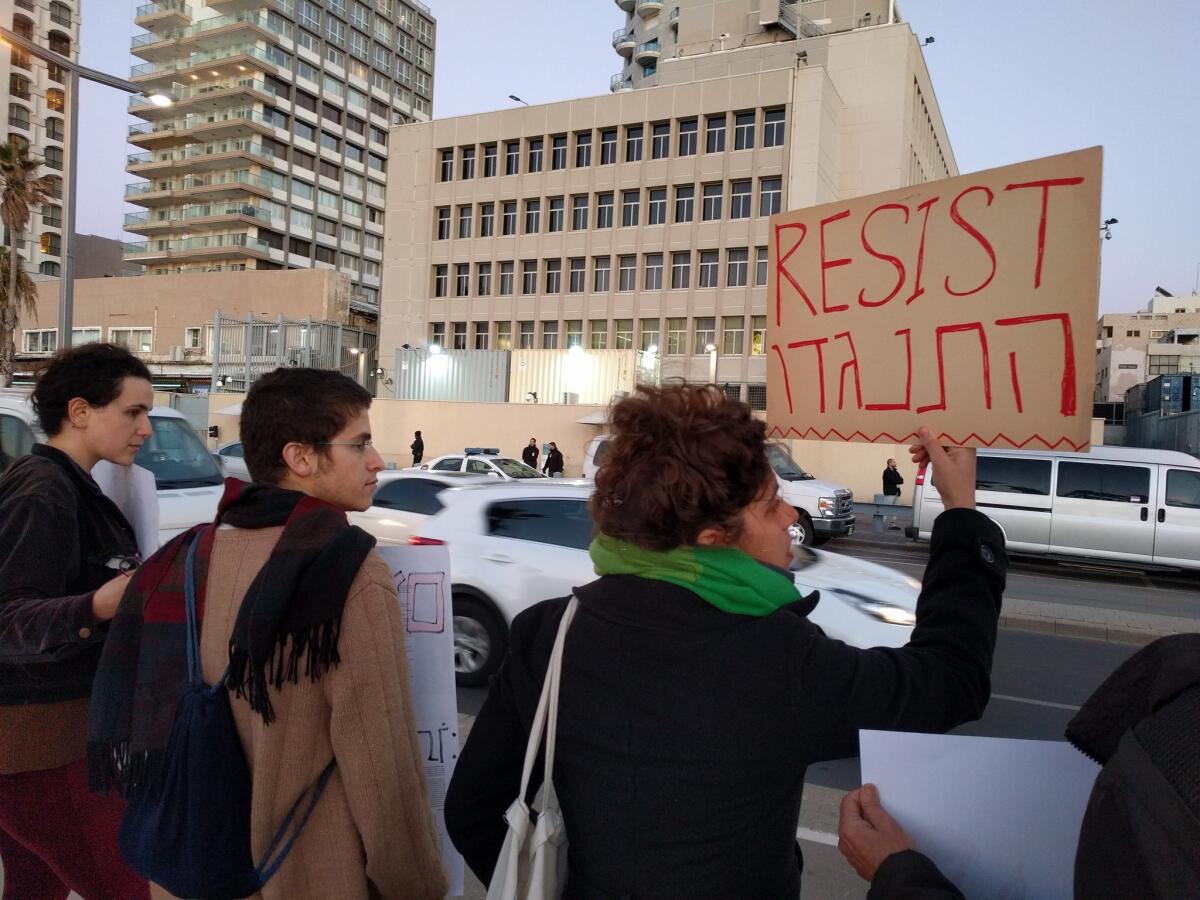
Holding signs reading “Refugees Welcome” and chanting “No Ban, No Wall, Sanctuary for All,’’ several dozen demonstrators gathered outside the U.S. Embassy in Tel Aviv on Sunday to join protests in the U.S. against President Trump’s new immigration policy.
Mia Zur Szpiro, a 36-year-old filmmaker, said she felt compelled to demonstrate because her parents survived the Holocaust. “We are a country of immigrants, and to me it was astounding that this [order] was passed on Holocaust Memorial Day,’’ she said. “It’s wrong to stereotype, and it’s wrong to send people who are in need back into the face of danger and the risk of death.’’
Elliot Vaisbrub Glassenberg, a protest organizer and migrant rights activist, compared the new U.S. policy to Israeli policies toward tens of thousands of Eritrean and Sudanese migrants who crossed into the country illegally from Egypt’s Sinai desert.
“The policies that Trump has enacted are no worse than the policies that [Israeli Prime Minister Benjamin] Netanyahu has enacted for years here – such as not allowing any non-Jews to be given refugee status in Israel, except for a select few.’’
Togod Omar, a native of Sudan who was at the protest, said he applied for political asylum in Israel three years ago, and is still waiting. He said Sudanese friends hoping to be resettled in the U.S. were upset by the new executive order.
“Trump doesn’t understand what’s going on in Sudan,’’ Omar said. “You can’t punish the Sudanese people for what the Islamic government is doing. You can’t banish someone because of their religion.’’
- Share via
President Trump hits majority disapproval in record time, Gallup finds
President Trump’s actions during his first week in office have appeared to be aimed at the voters who already supported him, not at reaching out to the rest, and that’s taken a rapid toll on his support, which was already historically low.
Gallup, which has measured job approval for presidents for decades, shows Trump’s approval so far at 45%, with 48% disapproving. That’s an average of several days’ polling.
The daily trend lines are not kind to the new administration. As of Saturday, 51% of Americans disapproved of Trump’s performance.
That’s a record for the speed of getting to majority disapproval.
By comparison, President George W. Bush hit majority disapproval six months into his second term, in June 2005, and remained in negative territory for the rest of his tenure.
President Obama did not hit 51% disapproval until August of 2011, during the crisis over the federal debt ceiling that summer. His approval rebounded later that year, but he had a second period of majority disapproval during late 2013 and much of 2014. He ended his term with widespread approval and 37% of Americans disapproving.
- Share via
Hundreds of travelers were caught in limbo over rushed visa ban
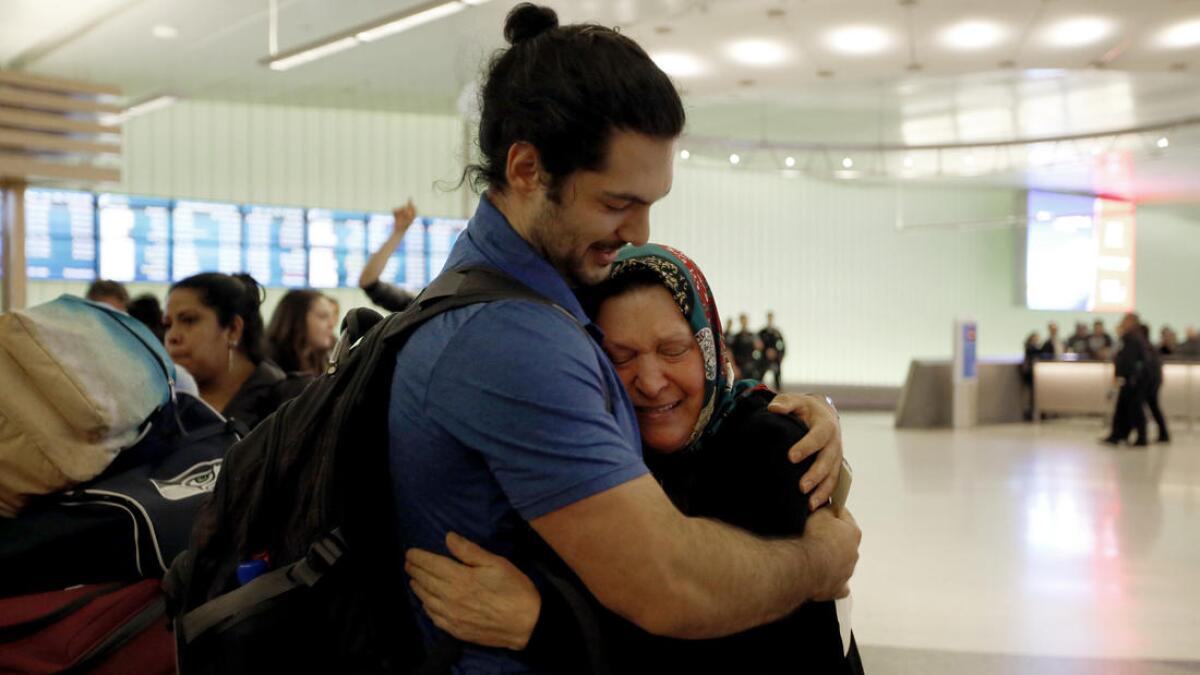
Hundreds of travelers were blocked from entering the U.S. or prevented from boarding flights in the hours after President Trump signed his order banning arrivals from seven predominantly Muslim countries, according to the Department of Homeland Security.
In the order, Trump temporarily suspended refugee admissions and banned travelers from Iran, Iraq, Syria, Libya, Somalia, Sudan and Yemen.
Scores of people from those countries were aboard airplanes flying toward the U.S. when Trump signed his executive order on Friday afternoon, setting off waves of confusion among border officials and the traveling public.
Upon landing at U.S. airports, 109 people from the listed countries were detained by immigration officials and prevented from entering the U.S., officials said.
The department had approved 81 waivers to the new travel ban by Saturday afternoon, the official said, but at least some of the people detained on arrival were sent back to their countries of origin.
Court orders issued Saturday evening required U.S. border officials to stop returning people who had already arrived with valid visas. It is unclear how many people were deported before the orders were issued. It is also unclear if the Trump administration has fully complied with those orders.
In addition to the people who arrived in the U.S. and were detained, as of 3 p.m. on Saturday, an additional 173 travelers from the listed countries had been stopped from boarding flights to the U.S., a Homeland Security official said in a statement.
The department did not make an official available to describe the actions and the agency’s response.
As many as 3,250 travelers may have been “inconvenienced” by the new visa restrictions, officials for the department said in a statement Sunday.
“Yesterday, less than 1% of the more than 325,000 international air travelers who arrive every day were inconvenienced while enhanced security measures were implemented,” the statement read.
The department will comply with court orders, the statement said. But no evidence was given to confirm this. Lawyers seeking to meet with detainees at Dulles International Airport outside of Washington and at San Francisco have said that they were blocked by officials on Sunday.
“The Department of Homeland Security will comply with judicial orders, faithfully enforce our immigration laws, and implement President Trump’s executive orders to ensure that those entering the United States do not pose a threat to our country or the American people,” according to the department’s statement.
All of the visa holders and travelers from the listed countries blocked from entering the U.S. since Friday already had gone through multiple steps of security screening that checked their biographical information and travel history against U.S. terrorism databases.
- Share via
White House seems to back down on part of new vetting policy
The White House on Sunday appeared to back down on a key part of President Trump’s tough new immigration order, signaling that travelers trying to enter the country from seven banned countries will be allowed in if they hold green cards.
White House Chief of Staff Reince Priebus said that these legal permanent residents are exempt from the travel ban “moving forward,” even though over the weekend other administration officials said the rule did apply to them.
The apparent reversal came amid a national controversy over the new Trump order that temporarily halts the entry of all refugees to the U.S. and any traveler from seven majority Muslim countries: Iran, Iraq, Libya, Somalia, Sudan, Syria and Yemen.
Federal judges across the country have blocked parts of the president’s executive actions since they came down on Friday, mostly preventing the deportation of some travelers who ran into the first wave of implementation over the weekend.
The back-and-forth over the green-card holders reflected a generalized confusion about the new order, which also bars Syrian refugees from entering the United States indefinitely. Lawyers for some of the affected immigrants said border agents seemed uncertain about the new rules and were disagreeing with one another about which travelers were affected and which were not.
Further complicating the picture was a statement from the Department of Homeland Security asserting that its agents would enforce all of Trump’s orders while also complying with judicial orders. As some of the orders block deportation, that left individual officers to try to figure out which priorities to honor.
- Share via
Op-Ed: Trump’s cruel, illegal refugee executive order
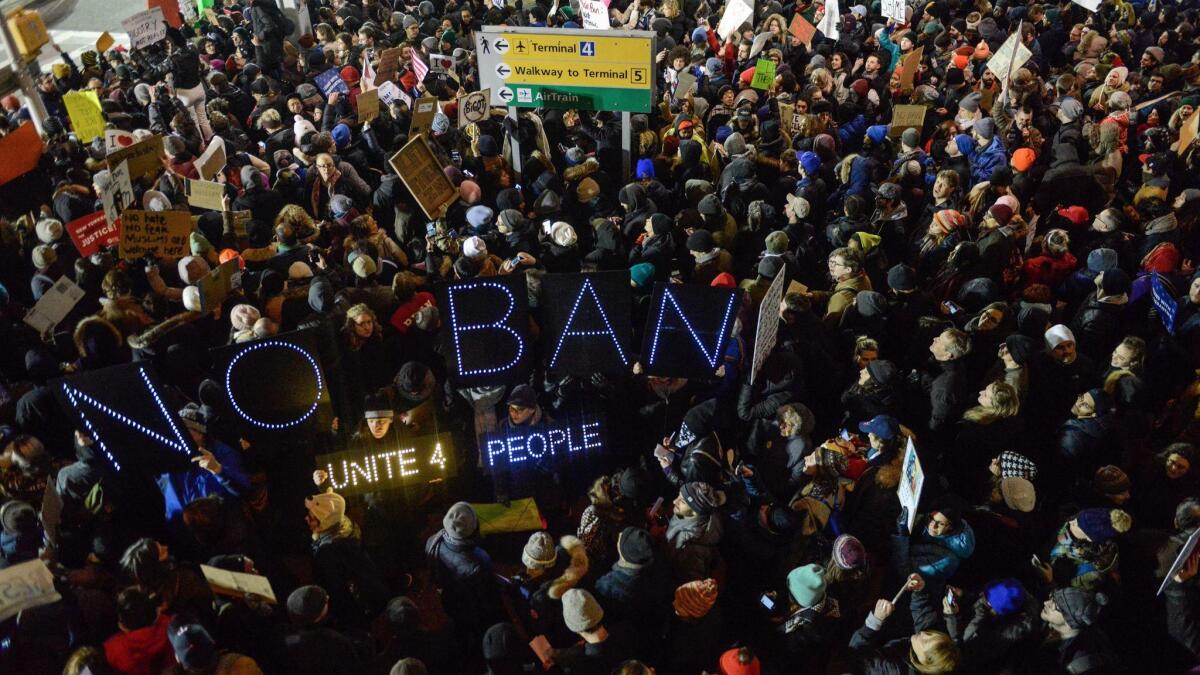
Barring individuals fleeing persecution from entering the United States is simply inhumane. Adding irony to injury, Trump’s executive order was issued on Holocaust Remembrance Day, which should have been an occasion to atone for turning away refugees during the 1930s—some of whom then died in concentration camps. For example, in 1939, the United States turned away the St. Louis, a boat filled with refugees, many of them German Jews. According to the United States Holocaust Memorial Museum, 254 passengers from the St. Louis died in the Holocaust.
— Erwin Chemerinsky
- Share via
Lyft pledges to donate $1 million to ACLU following Trump’s immigration order
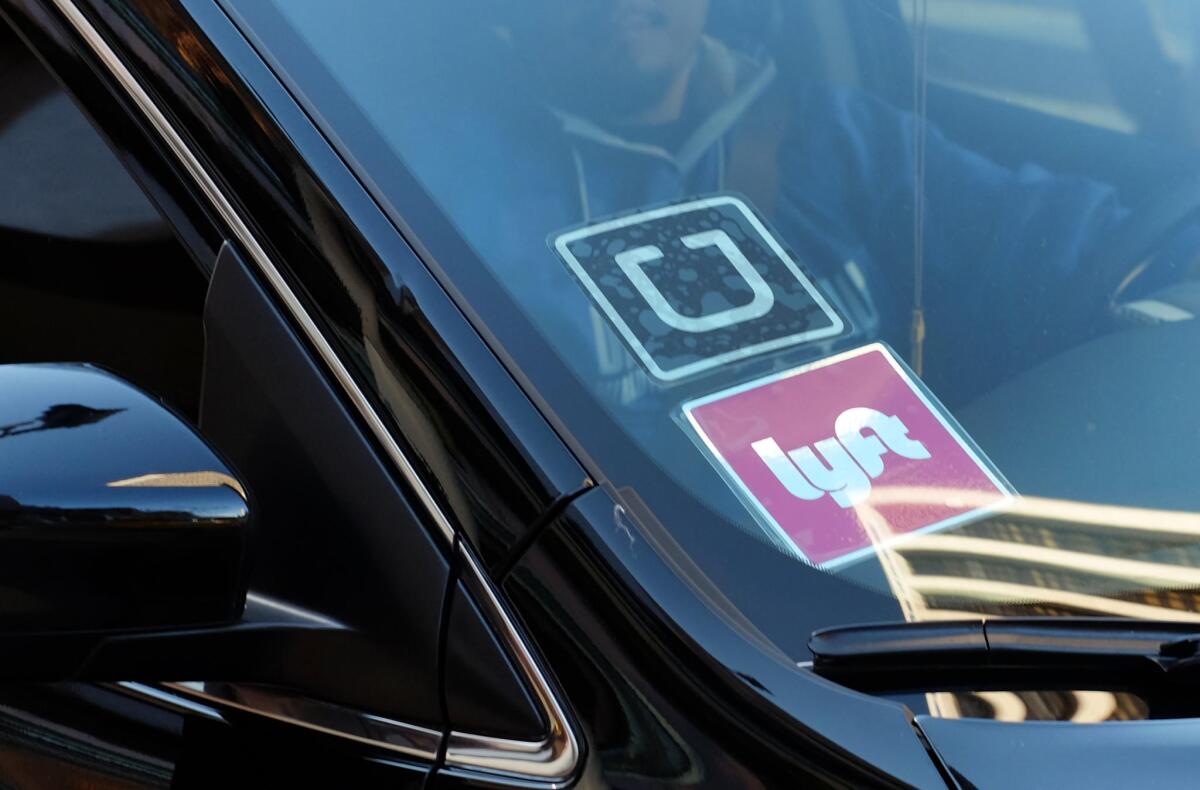
Tech executives had been mostly quiet for the first week of Donald Trump’s presidency — but that changed after his controversial executive order restricting refugees and immigrants from seven Muslim-majority countries.
Executive after executive spent Saturday tweeting and posting messages to Facebook decrying the administration’s actions. Lyft co-founders John Zimmer and Logan Green went a step further: On Sunday, they announced they would donate $1 million to the American Civil Liberties Union over the next four years.
“Banning people of a particular faith or creed, race or identity, sexuality or ethnicity, from entering the U.S. is antithetical to both Lyft and our nation’s core values,” the co-founders wrote in an email to Lyft customers. “We stand firmly against the actions, and will not be silent on issues that threaten the value of our community.”
We stand firmly against the actions, and will not be silent on issues that threaten the value of our community.
— John Zimmer and Logan Green
The donation is to help the ACLU “defend our constitution.”
The decision came a day after Uber Chief Executive Travis Kalanick spoke out against the order. But Lyft appears to be the one reaping the public relations benefits, at least on social media.
Uber has taken flak for Kalanick’s role on a business panel advising Trump. And the company’s decision to advertise via Twitter its continued operations on Saturday at New York’s John F. Kennedy International Airport amid a taxi strike against the immigration ban was seen by some as undermining the protest. The hashtag #DeleteUber was trending on Twitter on Sunday.
The two San Francisco-based ride-hailing companies have engaged in a vicious battle for 4 1/2 years for drivers and customers. Uber has a larger market share and war chest. In its fight for new drivers and customers, Lyft has spent millions marketing the ways in which it is different from Uber. Saturday’s events — and the ensuring #DeleteUber hashtag — could play into that branding.
In an email to employees, which was later made public, Kalanick spelled out a plan to assist Uber employees and drivers affected by the travel ban, but his denouncement of the ban took a more conciliatory tone than Lyft’s.
“Ever since Uber’s founding we’ve had to work with governments and politicians of all political persuasions,” Kalanick wrote. “In some cases we’ve had to stand and fight to make progress, other times we’ve been able to effect change from within through persuasion and argument… This is why I agreed in early December to join president Trump’s economic advisory group.”
Kalanick said he would discuss the matter when the panel convenes for its first meeting this week.
- Share via
Some Republicans worry that Trump’s refugee and vetting policies go too far
Senate Majority Leader Mitch McConnell said Sunday that the U.S. should not impose a religious test on people seeking to enter the country, in part because to do so would alienate key allies in the fight against terrorism.
“Some of our best sources in the war against radical Islamic terrorism are Muslims, both in this country and overseas,” McConnell (R-Ky.) said in a morning interview with ABC’s Martha Raddatz.
McConnell praised President Trump for ramping up the vetting of people trying to enter the country, but warned against singling out Muslims for exclusion.
“We need to be careful as we do this,” McConnell said. “We don’t have religious tests in this country.”
The remarks came amid a clamor over Trump’s new temporary ban on arrivals from seven predominantly Muslim countries. As authorities detained travelers from those countries at airports around the U.S. this weekend, crowds gathered to protest what they see as exclusion based on religion, in violation of basic American principles.
Aides to Trump defended his policy on Sunday. White House senior counselor Kellyanne Conway told FOX journalist Chris Wallace that the extra vetting is aimed only at promoting security, and that if travelers are not dangerous they can expect to be released “in due course.”
“It’s temporary,” she said of the airport detentions, “and it’s just circumstantial.”
But fellow Republicans are voicing warnings to the president, too, among them Ohio Sen. Rob Portman. He agreed with Conway that Trump’s new order does not qualify as a ban on Muslims, but he did question whether it was “properly vetted” and being implemented in an orderly way.
The order is “an extreme vetting proposal that didn’t get the vetting it should have had, and as a result in the implementation we’ve seen some problems,” Portman told CNN’s Jake Tapper. “In my view, we ought to all take a deep breath.”
Likewise, Arizona Republican Sen. Jeff Flake in a morning statement called it “unacceptable when even legal permanent residents are being detained or turned away at airports and ports of entry.” National security depends on not “ascribing radical Islamic terrorist views to all Muslims,” he said.
- Share via
Trump’s revamp of top advisors reflects the rise of controversial aide Steve Bannon
President Trump is revamping the advisory circle of national security experts in his White House, and the new configuration reflects the sharp rise of his controversial aide Steve Bannon.
Bannon, Trump’s chief strategist, is now invited to sit in on all meetings of the National Security Council, while key experts like the director of national intelligence and chairman of the joint military chiefs will only participate when specifically summoned.
The decision is raising questions in national security circles. Bannon is the former head of the right-wing Breitbart News website who declared last week that the news media should be considered “the opposition party” during the Trump era. Bannon was a key link for Trump with the nationalist “alt-right” movement during the campaign.
“Stone-cold crazy,” is how former Obama national security advisor Susan Rice described the decision in a tweet on Sunday, sarcastically asking, “Who needs military advice or intell to make policy on ISIL, Syria, Afghanistan, DPRK?” using acronyms for Islamic State and North Korea.
But Trump’s top spokesman defended the decision on Sunday morning, telling ABC’s Martha Raddatz that Trump is simply trying to “streamline” the decision-making process and cut down on the bureaucracy.
Bannon is a former Naval officer, said White House Press Secretary Sean Spicer, adding that it’s only right for the president’s top strategist to “come in and talk about what the strategy is going forward.”
Bannon has a “tremendous understanding of the world,” said Spicer.
- Share via
One U.S. commando dead, four wounded in raid on Al Qaeda in Yemen
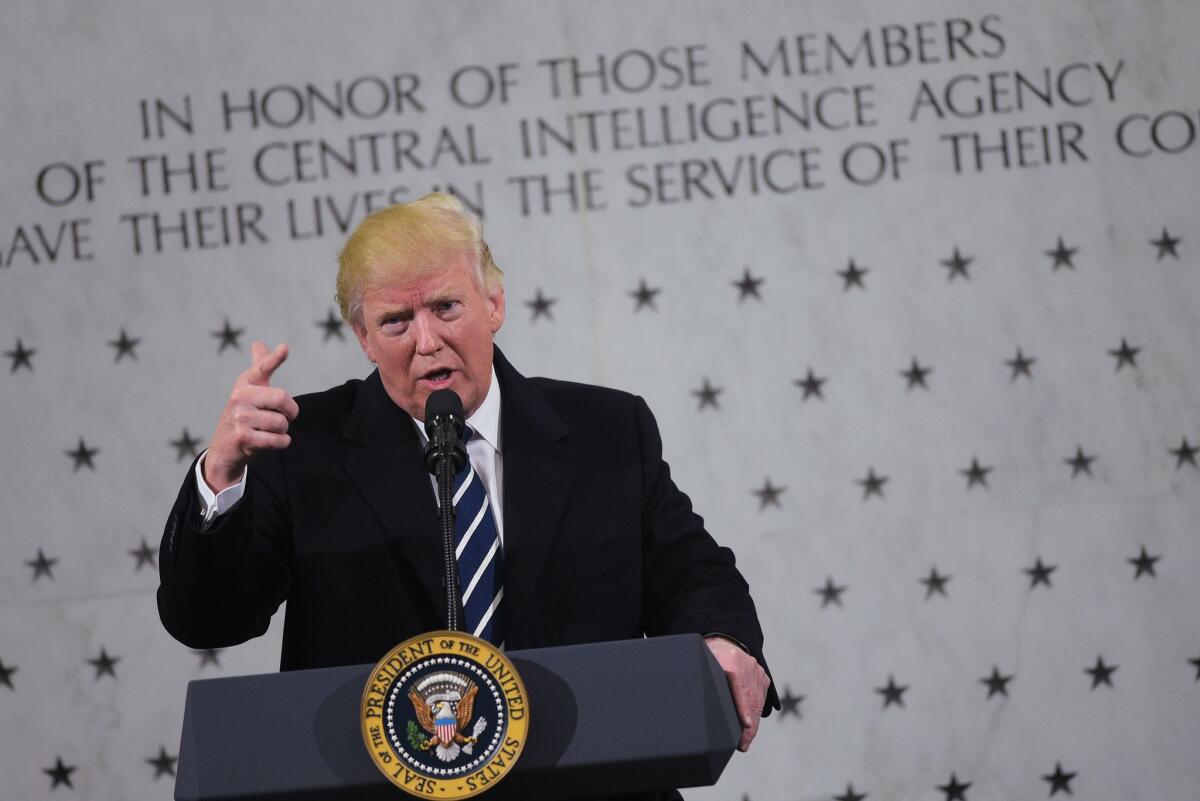
A U.S. special operations commando was killed and three others injured in a firefight during a predawn raid on Al Qaeda fighters in central Yemen, according to the U.S. military.
The raid marked the first known counterterrorism operation and first confirmed combat fatality under President Trump.
“We are deeply saddened by the loss of one of our elite service members,” Gen. Joseph Votel, the head of the U.S. Central Command, said in a statement. “The sacrifices are very profound in our fight against terrorists who threaten innocent peoples across the globe.”
As the U.S. forces began their assault on the Al Qaeda compound in Shabwa province, they engaged in an intense firefight left at least 14 militants dead, said a U.S. official, who wasn’t authorized to speak publicly on the secret mission. One commando was killed and three others wounded during the battle, which lasted about an hour.
During the operation, U.S. troops grabbed a cache of the militants’ laptops, cellphones and other materials, which was what U.S. commanders were seeking in the rare on-the-ground siege against Al Qaeda in the Arabian Peninsula, known as AQAP. The U.S. military typically relies on drone strikes against the group.
U.S. Central Command, which oversees military operations in the Middle East, said in a statement the capture of information “will likely provide insight into the planning of future terror plots.”
During the raid, a V-22 Osprey tilt-rotor aircraft that was assisting in the operation crash-landed at a nearby location, resulting in an additional service member injury, a U.S. official said.
The aircraft, which was sent to evacuate the wounded, was unable to fly after the landing. U.S. warplanes later destroyed it.
Local reports said more than a dozen civilians were killed in the operation. Graphic photos of the dead, allegedly victims from the raid, were circulating social media. Among those reportedly killed was the 8-year old daughter of Anwar al-Awlaki, the American-born Al Qaeda leader who was based in Yemen and killed in a 2011 drone strike, according the SITE Intelligence Group.
U.S. military officials said they believe no civilians were killed, although the results of the mission were still being examined.
The number of Al Qaeda fighters killed and U.S. service members could rise when more information becomes available, U.S. military officials acknowledged.
Al Qaeda in the Arabian Peninsula has flourished in Yemen since 2014 amid the ongoing chaos of a multi-sided civil war, seizing cities and towns, looting banks, and raising millions of dollars by extorting companies, imposing taxes and export duties, and smuggling.
U.S. intelligence agencies consider AQAP one of Al Qaeda’s most dangerous offshoots because of its repeated attempts to attack Western targets.
The group attempted to destroy a U.S.-bound airliner over Detroit in 2009, tried to take down two cargo planes headed to Chicago in 2010, and claimed responsibility for the mass shooting that killed 12 people at the satirical magazine Charlie Hebdo in Paris in 2015.
The raid Sunday is just the latest in the U.S. military’s targeted couterterrorism against the group. U.S. drones launched three airstrikes on each day from Jan.20 to 22, all in Bayda province, that killed five militants, U.S. officials said.
Two earlier strikes, on Dec. 29 and Jan. 8, killed three other operatives.
6:50 a.m.: This article was updated with more background.
- Share via
Federal judge blocks deportations under Trump’s ‘extreme vetting’ order for refugees and others with valid visas
After a day of chaos at airports around the world, a federal judge in Brooklyn on Saturday night stayed deportations under President Trump’s executive order barring citizens of some Muslim countries from entering the United States.
U.S. District Judge Ann M. Donnelly ordered a halt to any removal of refugees or others who hold valid visas to enter the United States—meaning those who have arrived at U.S. airports from the seven predominantly Muslim countries named under the President’s executive order can remain, for now.
The judge did not rule on the legality of the executive order, nor did she say that others who have not yet arrived in the U.S. can be allowed to proceed.
The ruling came in response to a petition filed by the American Civil Liberties Union on behalf of two Iraqis detained at John F. Kennedy International Airport: Hameed Khalid Darweesh, who was a translator for the U.S. military, and Haider Alshawi, who was on his way to join his wife, who had worked for a U.S. contractor in Iraq.
ACLU attorneys argued that returning either petitioner could cause “irreparable harm” by exposing them and their families to retaliation from extremists.
The two lead plaintiffs were held by authorities and threatened with deportation, even though both “assert a fear of returning to their countries, and if they are not admitted pursuant to their valid entry documents, [they] seek an opportunity to pursue asylum,” the lawyers argued in the emergency petition.
“This ruling preserves the status quo and ensures that people who have been granted permission to be in this country are not illegally removed off U.S. soil,” said Lee Gelernt, deputy director of the ACLU’s Immigrants’ Rights Project, who argued the case.
The order appears to affect the 100 to 200 people who have been detained in transit to the United States. While the order will prevent them from being sent home, it is less clear whether they will have to remain in detention while their asylum cases are being decided.
Darweesh was released earlier in the day.
Thousands of New Yorkers had rushed to John F. Kennedy Airport, which is located in Queens within the court’s jurisdiction, earlier in the day to protest the detention of the passengers.
- Share via
Immigration attorneys seeking to help airport travelers in Los Angeles blocked by visa ban
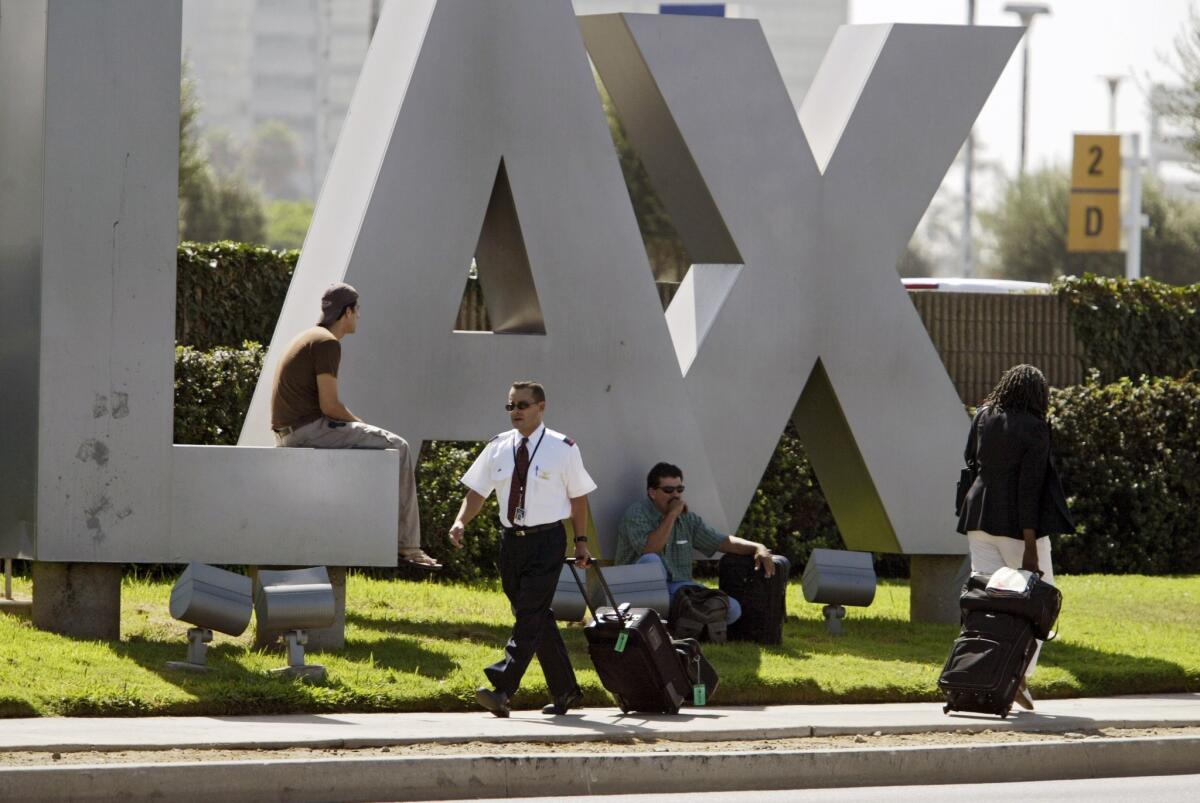
At least 10 to 15 immigration attorneys have gathered at the Tom Bradley international terminal at LAX to help travelers, mostly from Iran, who have been detained, one of the attorneys said.
Attorneys have not yet been able to determine the number of fliers detained, as U.S. Customs and Border Protection officials are not allowing attorneys or families any communication with the detainees, said immigration attorney Jordan Cunnings.
“We’re literally walking around asking people, are you waiting for someone who has been detained?” said Cunnings, describing a scene of worried family members who had arrived bearing flowers and welcome signs for their loved ones.
Some of the detained travelers included green card holders, tourists, people with children and people with medical problems, Cunnings said.
One detained traveler was an Iranian woman who’d held a green card in the U.S. for five years and whose citizenship swearing-in ceremony is in two weeks, Cunnings said. The woman has an 11-month-old child with her who is an American citizen.
“People don’t have phone access or communication access to the people waiting for them, or their attorneys,” Cunnings said. “It’s just really heartbreaking.”
- Share via
Thousands at JFK airport in New York protest new visa and refugee suspensions
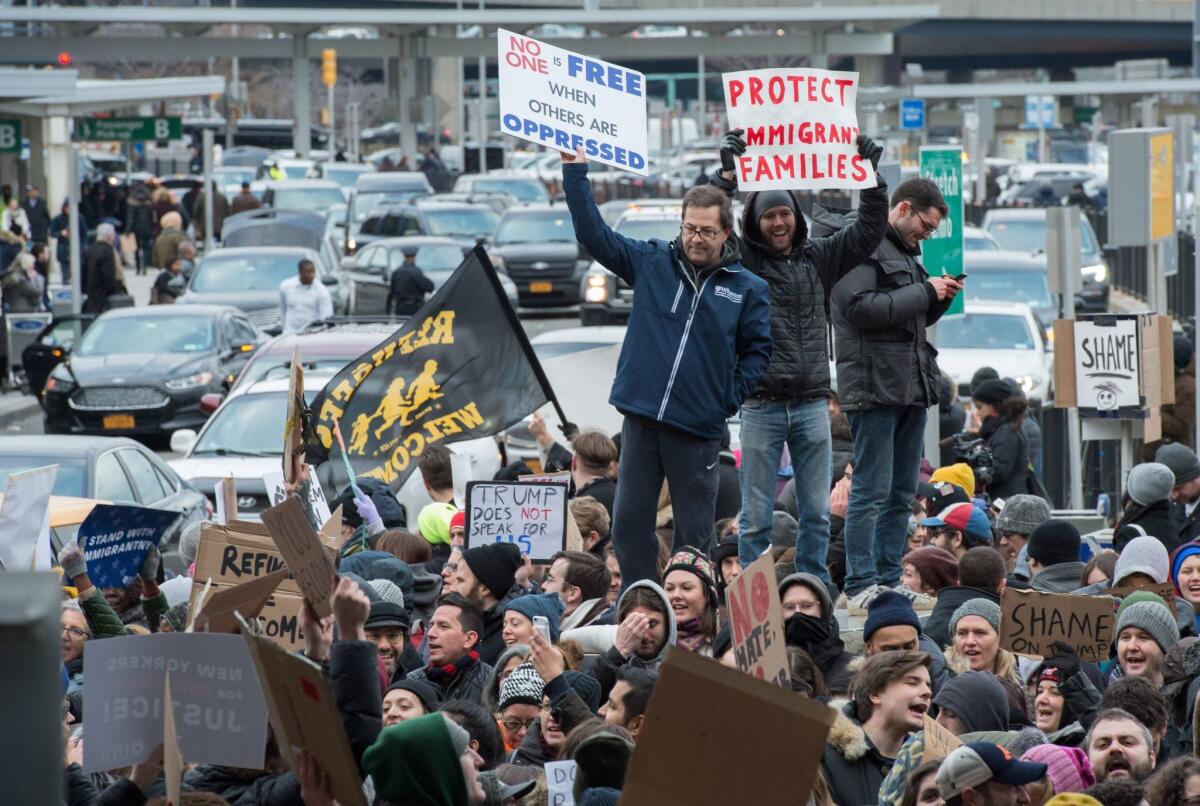
Thousand of New Yorkers headed out to John F. Kennedy airport Saturday evening to protest President Trump’s new executive order turning back refugees and other visitors from seven predominantly Muslim countries.
Word of the spontaneous demonstration was spread across social media, with activists like filmmaker Michael Moore calling out “Everybody in NYC area--- head to JFK Terminal 4 NOW.” By late afternoon, it appeared that more than 2,000 had heeded the call to protest, to the dismay of airport security struggling to keep the terminal clear for travelers.
One group chanted, “Let them in.” Another read out loud from the Emma Lazarus poem inscribed in the base of the Statue of Liberty, “Give me your tired, your poor, your huddled masses yearning to breathe free ....’’
Earlier in the day, 12 people from countries on the suspension list were taken into detention, although one of them, an Iraqi who had worked as a translator for the U.S. military, was later released and allowed to enter the U.S.
“This is humanity, this is the soul of America This is what pushed me to leave my country and move here,’’ the translator, Hameed Khalid Darweesh, told reporters.
- Share via
Iran says it will retaliate for U.S. moves to suspend visas for citizens of Iran and six other mainly Muslim countries
Iranian officials called the new U.S. limits on refugees and travelers from several predominantly Muslim countries a “clear insult to the Islamic world” and predicted the ban would be “a great gift to extremists and their supporters.”
In a statement on the Foreign Ministry website, the government of Iran vowed unspecified retaliatory measures and emphasized that the international community “needs dialogue and cooperation to address the roots of violence and extremism in a comprehensive and inclusive manner.”
Iran is one of seven countries—also including Yemen, Sudan, Somalia, Libya, Syria and Iraq—whose residents are temporarily prevented from entering the United States until a new “extreme vetting” procedure can be put into place.
The White House order signed Friday also blocks all refugees from entering the U.S. for 120 days and suspends the acceptance of refugees from war-torn Syria indefinitely.
Iran’s foreign ministry said the government in Tehran “will take proportionate legal, consular and political action” in response to the U.S. moves “until the time of the removal of the insulting restrictions” ordered in Washington.
In a series of tweets, Foreign Minister Javad Zarif made the point even more strongly: “Collective discrimination aids terrorist recruitment by deepening fault-lines exploited by extremist demagogues to swell their ranks,” he said.
- Share via
Trump issues more executive actions on national security
President Trump kept up his frenetic pace of executive action on Saturday by signing new directives that put his own imprint on the national security apparatus.
Trump signed executive actions to reorganize the National Security Council and to direct the joint chiefs of staff to present him with a plan to defeat the Islamic State terror organization, according to White House officials who have seen the documents and described their content to reporters.
He also issued a five-year ban preventing people who work for him from lobbying his administration after they leave it.
The action came right on the heels of a controversial executive order on Friday closing U.S. borders to refugees from around the world and temporarily halting immigration from several mostly Muslim countries.
Despite the number of executive actions in the past few days, aides to the president said they were being done carefully and after weeks of consideration.
“Everyone who needed to know was informed,” one official said of Friday’s executive order.
As he signed the executive actions, Trump defended the Friday directive. It is “not a Muslim ban,” he said. “It’s working out very nicely.”
*
- Share via
Iranian filmmaker Asghar Farhadi’s attendance at Academy Awards in doubt under Trump’s travel ban
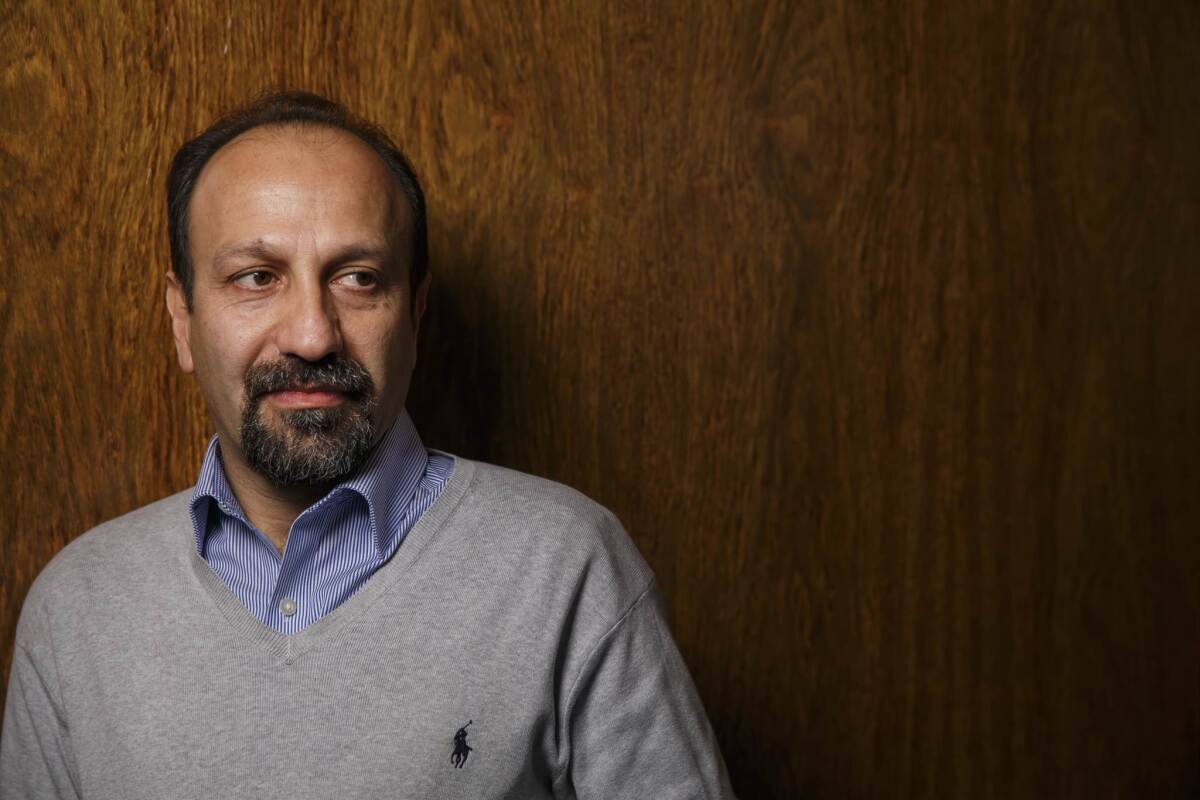
Confusion erupted Saturday in the the wake of President Trump’s executive order banning travel to the U.S. from several Muslim-majority countries, and its potential impact on the ability of Iranian filmmaker and Oscar nominee Asghar Farhadi to attend next month’s Academy Awards ceremony.
Farhadi, whose latest film “The Salesman” is nominated for best foreign language film, was considered likely to be barred under the new order, as president of the National Iranian American Council Trita Parsi tweeted on Friday: “Confirmed: Iran’s Asghar Farhadi won’t be let into the US to attend Oscar’s.”
The tweet followed Trump’s order, which banned travel to the U.S. over the next 90 days from Iran, Iraq, Libya, Somalia, Sudan, Syria and Yemen. The abrupt move also suspended all refugee arrivals from Syria.
Parsi reported that Farhadi has only an Iranian passport does not possess a U.S. “green card,” though he could theoretically apply for an artistic exception to the ban.
“The law is very clear and I’ve heard confirmation that he’s not coming,” Parsi told the Los Angeles Times on Friday night.
According to a tweet Saturday from a correspondent for BBC Persian, the filmmaker’s office said there was no “legal obstacle” for him to visit the U.S. for the Oscars, but that Farhadi has not yet decided if he wants to attend.
Calls to representatives for Farhadi, and the Academy of Motion Picture Arts and Sciences were not immediately returned.
“The problem that we’re having right now is that the executive order is so ambiguous,” said Parsi, whose organization is the largest nonprofit of its kind representing the Iranian American community. “This administration, to be kind, is rather amateurish in how they’re sending out information. We hope that in the next couple of days they clarify exactly what they want these rules to mean and how they should be interpreted, because they cast an extremely wide net.”
Taraneh Alidoosti, the lead actress in “The Salesman,” announced in the wake of the executive order that she would not attend boycott the Academy Awards. “Trump’s visa ban for Iranians is racist,” Alidoosti wrote. “Whether this will include a cultural event or not, I won’t attend the #AcademyAwards 2017 in protest.”
Farhadi, whose films are not overtly political, won the Academy Award for foreign language film in 2012 for “A Separation.” In an interview with The Times earlier this month, he spoke optimistically about the prospects for change in his country, where he continues to work and reside.
“In appearance, everything is becoming modern in Iran,” he said. “Buildings and skyscrapers are going up. Old buildings are being torn down. Arthur Miller is staged there. There’s cinema. But once you push that back, you see Iran’s culture and tradition beneath.”
Times staff writers Jen Yamato and Jeffrey Fleischman contributed.
- Share via
Read what Russia had to say about Vladimir Putin’s chat with President Trump
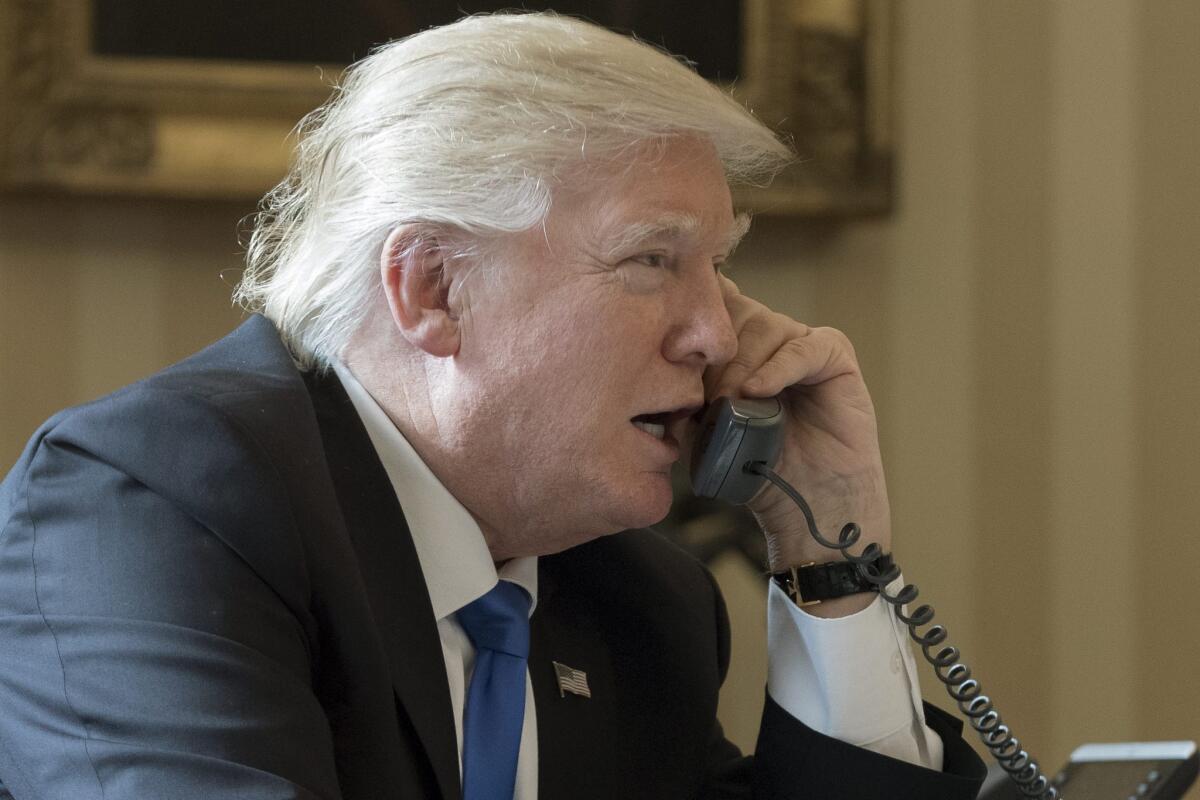
For years Moscow has complained that Washington does not treat it as an equal. But in a statement released after President Trump and Russian Vladimir Putin talked by phone for the first time, the tone was decidedly upbeat.
Here’s the Russian government’s statement on the phone call:
“During the meeting, both sides had shown a disposition to actively work together on stabilization and development of Russian-American interaction -- in a constructive, equal and mutually beneficial basis.
“They discussed in detail such current international issues as the fight against terrorism, the situation in the Middle East, the Arab-Israeli conflict, the sphere of strategic stability and [nuclear] non-proliferation, the situation around the Iranian nuclear program and the Korean Peninsula. They also touched upon the main aspects of the crisis in Ukraine.
“It was agreed to establish a partnership in all these and other areas. They also highlighted the priority of joint efforts in the fight against the main threat -- international terrorism.
“The presidents called for establishment of a real coordination of U.S. and Russian actions to defeat the Islamic State and other terrorist groups in Syria. Vladimir Putin and Donald Trump agreed to organize a possible date and venue for their personal meeting. The leaders agreed to maintain regular personal contacts. The conversation was held in a positive and businesslike manner.”
- Share via
Trump’s phone call with Putin comes amid European anxiety over the state of relations
It’s a day of world leader calls for President Trump, who held the first officially scheduled telephone conversation of his presidency with Russian President Vladimir Putin on Saturday.
Trump went into that call with high hopes for a “fantastic relationship,” as he put it the day before.
But longstanding American allies aren’t so upbeat about how things might now be heading in U.S.-Russian relations, and what it means for the transatlantic alliance. Trump’s Saturday to-do list also includes calls with the German chancellor and French president.
- Share via
Outpouring of criticism over Trump’s refugee ban from Democrats in Congress as GOP stays silent
Congressional reaction to President Trump’s orders banning refugees and immigrants from some Muslim countries from entering the country was swift and overwhelmingly critical among Democrats, while Republican leaders remained largely silent or accepting.
California Sen. Dianne Feinstein said Trump had chosen a “dark path,” while both Senate Minority Leader Charles Schumer of New York and House Democratic Leader Nancy Pelosi of San Francisco said the Statue of Liberty had “tears.”
House Speaker Paul D. Ryan (R-Wis.), who had opposed Trump’s proposed Muslim ban in 2016, accepted the president’s move.
“President Trump is right to make sure we are doing everything possible to know exactly who is entering our country,” Ryan said in a statement.
Other Republicans made comments and tweets marking Holocaust Remembrance Day, while saying nothing of Trump’s actions on the same day.
Democrats warned that this moment would be a mark on the nation’s history.
“Shame. Shame. Shame,” tweeted Sen. Brian Schatz of Hawaii. “I feel sick.”
Feinstein particularly noted Trump’s imposition of a religious test by allowing Christians fleeing persecution to enter the country, but not others.
“To me, this an unbelievable action. It’s one thing to see that an individual is properly vetted. It’s an entirely different matter to say that because someone comes from a particular country or is a member of a particular faith that he or she has no access to this country,” she said.
“Let us recall the images of the body of Alan Kurdi, a 3-year-old Syrian boy, washed up on a beach and remember the staggering human toll of this crisis. There is no legitimate national security reason to ban refugees — the vast majority of whom are women and children who have experienced absolute horror.”
“I very much regret that the president has chosen this dark path for our country, Feinstein said.
- Share via
Unknown number of U.S. permanent residents stuck overseas as a result of Trump’s immigration ban
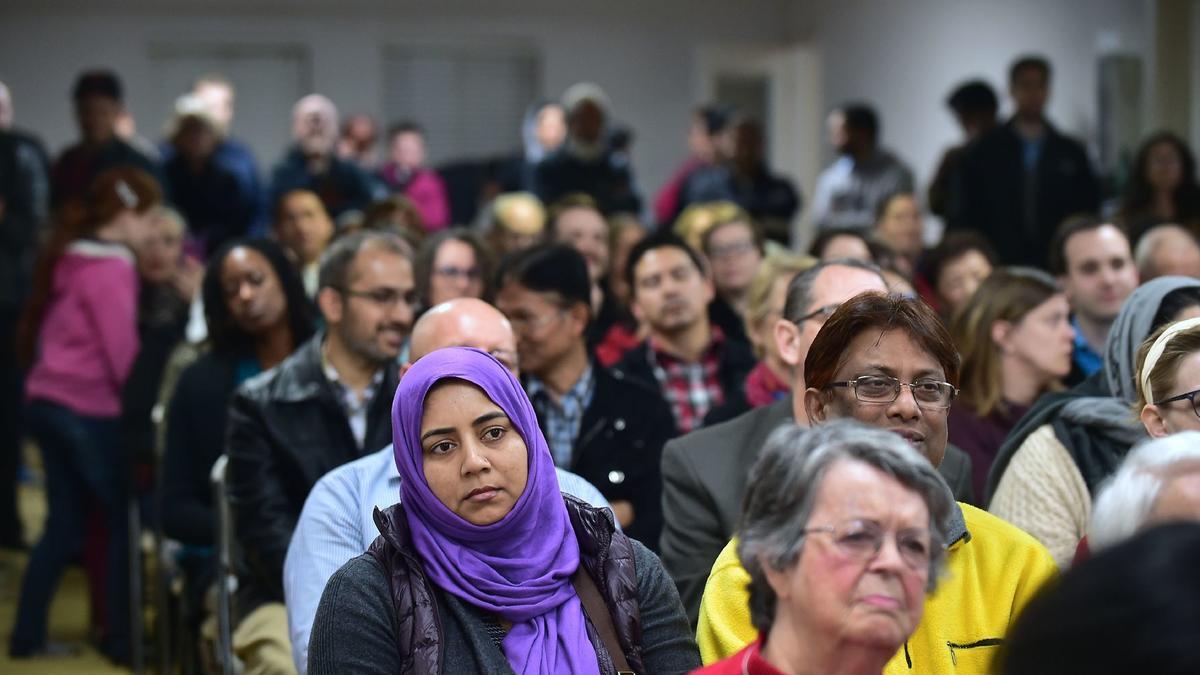
An undetermined number of longtime U.S. residents have been stranded overseas as a result of President Trump’s executive order temporarily blocking visas from seven countries in the Middle East and North Africa.
All visa holders from those seven countries are now barred entry to the U.S., including lawful permanent residents, also known as green card holders, people with U.S. work visas and other types of visas, according to a senior U.S. immigration official. The official spoke on condition of anonymity to discuss internal deliberations.
Some of the affected countries, such as Yemen and Libya, have relatively few nationals who are U.S. permanent residents or visa holders. But a large number of Iranians have permanent residency in the U.S., as do smaller numbers from some of the other countries on the list, which includes Iraq, Syria, Somalia and Sudan.
Trump’s executive order, issued Friday, immediately affected longtime foreign residents of the U.S. who were overseas at the time the order was signed, as well as any high-skilled tech workers or other work-visa holders from those seven countries caught outside the U.S. as of Friday.
Lawyers at the Department of Homeland Security are examining Trump’s executive order and drafting instructions for border officials, the official said.
Eventually, the administration may set up a way for some visa holders to apply for a waiver from the ban, but that is still being deliberated and will take time to set up, the official said.
Lawyers at DHS are scrambling to understand the order and parse out what it means for procedures at airport checkpoints and ports of entry around the country.
Most senior DHS officials were not aware of the coming changes before they were released Friday. Immigration and customs officers are struggling to figure out which incoming travelers to let in while at the same time keep up with the normal flow of travel, the senior US immigration official said.
11:17 a.m.: This article was updated with more background.
- Share via
Netanyahu tweets his support for Trump’s border wall
- Share via
Trump has flurry of phone calls scheduled today with world leaders
President Trump is planning phone calls today with five world leaders as he begins to shape his administration’s foreign policy and establish key relationships.
At 9 a.m Pacific time, Trump is expected to speak with Russia President Vladimir Putin.
Trump said Friday that having Russia as an ally “would be an asset.” But many in the U.S. and abroad have been alarmed by Trump’s unusually friendly references to Putin, whose annexation of Crimea in 2014 led to sanctions by the U.S. and others.
Trump’s new restrictions on allowing refugees into the U.S. were likely at the top of the agenda during calls with German Chancellor Angela Merkel and French President Francois Hollande.
Earlier Saturday, Trump and Japan’s Prime Minister Abe spoke about working together to confront the threat posed by North Korea and deepening bilateral trade ties.
The president will end the day with a call to Australian Prime Minister Malcolm Turnbull.
- Share via
Trump signs executive order to review military preparedness

The Trump administration has instructed the Pentagon to carry out a top-to-bottom review of the nation’s military, and draw up a list of plans to upgrade equipment, improve training, and address current and future threats with an increased budget.
The executive action, signed Friday during President Trump’s first visit to the Pentagon, follows through on a campaign pledge to build up the military, which Trump says was ignored under the Obama administration.
“I’m signing an executive action to begin a great rebuilding of the armed services of the United States, developing a plan for new planes, new ships, new resources and new tools for our men and women in uniform,” he said in a brief address to a crowd made up of civilians and uniformed service members.
“Our military strength will be questioned by no one,” he said. “Neither will our dedication to peace.”
Under a section called “rebuilding the U.S. armed forces,” Pentagon officials are called upon to examine U.S. nuclear forces to determine the role of nuclear weapons in U.S. security strategy. The so-called Nuclear Posture Review has taken place with each of the last three presidents.
The military must also develop plant to strengthen missile defense against foreign threats. The U.S. has 30 interceptors in Alaska and California to counter missile attacks. The system has had a bad track record in testing, with the interceptors hitting their mark just about half the time.
Defense Secretary James N. Mattis is to conduct a “readiness review” within 30 days that will assess military needs.
The order calls for the Pentagon to work with the Office of Management and Budget on a “ budget amendment for military readiness, including any proposed reallocations” for this year.
It is an unsurprising move by Trump, who as a candidate vowed to boost Pentagon spending for more soldiers, ships and aircraft, and called for a new strategy for cyberdefense.
In September, Trump called for adding more than 80,000 Army soldiers to get to 540,000 active-duty soldiers. He wants to boost active-duty Marines to 200,000 from current 182,000. He also wants increase the Navy’s ships from 287 to 350, and add to the Air Force’s fighter jet fleet by two dozen to 1,200 aircraft.
Mackenzie Eaglen, a defense analyst at the American Enterprise Institute, found that these changes could add up to $300 billion over the next four years. The Pentagon’s budget request for fiscal 2017 is around $584 billion.
During Trump’s trip, Vice President Mike Pence conducted a ceremonial swearing-in of Mattis, whose first day on the job was Saturday. Trump briefly addressed a crowd made up of civilians and uniformed service members, calling them the “backbone” and “spirit” of the nation.
Trump met with Mattis, Joseph F. Dunford Jr., chairman of the Joint Chiefs of Staff, and the chiefs of all the military branches in a windowless Pentagon conference room, known as “the tank.” The hour-long discussion centered on the Islamic State, but also involved the range of worldwide challenges the U.S. military faces in the years ahead.
The president has yet to define what his policy is toward today’s major issues: battling Islamic State in Iraq and Syria, a renewed insurgency in Afghanistan, Russian aggression in Ukraine and a growing Chinese presence in the South China Sea.
- Share via
A government Wells Fargo complaint website has vanished. Sen. Elizabeth Warren wants to know why
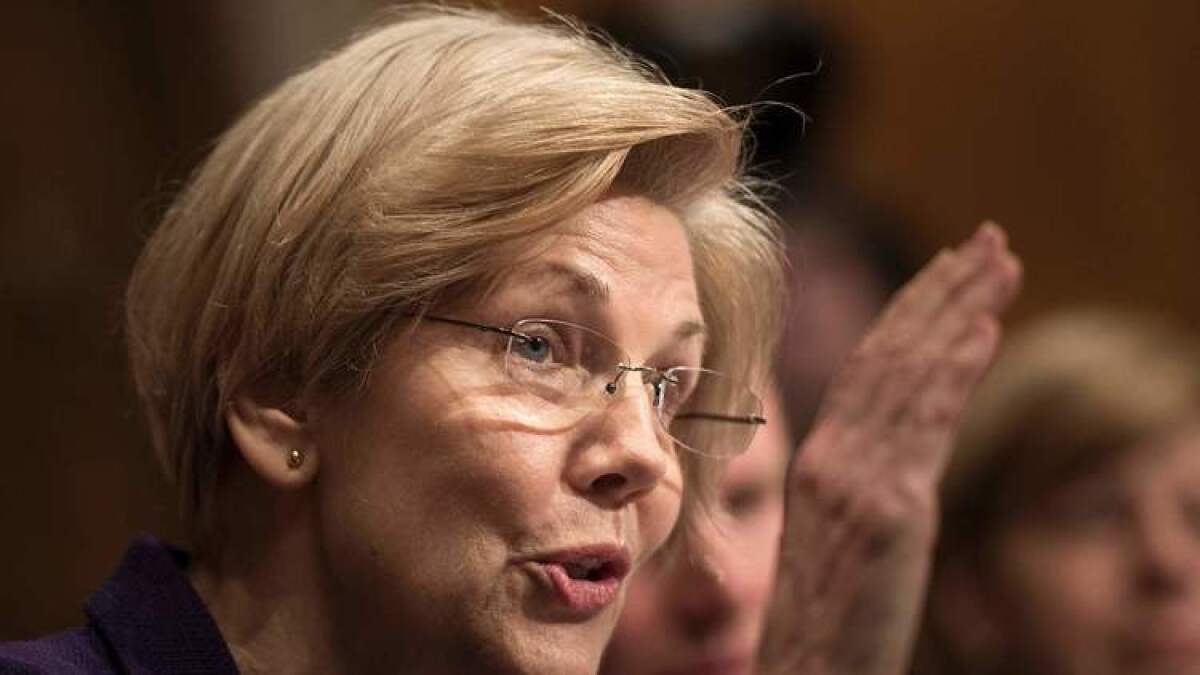
Sen. Elizabeth Warren wants the acting Labor secretary to explain why a website for complaints from Wells Fargo & Co. employees has disappeared, and she has requested an update on the department’s investigation into the bank’s unauthorized-accounts scandal.
“Taking down this website enables Wells Fargo to escape full responsibility for its fraudulent actions and the department to shirk its outstanding obligations to American workers,” Warren (D-Mass.) wrote Thursday to Edward Hugler, a deputy assistant secretary and 39-year department veteran who has been acting secretary since President Trump took office.
The page was created in September after former Labor Secretary Tom Perez began a “top-to-bottom review” of how the bank treated employees as it pushed aggressive sales quotas that led to the creation of as many as 2 million accounts opened without customers’ consent.
- Share via
‘Extreme vetting’ and a halt to refugees: Trump is poised to make sweeping changes
President Trump is poised to temporarily halt the nation’s refugee program and usher in the most sweeping changes in more than 40 years to how the U.S. welcomes the world’s most vulnerable people.
Trump’s actions, which could come as soon as this afternoon, would block all refugees from entering the U.S. for 120 days and suspend the acceptance of refugees from war-torn Syria indefinitely.
He would also block visa applicants entirely from a list of countries with counterterrorism concerns, including Iraq, Iran, Libya, Somalia, Sudan and Yemen, until a new “extreme vetting” procedure for visa applicants could be launched.
The U.S. has admitted more than 3.3 million refugees since 1975, and allowed more than 80,000 refugees in the last year alone. Under Trump’s plan, those numbers would plummet to a trickle, except for a narrow group of “religious minorities” that would include Christians fleeing largely Muslim countries.
- Share via
Donald Trump says he believes torture works but will defer to his Defense secretary
President Trump said Friday he still believes torture is an effective tool in the war on terror but would let Defense Secretary James Mattis’ opposing views on the issue “override” his own.
Though Trump has presented himself as a muscular leader, his public statement that a Cabinet secretary’s views on a key issue would override his own is highly unusual for a president.
Mattis “has stated publicly that he does not necessarily believe in torture or waterboarding or however you want to define it,” Trump said during a joint news conference with British Prime Minister Theresa May. “I don’t necessarily agree but I would tell you that he will override, because I’m giving him that power.”
“I happen to feel that it does work,” Trump added. “I’ve been open about that for a long period of time. But I am going with our leaders. And we’re going to win, with or without.”
European powers and human rights groups have condemned waterboarding and other outlawed torture techniques. Trump’s newly formed National Security Council has circulated draft memos that resurrected that debate.
- Share via
Donald Trump speaks with Mexican President Peña Nieto amid diplomatic standoff
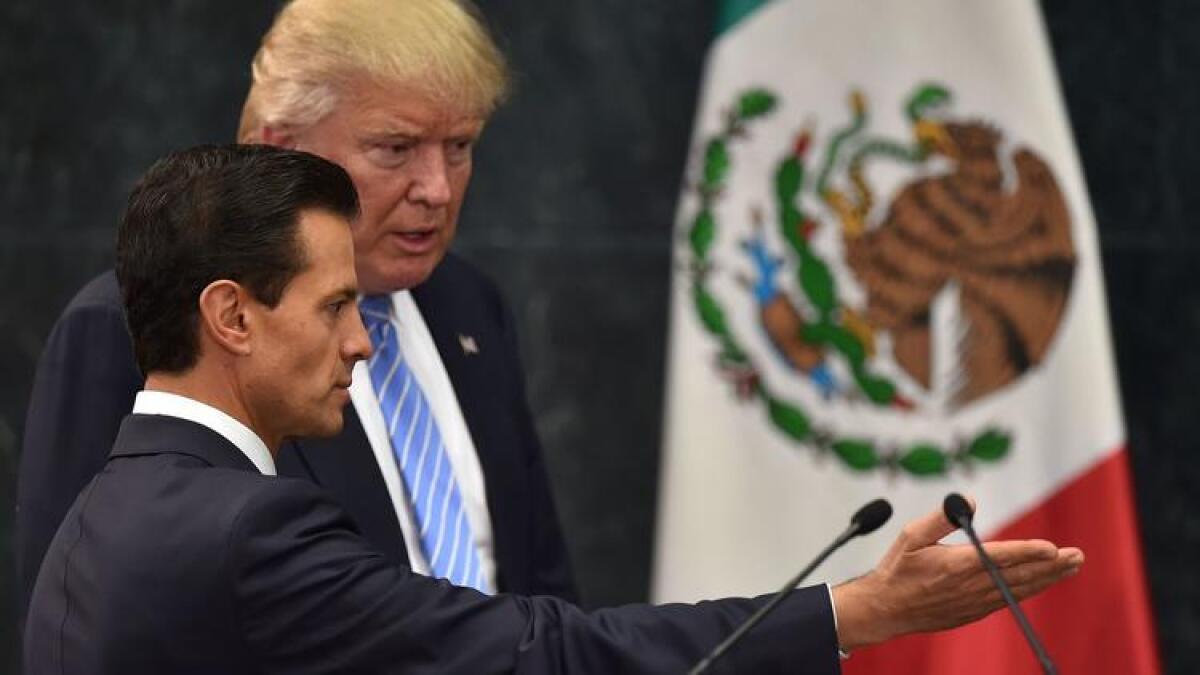
President Trump spoke for an hour by telephone Friday morning with Mexican President Enrique Peña Nieto, signaling a potential thaw in a stand-off that heated to a boil Thursday.
The White House confirmed the call but has not yet released details.
“We had a very good call,” Trump said Friday during a news conference with British Prime Minister Theresa May. “I have been very strong on Mexico. ... Mexico, with the United States, has out-negotiated us and beat us to a pulp. We are going to be working on a fair relationship. … The United States cannot continue to lose vast amounts of business.”
Peña Nieto canceled a White House visit Thursday following Trump’s signature on an executive order that cracked down on illegal immigration and ordered the initial steps toward building a border wall that is deeply unpopular in Mexico. Trump has said Mexico will pay for the wall, which Peña Nieto and other government officials have called a non-starter.
The Trump administration also floated the imposition of a 20% tax on imports from Mexico and elsewhere Thursday.
The call came on the same day that Trump welcomed May to the White House.
- Share via
With California’s ‘sanctuary cities,’ Trump might be starting a fight he can’t win
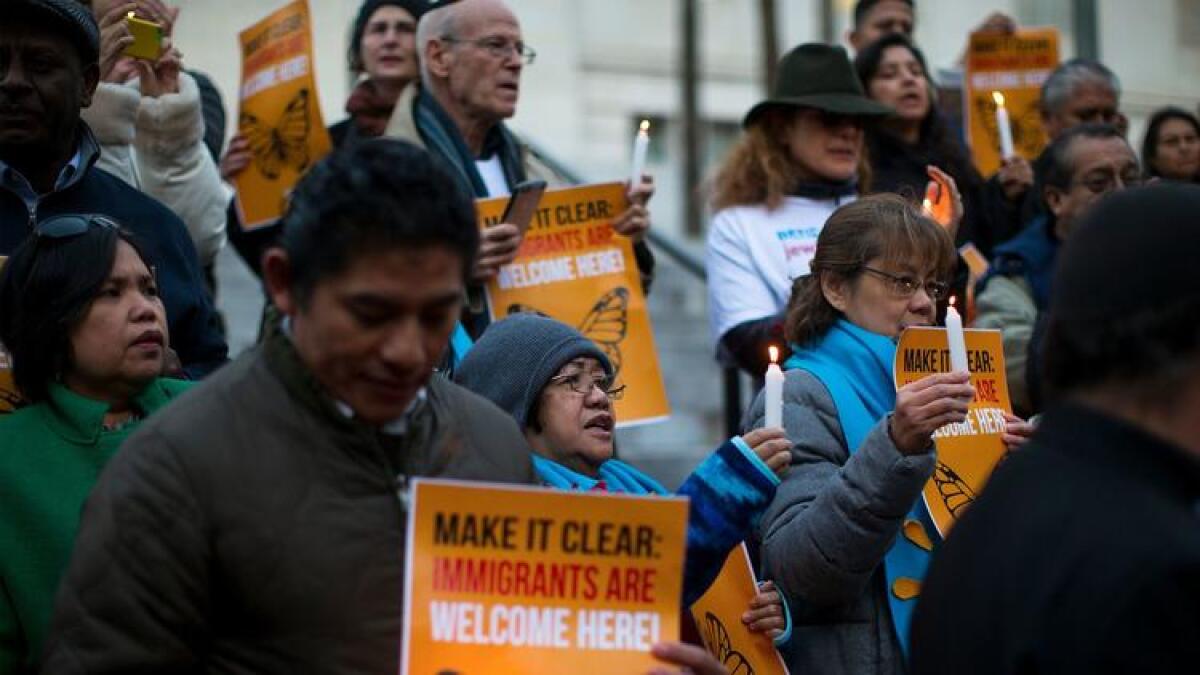
President Trump wasted no time inviting a showdown with California and other liberal states with his threat this week against so-called sanctuary cities, setting off a frenzy of resistance that will test the president’s power to carry out his vision to deport millions of people here illegally.
An executive order Trump issued Wednesday, putting cities and counties on notice that they would lose federal funding if they didn’t start cooperating with immigration agents, has broad implications for California, a state that aggressively protects its undocumented population from deportation.
But while the order allowed Trump to boast that he is fulfilling a campaign pledge, it also commits him to a fight that he is not necessarily poised to win.
The cities and counties Trump is targeting have many tools to strike back. Among the most potent are Supreme Court decisions that have interpreted financial threats such as the one Trump is now making as an unlawful intrusion on state’s rights.
In California, elected officials are skeptical about how aggressively Trump’s vague executive order can be enforced. San Francisco has determined that the order is worded in such a way that it doesn’t even apply in the city, and other cities will probably argue the same.
- Share via
Thomas Hardiman, under consideration for Supreme Court, is a champion of gun rights
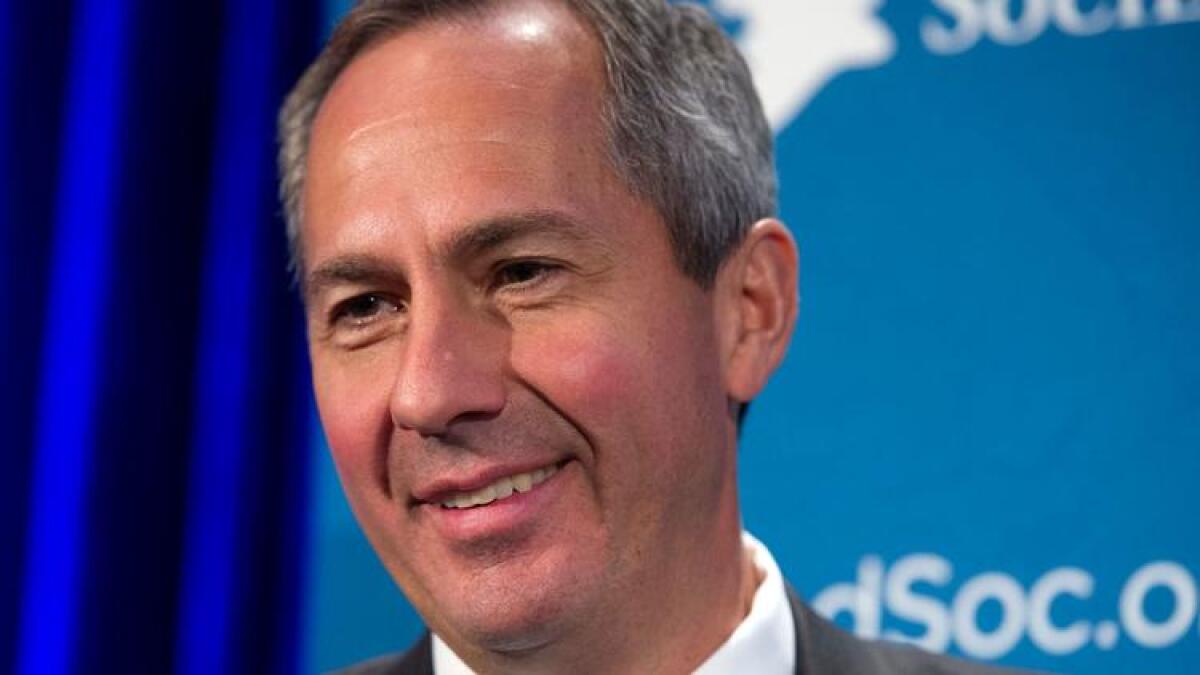
Judge Thomas M. Hardiman, one of three leading contenders to be named by President Trump to the Supreme Court, is a conservative jurist from Pittsburgh with a personal story not unlike many of the blue-collar voters who catapulted Trump to the White House.
The son of a cab driver and the product of public schools in Waltham, Mass., Hardiman, 51, put himself through Georgetown Law School by driving a taxi.
- Share via
Analysis: Abortion opponents embrace President Trump and their increased odds of success
Antiabortion activists meet Friday for their 44th annual march in Washington with reason for optimism: Republican control of Capitol Hill and a newly inaugurated president who appears intent on proving his later-in-life embrace of their cause.
In his first week, President Trump has moved already to limit abortion. On Monday, he reinstated a ban on funding of international organizations that provide abortion services or related counseling, reversing President Obama’s action eight years earlier. Next Thursday, he is due to announce his replacement for Supreme Court Justice Antonin Scalia; he has said he will pick only a candidate opposed to abortion.
Vice President Mike Pence entertained march organizers Thursday night in his ceremonial office adjacent to the White House. On Friday, he will be the highest-ranking elected official to speak at the march.
Members of Congress, meantime, are pushing several abortion-limiting measures that were blocked during the Obama years.
“I’m very optimistic that things are going to go well for the pro-life movement and unborn children,” said Carol Tobias, president of the National Right to Life Committee. “I think this has been a fantastic first week for the administration.”
As with many other issues, Trump’s election upended expectations, turning what would have been another term in the wilderness under Hillary Clinton into a new opportunity.
- Share via
Republicans divided over whether millions of Americans should lose government-subsidized health coverage
Quizzed about the fate of millions of Americans who depend on the Affordable Care Act and its insurance protections, President Trump invariably offers bold but vague assurances.
“I want to take care of everybody,” he said in an interview with ABC News this week, a pledge GOP lawmakers and Trump’s nominee for Health secretary have echoed in recent weeks.
But as Republicans scramble for a strategy to repeal and replace the healthcare law, they are reckoning with a fundamental question the party has never settled: whether to foot the multitrillion-dollar bill to ensure millions of Americans retain the coverage they obtained under Obamacare.
GOP lawmakers for years ducked that issue as they unified behind cries to roll back the program, with the assurance that President Obama would block them. Now, the power to actually repeal and replace the law is exposing deep divisions in the party.
On one side, fiscal conservatives, many of whom never wanted to expand government-subsidized health coverage in the first place, insist Congress must dramatically cut healthcare spending. This wing of the party is concentrated in the House.
On the other side, some GOP governors and senators argue that Republicans must protect coverage for vulnerable Americans. Many are worried about a political backlash if millions of Americans lose health insurance.
“It’s going to get really ugly on the Republican side,” predicted one former GOP congressional aide who asked not to be identified discussing tensions within his party.
- Share via
Trump welcomes British prime minister as the countries’ ‘special relationship’ faces tests
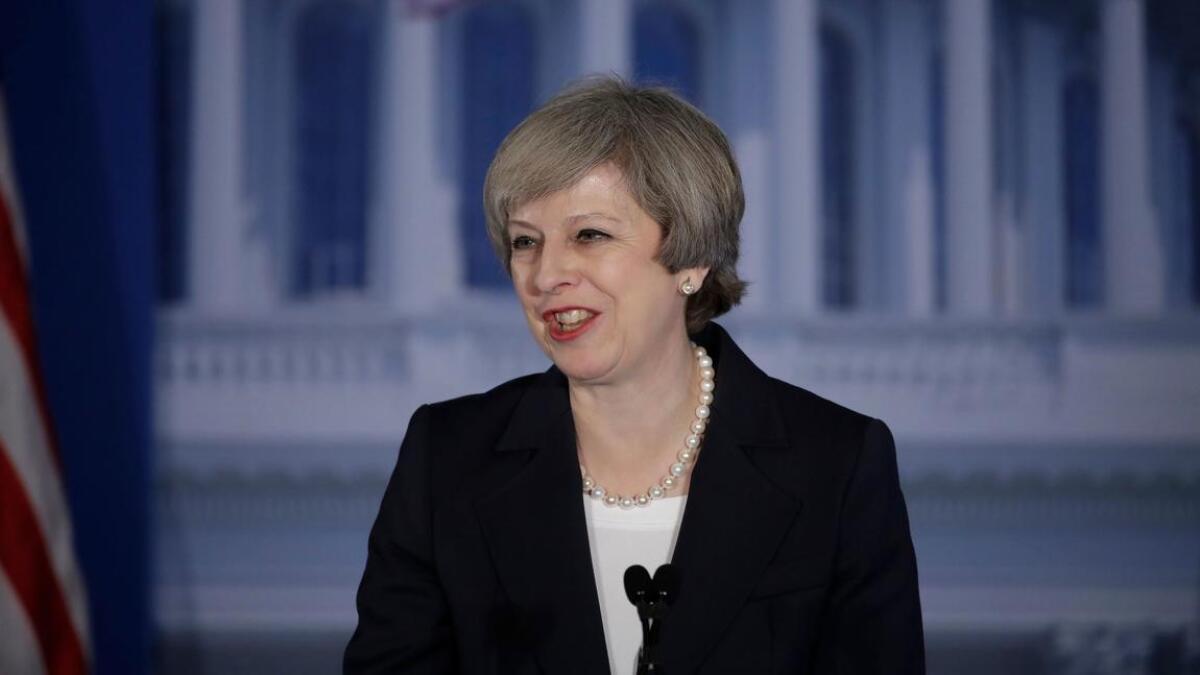
Like many U.S. and British leaders before them, President Trump and Prime Minister Theresa May will pay tribute Friday to the enduring “special relationship” between the two nations.
And in welcoming May, herself in office less than a year, scarcely a week into his presidency, Trump also aims to underscore the power of the anti-globalization movements that propelled both of them on a course that is markedly different from their predecessors.
May rose to power last summer after Brits voted to leave the European Union in a referendum that Trump touted as a precursor to his own victory, both prompted by nationalist fervor.
Having declared a new policy of “America first” in his inauguration, Trump’s focus Friday will be on the potential benefits of increased bilateral trade with Britain.
- Share via
Dispute over wall plunges border relations into crisis as Mexican president scraps White House visit
One of the United States’ most important strategic relationships plunged to a new low Thursday when an escalating dispute over a proposed wall on the U.S.-Mexico border prompted Mexican President Enrique Peña Nieto to cancel a planned visit to the White House.
President Trump has been in office barely a week, but his increasingly bitter feud with Mexico over who would pay for the new wall has left Mexican officials furious and now threatens to ignite a trade war between the two crucial allies.
- Share via
Miami-Dade County mayor heeds Trump’s call, effectively ending ‘sanctuary’ status
At least one leader of a liberal-leaning municipality is ready to comply with President Trump’s new immigration mandates.
Miami-Dade County Mayor Carlos Gimenez ordered county jails on Thursday to immediately comply with federal immigration detention requests. Since 2013, Miami-Dade had refused to continue to detain inmates simply because they were in the country illegally and wanted by Immigration and Customs Enforcement agents. The reason, argued county officials, is because the federal government does not fully reimburse the county for the expenses.
On Wednesday, Trump signed an executive order that designates so-called sanctuary cities -- municipalities that defy federal immigration laws to protect individuals in the country illegally -- as “ineligible to receive federal grants” should they continue to ignore immigration laws.
“I want to make sure we don’t put in jeopardy the millions of funds we get from the federal government for a $52,000 issue,” Gimenez, a Republican who voted for Hillary Clinton, said in an interview with the Miami Herald. “It doesn’t mean that we’re going to be arresting more people. It doesn’t mean that we’re going to be enforcing any immigration laws.”
The announcement from Gimenez drew praise from Trump.
“Miami-Dade Mayor drops sanctuary policy. Right decision. Strong,” the president tweeted Thursday night.
In several sanctuary cities, from Boston to Los Angeles, local leaders have vowed to fight Trump’s executive orders.
Los Angeles Mayor Eric Garcetti told reporters Wednesday that he doesn’t believe the federal government can stop funding Los Angeles, citing the 10th Amendment, which addresses the powers of state and federal governments.
In 2017, the city is set to receive about $500 million from the federal government to pay for, among other things, port security and anti-gang programs. Trump’s executive order does not specify which funds would be targeted.
During his campaign, Trump repeatedly promised to strip federal funds from sanctuary cities.
In addition to speeding up the deportation of convicts, the orders Trump signed this week also call for quick removal of people in the country illegally who are charged with crimes and waiting for adjudication as well as those who have not been charged but are believed to have committed “acts that constitute a chargeable criminal offense.”
“We are going to get them out, and we’re going to get them out fast,” Trump said Wednesday while speaking before employees at the Department of Homeland Security.
- Share via
U.S. considering 20% tax on imports to pay for border wall, White House says
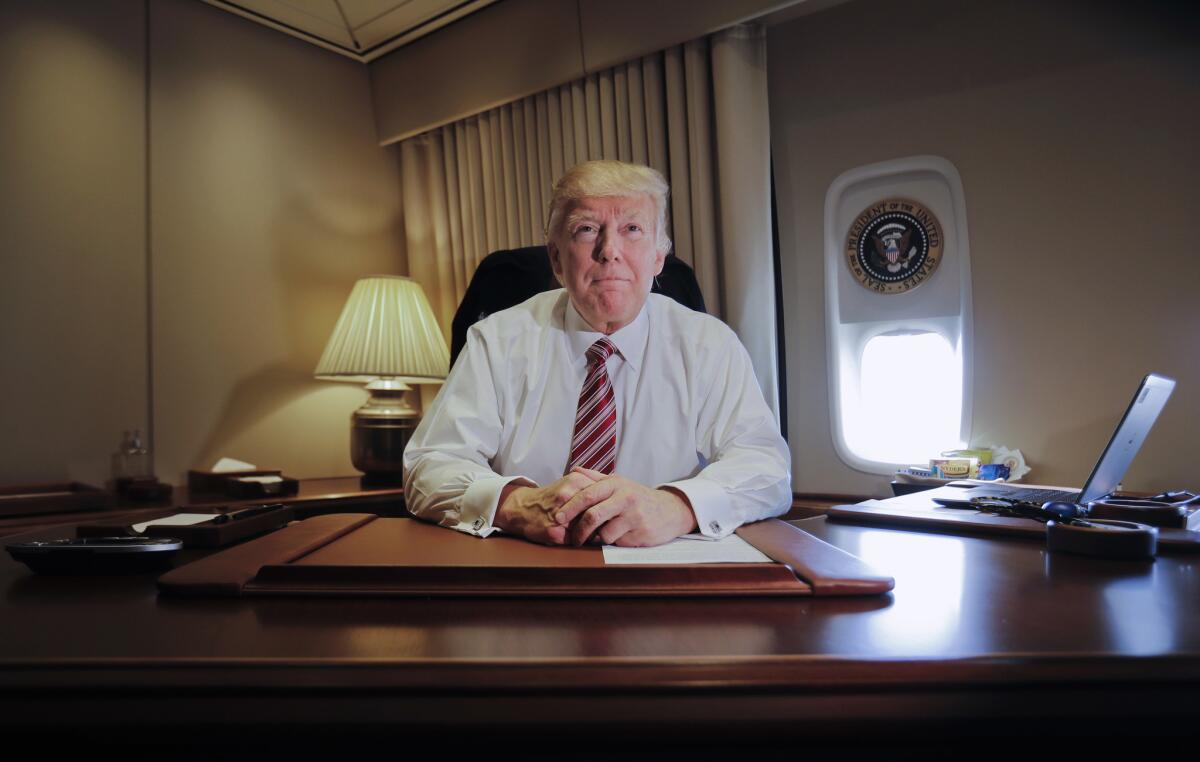
The Trump administration said Thursday that it would seek to impose a tax on imports, at least from countries with which the U.S. runs a trade deficit, as a way to pay for the wall on the border with Mexico that is one of President Trump’s central campaign promises.
Although Trump repeatedly has said that Mexico would pay for the wall, the tax that White House Press Secretary Sean Spicer described to reporters actually would fall on U.S. consumers, not on Mexicans.
“Right now, our country’s policy is to tax exports and let imports flow freely in, which is ridiculous,” Spicer told reporters traveling with Trump back to Washington after a speech in Philadelphia.
By reversing that and taxing imports, “we can do $10 billion a year, and easily pay for the wall just through that mechanism alone. That’s really going to provide the funding,” Spicer said.
Although Spicer did not refer to the tax by name, his description of it seemed to make clear that he was referring to a complicated portion of the tax reform plan proposed by House Republicans. That was confirmed by House GOP officials, including Speaker Paul Ryan’s communications director, Brendan Buck.
The provision, known as a destination-based cash flow tax, essentially would function as a national sales tax on imported goods and services. It’s a key part of the GOP tax plan, but one that Trump has previously criticized as too complicated. As part of the plan, the House GOP would also lower the corporate tax rate to 20% from its current maximum level of 35%.
Such a tax would likely increase prices on some staples for American consumers, such as tomatoes and avocados, once U.S. retailers pass along the tax to consumers. Mexico is the second-largest supplier of agricultural imports to the U.S.
The price increase for consumers would be at least partially offset by an increased valuation in the dollar, experts have said.
Trump alluded to the plan earlier in remarks to House and Senate Republicans in Philadelphia.
“We’re working on a tax reform bill that will reduce our trade deficits, increase American exports and will generate revenue from Mexico that will pay for the wall, if we decide to go that route,” Trump said.
The U.S. imported $316.4 billion in goods and services from Mexico in 2015, while exporting $267.2 billion, according to the office of the U.S. Trade Representative. Mexico is the United States’ third-largest supplier of imports — chiefly vehicles, electrical machinery and mineral fuels.
- Share via
Trump says meeting with Mexican president would have been ‘fruitless’
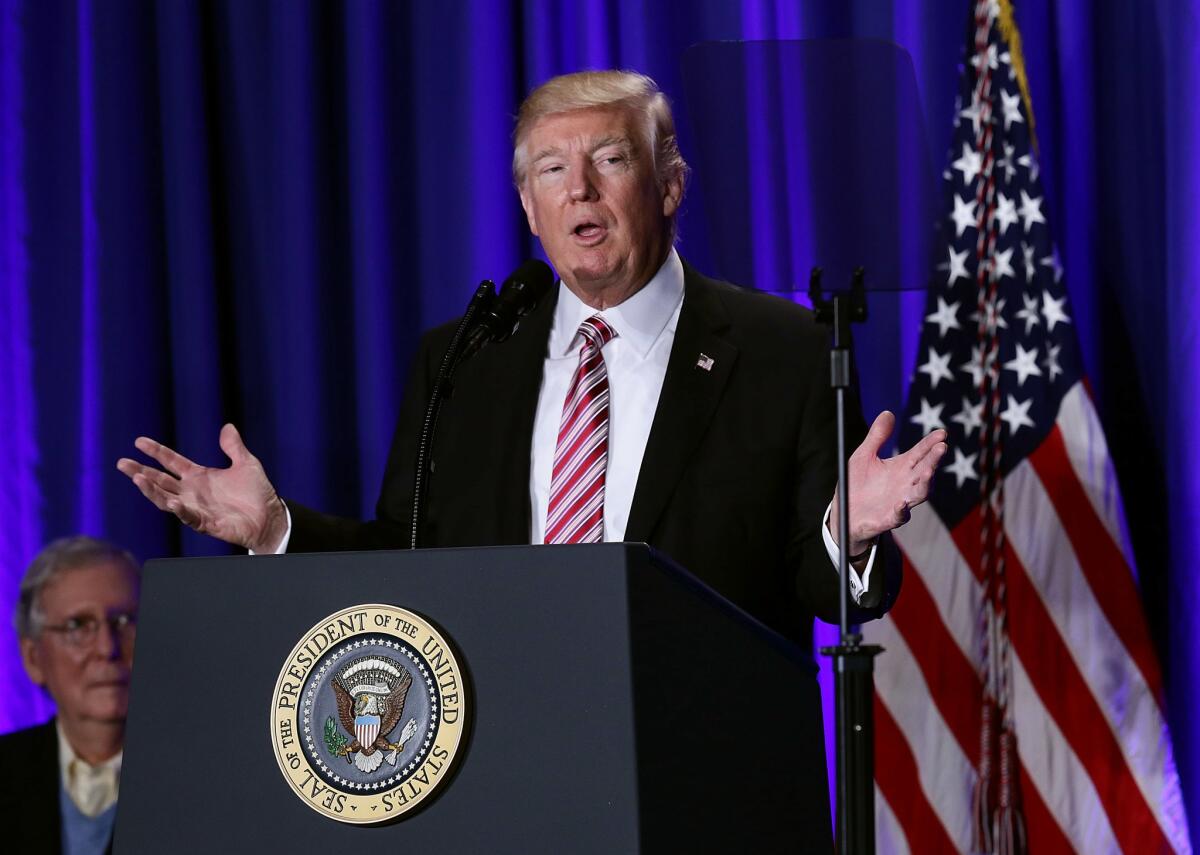
President Trump cast the cancellation of a meeting with Mexican President Enrique Peña Nieto as a mutual decision Thursday, saying the summit would have been “fruitless” unless Mexico demonstrated it would “treat the United States fairly” and “with respect.”
The scheduled summit had been billed as a chance for Trump and Peña Nieto to start discussions on the North American Free Trade Agreement and immigration, both Trump priorities. But it was Trump’s continued insistence that Mexico reimburse the U.S. for construction of a new border wall that prompted Peña Nieto to skip the visit.
Trump said that he and Peña Nieto had agreed to cancel the meeting, but Peña Nieto tweeted that Mexican officials had informed the White House that he would not be attending.
“Unless Mexico is going to treat the United States fairly, with respect, such a meeting would be fruitless,” Trump said. “And I want to go a different route.”
Speaking in Philadelphia to congressional Republicans, Trump called border security a “serious, serious national issue.”
“The American people will not pay for the wall,” he said. “It is time that the American people had a president fighting as hard for its citizens as other countries do for theirs. And that is exactly what I’m going to do for you.”
Trump said he also wouldn’t allow taxpayers to lose money because of the “defective transaction” that NAFTA represented.
Without Mexico’s agreement to pay for construction of the wall, Trump signaled one possible way to generate revenue without its cooperation: tax legislation that would reduce the trade deficit and increase American exports.
That would be part of a larger legislative agenda that Trump said could make this Republican-led Congress the busiest in decades, or “maybe ever.” After summarizing executive actions he’s taken already, Trump pointed to other priorities he would seek to move through Congress, starting with the repeal of the Affordable Care Act.
He also called for a major infrastructure plan that would focus on fixing existing roads, bridges and airports before building new ones.
And he telegraphed action he was expected to take later Thursday, ordering an investigation into allegations of voter fraud that he has called a major issue, despite studies showing otherwise.
“We are going to protect the integrity of the ballot box. and we are going to defend the votes of the American citizens,” he said.
Trump, an unconventional Republican, urged his party to embrace its heritage as “the party of American industry and the American worker.”
“Think of everything we can achieve. And remember who we must achieve it for,” he said. “We’re here now because tens of millions of Americans have placed their hopes in us to transfer power from Washington, D.C., and give it back to the people. Now we have to deliver.”
- Share via
Border Patrol chief is abruptly out after being brought in as a reformer
The chief of the Border Patrol will leave his post at the end of the month, likely the result of a change in direction by the Trump administration and a reflection of the new power of the agency’s union.
Mark Morgan, the agency’s head, was hired from the FBI in June to reform the force after a series of corruption allegations and problems with excessive force. He will leave the Border Patrol abruptly after seven months on the job, according to a person familiar with the decision who spoke on the condition of anonymity.
Morgan’s departure was first reported by the Associated Press.
Morgan spent 20 years at the FBI and was first brought to Customs and Border Protection, the Border Patrol’s parent agency, in 2014 to overhaul its internal affairs division. After a subsequent stint running the FBI’s training academy, he started the top job at the Border Patrol in June.
The Border Patrol’s union had opposed Morgan’s appointment, preferring a candidate who had risen through the ranks of the agency.
The union endorsed President Trump in the election, breaking with its practice of remaining neutral in elections.
News of Morgan’s departure comes a day after Trump announced he would build a border wall and hire 5,000 more Border Patrol agents, bringing the total force to 26,000. Trump said the Border Patrol union would have a lot of clout in department decisions.
- Share via
Trump will order a voter fraud investigation today, White House says
President Trump will sign an executive order Thursday detailing the nature of the investigation he has promised into his claim of widespread voter fraud, the White House said.
Trump was still working with senior advisors on the details of the order, which would address potential voter fraud and faulty registration, Press Secretary Sean Spicer told reporters.
In an interview with ABC News on Wednesday, Trump once again said, without offering evidence, that “millions of votes” were cast illegally in the election, including ballots cast in the name of dead voters, by noncitizens and by individuals registered in multiple states.
“There are millions of votes, in my opinion,” he said, citing a Pew report as evidence when challenged.
The report’s author recently reiterated its conclusion that voter rolls are susceptible to fraud but not that any widespread fraud has occurred.
Trump also said he wasn’t concerned that he was undermining a core tenet of American government by raising doubts about the credibility of elections.
“Millions of people agree with me,” he said.
Trump will sign the order in Washington after a trip to Philadelphia to speak with House and Senate Republicans, the White House said.
GOP lawmakers have been circumspect about whether they believe an investigation is necessary.
“If the administration decides to pursue some sort of investigation on that, we will certainly cooperate in any way that they ask for,” Sen. John Thune (R-S.D.), chairman of the Senate Republican conference, told reporters at the retreat.
“But all I can tell you is this — we had an election, it was a decisive outcome. We have a new president, a new Congress and I view the election as history and we’re ready to roll up our sleeves and go to work for the American people.”
Advocates have expressed concern that the investigation will be used as a way to limit voters’ ability to cast ballots.
- Share via
Mexican president cancels White House visit
Mexican president Enrique Peña Nieto has canceled his planned meeting with U.S. President Trump over disagreements over who would pay for construction of a border wall.
In a tweet, Peña Nieto said his government informed the White House on Thursday morning that the meeting in Washington, planned for next Tuesday, is off.
The Mexican president’s announcement comes after President Trump warned him on Twitter early Thursday morning to stay home and skip the meeting unless Mexico is willing to fund construction of a wall.
- Share via
Speaker Paul Ryan promises funds for Trump’s border wall; can’t guarantee it won’t add to deficit
Congress expects to quickly approve money for President Trump’s border wall with Mexico this year, but House Speaker Paul D. Ryan (R-Wis.) could not guarantee Thursday that Republicans won’t add to the budget deficit to pay for it.
Ryan said the White House would submit the funding request “very shortly” and he promised that the GOP-led Congress would process it “before the end of the current fiscal year,” which is Sept. 30. He estimated the cost at $12 billion to $15 billion, but others have put it higher.
“We have ambitious goals and ambitious timelines,” Ryan said.
But that to-do list continues to become complicated by the evolving relationship between the president and his Republican team in Congress.
Trump is expected to address congressional Republicans later Thursday during their annual agenda-setting retreat amid street protests and heightened security in downtown Philadelphia.
Asked specifically if Republicans, who have the majority in the House and Senate, could commit to fulfilling their legislative goals without adding to the deficit this year, Ryan demurred.
He also declined to say whether the costs of the border wall with Mexico would be offset with spending cuts elsewhere, as is traditionally the GOP model -- for example, they wanted emergency funding in the aftermath of Superstorm Sandy to be paid for with reductions elsewhere.
“We’ll wait and see,” Ryan said.
Several hundred protesters sang and danced in the streets into the night Wednesday, with more expected Thursday at the host hotel. Lawmakers were being given security escorts to cross city streets.
- Share via
Mexican president says he might skip his visit, so now Trump says he may not be invited anyway
What to do when a guest says he is feeling insulted and may not come to your house? If you’re President Trump, you begin spreading the word that he might not be invited after all.
That was Trump’s reaction on Twitter this morning to news out of Mexico, where President Enrique Peña Nieto is facing pressure to skip next week’s meeting at the White House.
“If Mexico is unwilling to pay for the badly needed wall,” Trump tweeted Thursday morning, “then it would be better to cancel the upcoming meeting.”
The tweets were in stark contrast to Trump’s rhetoric Wednesday. While announcing an executive order to begin construction on a border wall that is deeply unpopular in Mexico, Trump insisted that it would be mutually beneficial.
“I have deep admiration for the people of Mexico and I greatly look forward to meeting again with the president of Mexico,” he said
Trump campaigned on the wall and the promise that Mexico would pay for it, which the Mexican government has called a non-starter and deeply insulting.
- Share via
Thousands in New York protest possible new limits on immigration
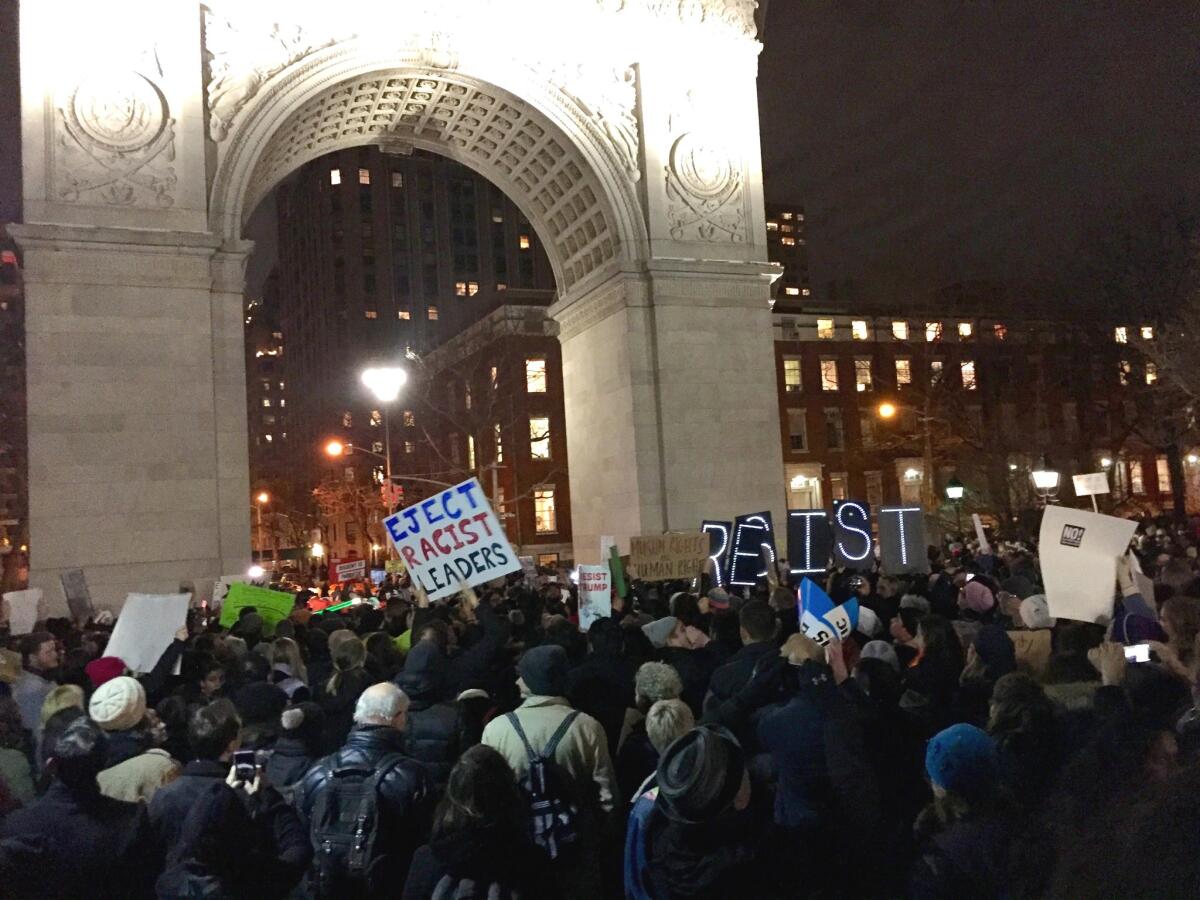
With President Trump mulling an executive order to restrict Muslim immigration, the resistance has begun. A hastily organized demonstration drew thousands of New Yorkers on Wednesday night to Washington Square Park, where they vowed to fight back.
Mayor Bill de Blasio also called an emergency news conference promising to protect immigrants and to challenge threatened moves by Trump to strip funding from cities that provide sanctuary.
“We’re going to defend all of our people, regardless of where they come from and regardless of their documentation status,” the mayor said.
The demonstration drew native New Yorkers and immigrants alike, holding banners and candles.
“The children are scared. They don’t know what is to become of them and their families,’’ said Melissa Farran, a 42, a kindergarten teacher at PS 261 in Brooklyn. The school has a large population of students from Yemen, one of the countries that could be placed on a watch list.
“I demonstrate against extremists wherever they are, in Iran or in the United States,’’ said Saeed Vasebi, 28, an Iranian PhD student researching renewable energy in the U.S. He noted that when he lived in Tehran, he had demonstrated against former Iranian President Mahmoud Ahmadinejad. “Now I march against Trump.”
Iranian visas would be limited by a draft policy under consideration, and Vasebi said he will likely be unable to go home this summer to visit his fianceé, for fear of being unable to return.
- Share via
What we learned from Trump’s first prime-time interview
President Trump is still soaking up the office — its challenges, its potential and the scrutiny. But what was also clear from his first prime-time television interview is how little has changed since he was sworn in just five days ago. Here’s some what of was revealed in Trump’s conversation Wednesday with ABC News’ David Muir.
He’s still miffed about coverage of inaugural crowds.
“We had the biggest audience in the history of inaugural speeches,” he said. “I won’t allow you or other people like you to demean that crowd and to demean the people that came to Washington, D.C., from faraway places because they like me.” Later, Trump referred to the gathering on the National Mall as a “sea of love.”
He also rejected criticism of his remarks to the CIA on Saturday. “That speech was a home run,” he said. “We see what Fox said. They said it was one of the great speeches.”
There’s no convincing him voter fraud isn’t a major issue.
One exchange was instructive, when Muir challenged him for evidence of his incorrect claim that as many as 5-million people voted illegally in the election. Trump cited a Pew study, but Muir said the author told him he found no evidence of fraud.
“Really?” Trump shot back. “Then why did he write the report?”
Trump also insisted, without evidence, that any illegal votes were cast only by Democrats. “None of ‘em came to me.” Yet of the four or so known cases of voter fraud in the election, at least one was a woman’s attempt to vote twice for Trump.
Potential world reaction won’t discourage him from national security actions.
Asked about an executive action expected this week to implement the kind of “extreme vetting” he promised during the campaign, Trump rejected Muir’s suggestion that it could further inflame the Muslim world. “There’s plenty of anger right now. How can you have more?” Trump asked back. “The world is a mess. The world is as angry as it gets. What? You think this is gonna cause a little more anger?”
His healthcare plan is short on details, big on promises.
When Muir asked how Trump could deliver on a pledge to provide “insurance for everybody,” the president’s answer was more a statement of political tactics than a detailed plan. He said that in conversations with Republicans about an alternative to Obamacare, he suggested the easiest thing would be to “let it explode.” “But the right thing to do is to get something done now. So I wanna make sure that nobody’s dying on the streets when I’m president. Nobody’s gonna be dying on the streets. We will unleash something that’s gonna be terrific.”
He appeared to consider resurrecting the use of secret overseas prisons to hold terrorism suspects, despite an aide’s claims that a draft memo suggesting it wasn’t from the White House.
In the interview, recorded Wednesday morning, Muir asked Trump about reports he would lift a ban on the practice. “I’ll be talking about that in about two hours,” he said. But his public remarks
later in the day made no mention of such a tactic.
White House Press Secretary Sean Spicer had insisted that the document, which was detailed in news reports, was not one that had been given consideration.
Trump also said he would consider bringing back waterboarding. “I wanna do everything within the bounds of what you’re allowed to do legally. But do I feel it works? Absolutely I feel it works.”
Waterboarding and other so-called enhanced interrogation techniques were outlawed by Congress in 2015.
His relationship with President Obama has come a long way.
In the Oval Office, Trump held up a long letter that Obama left for him. “So well-written, so thoughtful,” he said. “I called him and thanked him for the thought that was put in it.”
- Share via
Mexican president rejects Trump’s border wall -- and says he won’t pay for it
Mexican President Enrique Peña Nieto said he rejects and condemns U.S. President Trump’s plan to immediately begin construction of a wall along the U.S.-Mexico border.
In a televised address Wednesday night, Peña Nieto said Mexico “does not believe in walls.” His voice rising, Peña Nieto repeated his promise that Mexico “will not pay” for construction of a border barrier.
Peña Nieto is facing considerable pressure from other Mexican leaders to boycott a planned meeting with Trump in Washington next week.
On Wednesday, Trump directed the Department of Homeland Security to begin building a wall along stretches of the southern border where a barrier does not already exist.
In what political analysts and many Mexicans viewed as a stinging insult, the order came the same day that Mexico’s foreign secretary, Luis Videgaray, arrived in Washington for talks with White House officials on trade and other issues ahead of Peña Nieto’s planned visit.
In his address, Peña Nieto didn’t say whether he planned to attend the meeting, saying he would make that decision after consulting with Videgaray and the delegation of officials currently in Washington.
Peña Nieto, who has repeatedly called for dialogue with Trump, left a door open for attending the meeting, saying he feels a “responsibility to defend and take care of the interests of Mexico and Mexicans.”
“It is my duty to address the problems and to face the challenges,” he said.
Dozens of Mexican leaders have called on Peña Nieto to cancel his trip, saying Trump’s bold actions on the border wall prove he is not interested in dialogue.
Ricardo Anaya, president of the opposition National Action Party, or PAN, said the timing of Trump’s announcement just before Peña Nieto’s visit to the U.S. “is an insult.”
“There are no conditions for a meeting with Trump,” he said.
- Share via
Protest scene outside congressional GOP retreat in Philadelphia